T he W in T er M arine S a le

FEBRUARY 28-MARCH 1, 2023




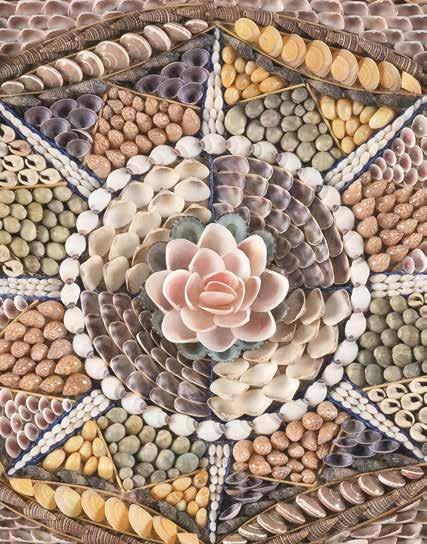


FEBRUARY 28-MARCH 1, 2023






Tuesday, February 28 and Wednesday, March 1, 2023
Both sessions starting at 9:30 a.m. Eastern
Location:
Headquarters: 1483 Route 6A, East Dennis, Mass. I 508-385-3116 I info@eldreds.com
Preview:
Monday, February 27, from 10 a.m. to 4:30 p.m., the sale days starting at 8:45 a.m., and by appointment
View
Bidding Options
In-person, online, phone and absentee bidding available. To register for absentee and telephone bidding, please visit our website or call 508-385-3116. Online bidding available through www.eldreds.com.
Terms
A buyer’s premium will be added to the hammer price of all purchases. The buyer’s premium is 25 percent of the final bid price up to and including $500,000, and 10 percent of the final bid price over $500,000.
We accept checks, cash, money orders, wire transfers and major credit cards for payment. Credit cards can only be used for up to $5,000 of the invoice total and the card must have a U.S. billing address.
Bidders holding a Massachusetts or out-of-state resale number must provide the certificate or copy thereof when registering to bid or otherwise will be required to pay 6.25% Massachusetts sales tax on purchases. Items picked up in or shipped to Connecticut are subject to 6.35% Connecticut sales tax. Residents of other states may be subject to state and local sales taxes.
Condition Reports
Prospective bidders should satisfy themselves by personal inspection as to the condition of each lot. It is the bidder’s responsibility to obtain a condition report, by either visiting our website or contacting us. Although condition reports may be given on request, such reports are statements of opinion only. The absence of a condition report does not imply the property is in good condition. Regardless of whether or not a condition report is given, all property is sold subject to Item 1 of our Conditions of Sale, which provides that all property is sold as is.
All dimensions are approximate.
Items made with marine mammal or other animal parts will not be shipped internationally, and some are not eligible to be shipped outside of state. Please be aware of your own local laws and regulations and bid accordingly.
Joshua F. Eldred CEO and President
Head of American and European Paintings jeldred@eldreds.com
Mary Ann Giddings Eldred Chairwoman of the Board maeldred@eldreds.com
William Bourne
Vice President
Head of Americana and Maritime Arts bill@eldreds.com
Eric S. Mulak Vice President
Head of Sporting Antiques, Folk Art & Collectibles Consignment Manager eric@eldreds.com
Christine Berlane Prints and Multiples cberlane@eldreds.com
Steve Dunaway Jewelry, GIA certified jewelry@eldreds.com
Duncan H. Gray Head of General Merchandise dgray@eldreds.com
Glen Krawczyk
Head of Oriental Rugs glen@eldreds.com
Anne G. Lajoie Head of Asian Arts annie@eldreds.com
Gregg Dietrich Senior Consultant and Specialist
Jennifer Lacker Mystic Representative
Mary M. Kuhrtz and Christine Leofanti Gallery Assistants
Al Gray, Jim Moynihan and Steven Martins Shipping and Inventory Associates
Mara Alvarado Assistant Photographer malvarado@eldreds.com
Katie Callaghan Auction Coordinator Assistant kcallaghan@eldreds.com
Wendy A. Dunford Treasurer wendy@eldreds.com
Susan Eastman Client Services seastman@eldreds.com
Devyn Henry Administrative Assistant dhenry@eldreds.com
Beth McGoldrick Administrative Assistant bmcgoldrick@eldreds.com
Angela R. McParland Executive Assistant amcparland@eldreds.com
Madison Morris Head of Photography mmorris@eldreds.com
Kathleen Morse Auction Coordinator kmorse@eldreds.com
Megan Nichols Shipping Coordinator mnichols@eldreds.com
Cathelyn Scibelli Gallery and Office Assistant kscibelli@eldreds.com
Cheryl Stewart Head of Marketing, Catalog Layout and Design cheryl@eldreds.com
Sarah Eldred Taylor Vice President of Human Resources sarah@eldreds.com
I don’t know about you, but I feel that life after the pandemic has not gotten back to "normal" -- it has simply gotten faster and more complicated. Perhaps it's because I have two active sons who occupy my time out of the office, and because Eldred’s has steadily grown over the last decade, but I think it’s more than that. The social distancing and remote workplace needs of COVID accelerated our reliance on technology, whether we were ready for them or not. And while these remarkable technical advances are intended to make life easier, many have had the opposite effect, causing undue stress and inefficiency.
While the world will probably never revert to simpler times, with fewer screens and fewer passwords, here at Eldred’s we vow to still provide old-fashioned service coupled with the advantages the best technology offers. We will never lose sight of the human touch and personal relationships that power our industry, and, as long as I am in charge, someone will always be here to answer the phone in person and provide whatever help you need, whether it is with bidding, consigning or shipping, or you just wanted to say hi to a friendly voice.
As I drive around Cape Cod ferrying my boys to school and practice, I think about this new world we live in and how it contrasts to that of the 18th and 19th Century lives of the sailors and whalers that we celebrate in our Marine Sales. Sure, they saw technological advances in the form of better navigational instruments and the transition from sail to mechanical propulsion, but through it all the crew remained the common and most important thread. Every soul on board a ship had to work in perfect concert with the others, not only to complete their tasks but often just to survive. Technology played a role, but when it failed, they would revert to the old ways of navigating by the stars or hoisting a sail in order to find the comforts of home. I am sure our earlier counterparts found this arduous, but there is an undeniable romance about it to the contemporary.

As you review the offerings in the catalog, I hope to find some brief respite from the complexities of modern life and can transport yourself back to a time when personal relationships drove life and were not a luxury. And know that we will be here to answer the phone and greet you in person at the exhibit and sale. Please come some say hello. We just completed our 75th year of auctions and are ready for the next 75. Stay tuned from some exciting news as we continue to grow, we just might be coming closer to you!
Joshua Eldred President January 2023PROPERTY FROM
The Collection of Chuck and Jan DeLuca
The Collection of Michael Gill
The Kelton Collection of Marine Art & Artifacts
A Distinguished Beacon Hill, Boston Collection
The Stephen D. Weinroth Collection
A New Jersey Estate
A New England Institution
And Numerous Other Estates and Collections
Index of Artists
Page 6-7
Session I
Lots 4001-4298
Session II
Page 4501-4837
Bidder Information
Page 250
Conditions of Sale
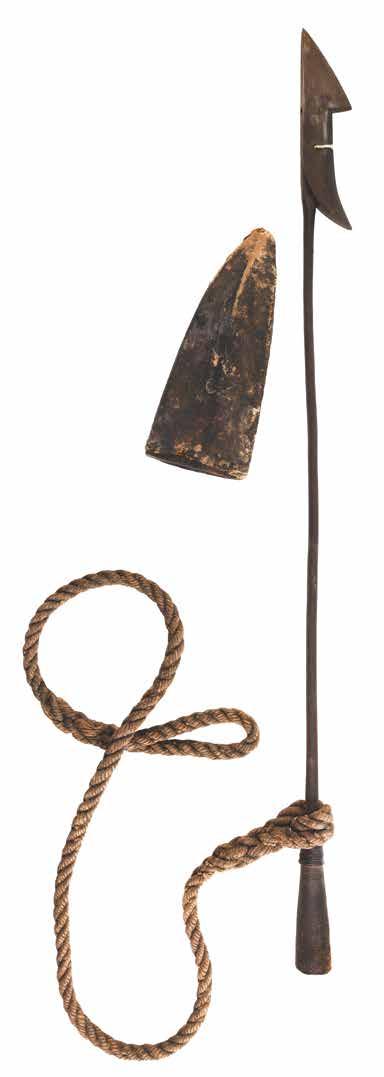
Page 251
Absentee and Phone Bid Form
Page 253
List of Illustrations
Page 256
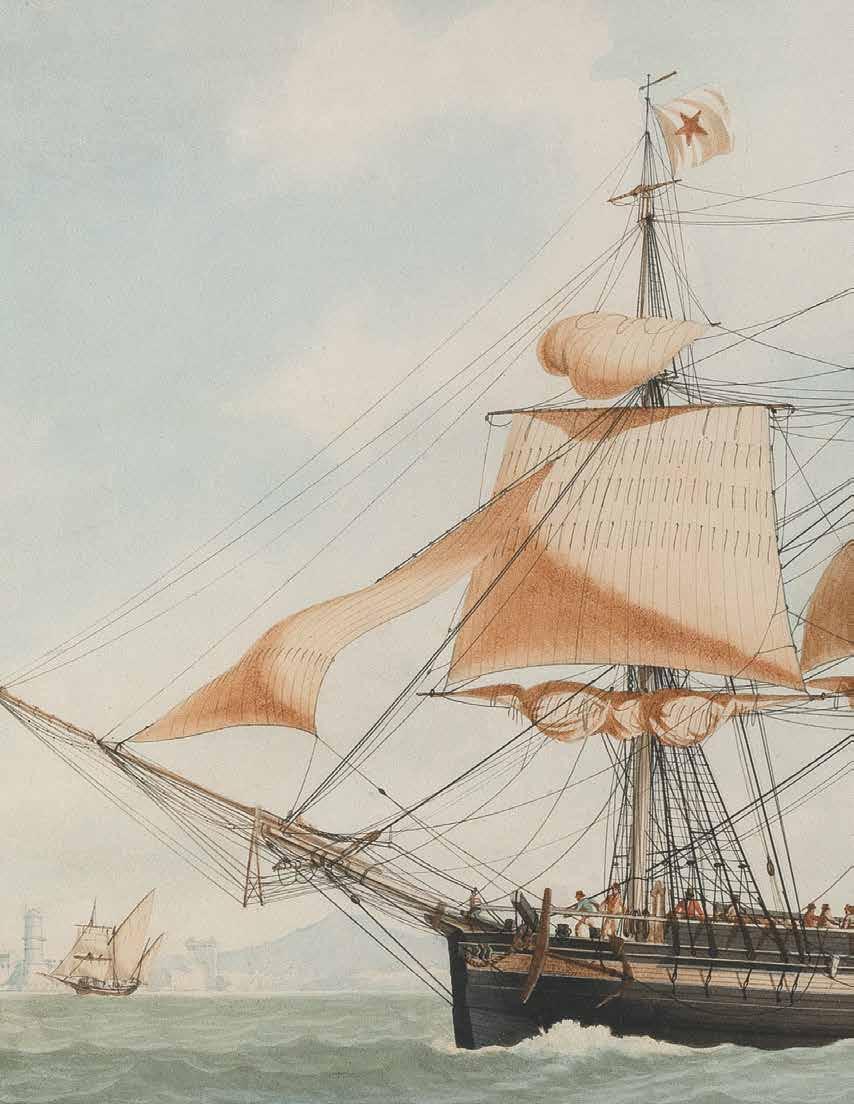
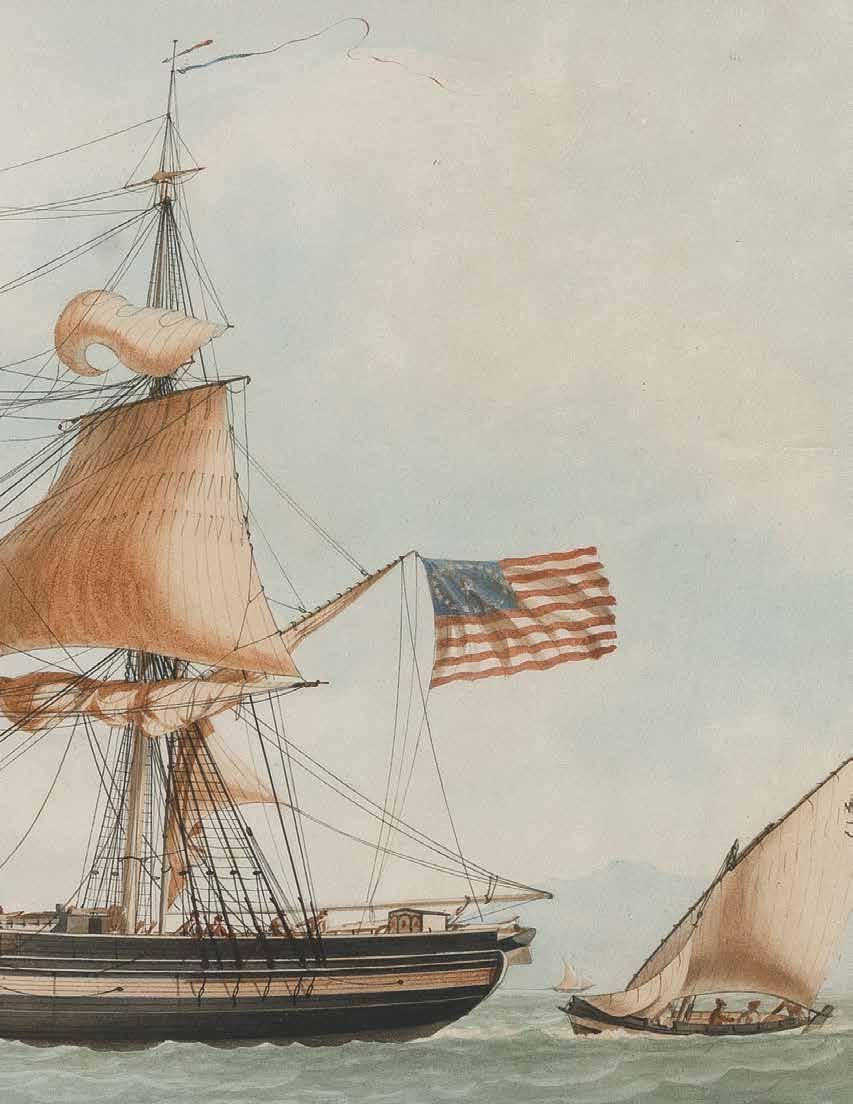
Tuesday, February 28
9:30 A.M.
Scrimshaw

Irons and Implements
Whaling
The Collection of Chuck and Jan DeLuca
The Collection of Michael Gill
1,800/2,500
Provenance: Barbara Johnson Whaling Collection (retains collection sticker), Sotheby’s New York, December 16-17, 1983, Lot
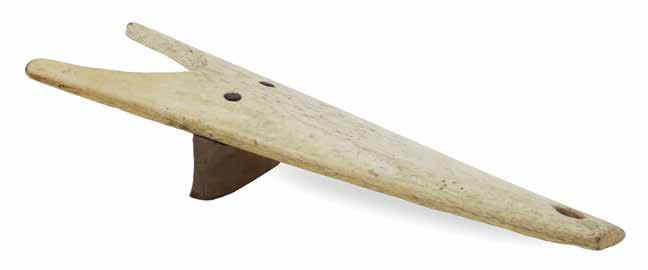

Whale ivory ends with acorn-form knob handles. Walnut roller. Inscribed “20-216” in blue ink on roller, probably a collection number. Length 18.5”. 500/800
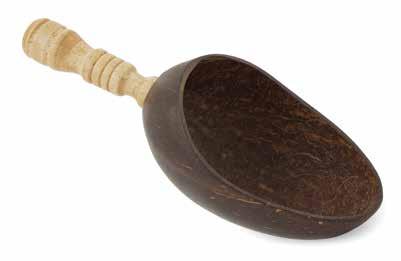
Turned and incised handle attached to bowl with metal screw. Length 8”. 400/600

4006. FOUR WHALEBONE AND WHALE IVORY DOUBLE SHEAVE BLOCKS


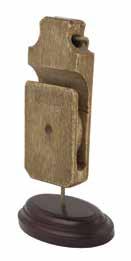
19th Century
Metal pins, eyes, hooks and beckets. Whale ivory components with some pearling. Lengths to 4”. 700/1,000
4007. WHALEBONE SNATCH BLOCK
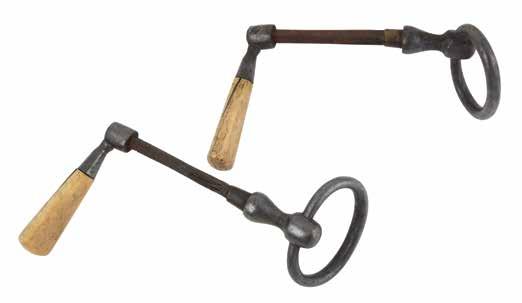

19th Century
Metal pin. Length 5”. With stand. Height on stand 6.5”. 300/500
4008. WHALEBONE "BRASS KNUCKLES"
Second Half of the 19th Century Crudely carved from a single piece of whalebone. Length 4.75”. 400/600
A similar example was part of the Barbara Johnson Whaling Collection, Sotheby’s New York, April 29-30, 1983, Lot #135.
19th Century
One end with metal ring pulls and opposite end with a tapered ivory handle. Lengths 7.5”. 250/350
WHALEBONE JIGGING

19th Century Length 7.75”. 300/500
Circa 1850
U-shaped crank with shaped handhold, made from a single piece of whalebone, ready to receive head and chuck.
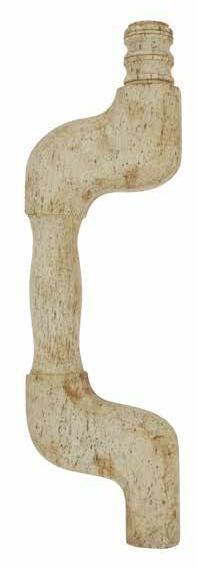
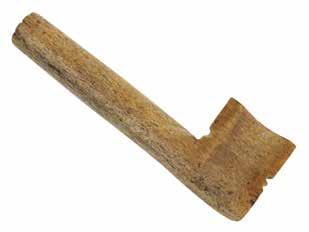
Provenance: Barbara Johnson Whaling Collection, Sotheby’s New York, September 24-25, 1982, Lot #524. Catalog notes it was found on Long Island.
19th Century
A nicely embellished example, with a relief-carved diamond on the shaft, a deeply incised starburst at the end of the handle and an incised groove on the convex side of the working end. Length 7.25”. 300/500
19th Century
1) Sailmaker’s pattern, a straightedge pierced with holes for laying out grommet patterns on sail hems. Length 28.5”.
2) Frame, probably for winding line. Comprised of four shaped dowels attached with metal pins and a brace. Approx. 20” x 16”. 300/500
Provenance:
Sailmaker’s pattern: Barbara Johnson Whaling Collection, Sotheby’s New York, December 11-12, 1981, Lot #317. The catalog refers to it as “Capt. James Shearman’s”.
19th Century
Stem scrimshawed “WHP” in serifed lettering. Stock with matching scrimshaw lettering on one face and deeply engraved “WHP” on two sides, the “H” on one side oriented horizontally. Shaped screw still threads and tightens nicely. Length 11.5”. 300/400
Circa
Consists of two heavy slabs, both pierced in four places, and a screw with turned head and sliding bolt handle. Threads and tightens nicely. Length 11.25”. 300/500

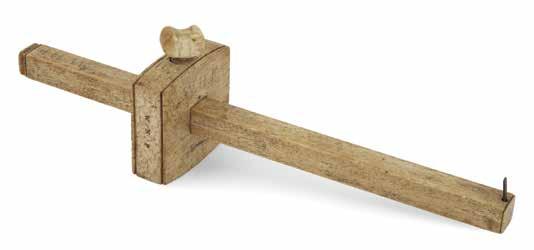
Provenance: Barbara Johnson Whaling Collection, Sotheby’s New York, September 24-25, 1982, Lot #522 (retains collection sticker).
Illustrated: Scrimshaw and Scrimshanders, Whales and Whalemen by E. Norman Flayderman (New Milford, Ct.: N. Flayderman & Co., Inc., 1972), p. 110. The text notes the piece was part of the Barbara Johnson Collection.
Provenance:
19th Century
Whalebone framework with contrasting dowels, possibly porcupine quills. Bail handle at center of top probably whale or walrus ivory. Corner posts with acorn-form finials and feet. Door with a pair of opposing pierced hearts, a turned knob and a rudimentary latch. Interior with a single perch. Height 7.25”. Width 8.25”. Depth 6”. 1,000/2,000
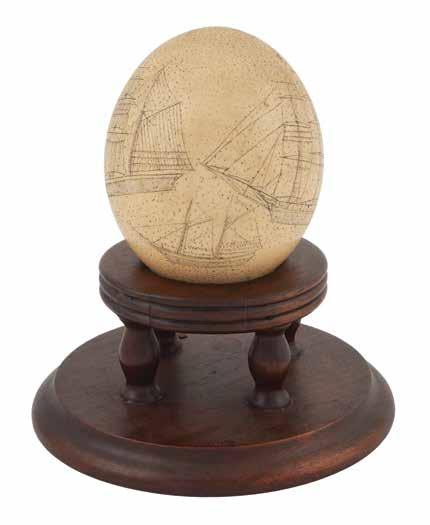
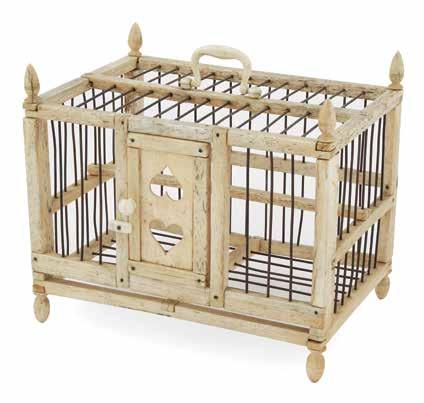
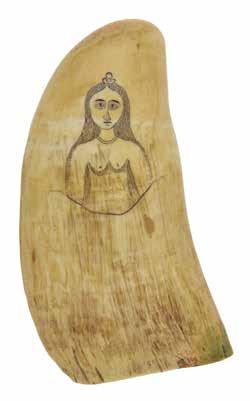
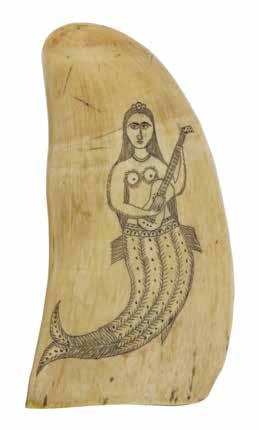
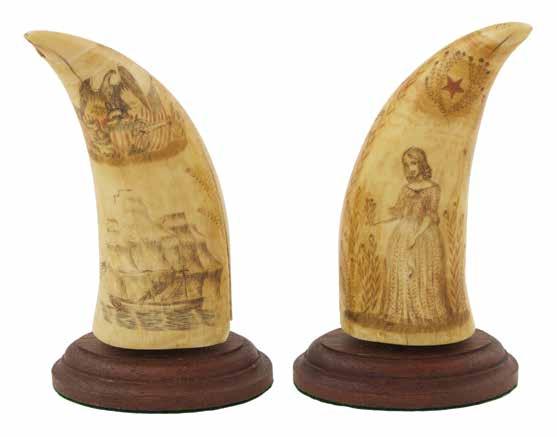
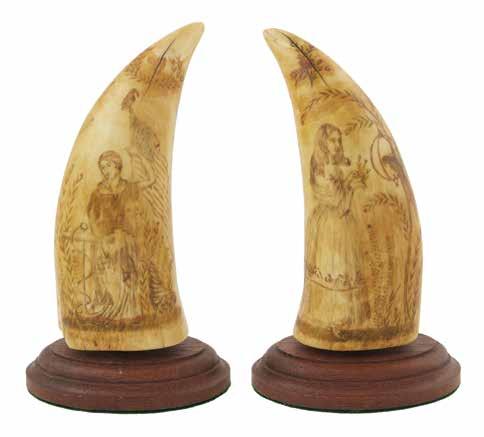
First Half of the 19th Century Obverse of one tooth depicts a patriotic montage of a spread-wing eagle with arrows in its talons, a Liberty shield, a capstan, a cannon on carriage, cannonballs and draped American flags, and a scene of an American-flagged three-masted vessel below. Reverse depicts a heart within a garland above Columbia holding a flagpole topped with a phrygian cap, resting her arm on a fouled anchor and with a cornucopia at her feet. Obverse of other tooth depicts a floral sprig above a scene of a woman standing in a garden, holding a small spray of flowers and gazing at a parrot perched on a hoop suspended from a slender tree. Reverse depicts a red star within a garland above a scene of a woman in a flower garden, holding a kerchief at her side. Both women in fine period dresses. Both teeth with foliate vines on edges. Rich patina. Lengths approx. 5.75”. With wooden stands. 15,000/20,000
Provenance:
Sotheby’s, where it was attributed to Captain Silas Jones of the whaler “Commodore Morris”. Northeast Auctions, Portsmouth, New Hampshire.
4020. WHALEBONE WAX SEAL CARVED AS FIST CLENCHING A SNAKE
19th Century
A right hand clenches a snake with inked eyes and an open mouth. Its head rests atop the knuckles of the fist and its body wraps around the wrist and forearm. Square base with X and O carvings. Height 3”. 500/700
4021. CARVED WHALEBONE CLENCHED FIST PIPE TAMP
19th Century
Clenched right fist with a particularly long thumb and a very slightly ruffled shirt cuff. Open cavity in the crook of the fingers, possibly for stringing the tamp on a lanyard. Tall stem with doublelined crosshatch design. Crosshatch carving on tamper. Height 3”. 500/700
4022. WHALEBONE PIPE TAMP WITH RARE INTIMATE FIGURAL CARVING



19th Century
A man and woman, both wearing hats, the woman’s bodice pulled down and her skirts pulled up. Shaped stem and tamper with crosshatch carvings. Height 3”. 750/900
4023. CARVED WHALE OR WALRUS IVORY KERCHIEF SLIDE
19th Century
Modified spade shape. Length 2”. 100/200
4024. IVORY CORDIAL CUP
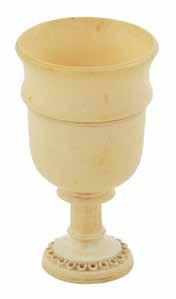
19th Century
Elegantly turned. Carved acanthus leaf design on foot. Height 2.75”. Diameter 1.5”. 250/350
4025. SIX SIMILAR WHALE AND WALRUS IVORY BODKINS
19th Century
All with ring turnings and red incised banding. Lengths from 3.25” to 4.25”. 550/650
4026. CARVED WHALE IVORY BODKIN
19th Century
Upper portion carved as a bracketed heart, an open section and a fluted ball. Open section inlaid with a contrasting dot on both side panels. Length 4.25”. 500/750
4027. EXTRAORDINARILY DELICATE CARVED WHALE IVORY BODKIN
19th Century
Polyhedral terminal pierced with a hole. Shaft with two open sections and another polyhedron. Length 3”. 300/450
A nearly identical example, part of the Mystic Seaport collection, is illustrated in A Treasury of American Scrimshaw by Michael McManus (New York: Penguin Studio, 1997), p. 44.
4028. WELL-CARVED WHALE IVORY BODKIN
19th Century
Terminal with an open section formed by two delicate crossed arches and a carved section with leaf tips nestling a polyhedron. Length 4”. 500/750
4029. CARVED WHALE IVORY BODKIN

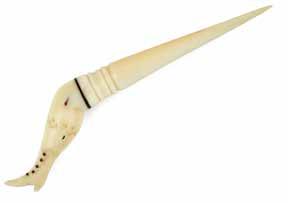

19th Century
Mushroom-shaped fluted finial inlaid with an abalone dot at top. Shaft with sections of differing spiral carvings, one section with spiraling leaves. Length 3.25”. 250/350

4030. "NAUGHTY NELLIE" CARVED WHALE IVORY BODKIN

19th Century
Terminal carved as a lady’s leg in a high-heeled boot, with a subtle eyelet petticoat around her calf and contrasting buttons on the boot. Thin contrasting spacer. Turned and tapered shaft. Length 3.5”.
450/550
4031. WHALE IVORY BODKIN WITH ARCHITECTURAL CARVINGS
19th Century
Faceted finial with incised crosshatching. Terminal with circlein-square, X, polyhedral and stepped carvings. Length 3.5”. 250/350
Mid-19th Century
Curved flat handle pierced with clubs, hearts, a diamond and a five-pointed star within a circle. Crescent-shaped piece of abalone mounted at end. Filigree carving along edge.
Mid-19th Century
Walrus or whale ivory. Fan-shaped terminal pierced with a diamond and a spade within a heart. Handle comprised of twin flat pieces of ivory sandwiching a layer of baleen, through-pierced with hearts and a large central diamond. Several smaller diamonds surrounding the larger diamond aren’t through-pierced, exposing the baleen layer. Filigree pattern along entire edges. Toothed wheel with pierced square hub. Pinned construction. Length 8”. 1,000/1,500
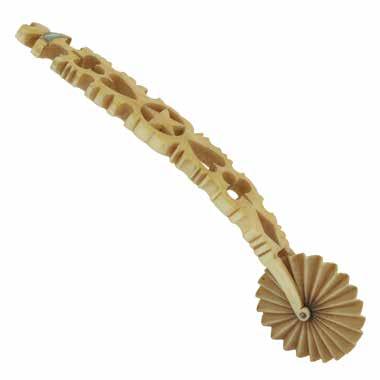
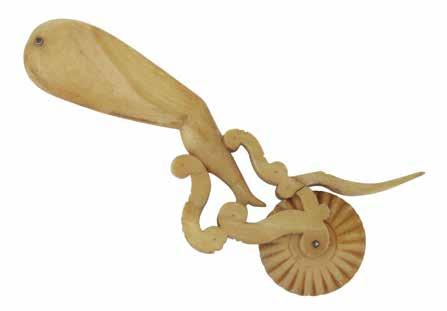
Handle formed as a woman’s leg in a high-heeled boot. Threetine crimping fork and fluted wheel on a mount formed from conjoined S-curves incised with geometric designs. Mellow patina. Some pearling. Length 6”. 1,000/1,500

4035. FINE WHALE IVORY AND WHALEBONE CANE WITH CLENCHED FIST HANDLE AND CARVED SHAFT
19th Century
Whale ivory handle formed as a clenched right fist and a shirt cuff inset with contrasting “buttons”. Contrasting collar believed to be ebony. Thick whalebone shaft, the upper twothirds with sections of quilted diamond, angled spiral, ropetwist and fluted carvings separated by carved bands, two bands with contrasting pique. Length 33.25”. 2,500/3,500
4036. CLENCHED FIST CANE
19th Century
Whale ivory handle formed as a clenched right fist. Elongated throat with four contrasting exotic wood bands. Tapered whalebone shaft. Length 34.5”.
850/950
4037. WHALE IVORY AND WHALEBONE WALKING STICK
19th Century
Whale ivory ball handle with inset exotic wood disk at top and two incised red bands around center. Throat comprised of whale ivory, exotic wood, shell and baleen segments, the whale ivory components with incised red bands. Slender tapered whalebone shaft. Length 35”.
650/800
4038. BLACK PALM CANE WITH WHALE IVORY KNOB HANDLE
19th Century
Whalebone ferrule. Length 33.75”.
150/250
4039. ROPE-TWIST CARVED WHALEBONE CANE SHAFT



19th Century
Shaft only, no handle. Fitted with metal ferrule. Length 28.5”. 450/600
4040. WHALE IVORY CARVING OF A FIST CLENCHING A SNAKE
19th Century
Snake, detailed with a contrasting eye, probably glass, a closed mouth and scales, wraps around the clenched right fist. Height 2”. 750/900
4041. CARVED IVORY BUST OF A SAILOR
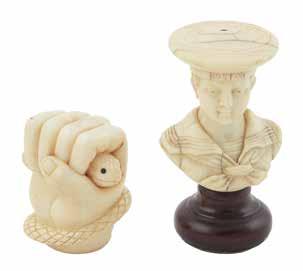
19th Century
Made as a cane handle. Possibly Civil War era. Sailor wearing a flat cap with a “Boston” hat ribbon and a traditional sailor’s suit with kerchief. Set on a wooden socle. Height 3.5”. 1,000/1,500
4042. WALKING STICK WITH MERMAID-FORM CARVED WHALE IVORY HANDLE
Late 19th Century
Mermaid wears a ruffled skirt, holds a cornucopia-type basket on her shoulder and her tail is wrapped around a pylon. Ebony shaft with foliate, quilted diamond and spiral carvings tapering to a plain cylinder. Length 35”. 1,000/1,500
4043. WHALEBONE CANE SHAFT


19th Century
Tapered octagonal shaft only; no handle. Deep age patina. Length 31.75”. 450/600
4044. WHALE IVORY AND WHALEBONE CANE
19th Century
Whale ivory turned knob handle and incised banded throat. Pierced for wrist cord (cord not present). Baleen collar. Slightly tapering octagonal whalebone shaft. Length 35”. 650/850
4045. BRONZE MERMAID MOTIF CANE HANDLE
Late 19th/Early 20th Century
Well-detailed casting of a mermaid rescuing a sailor. Height 3.75”. Width 5”. 500/700
First Half of the 20th Century Nicely detailed rigging and deckworks, including five whaleboats on davits. Height approx. 23.5”. Length approx. 28.5”. 2,000/3,000
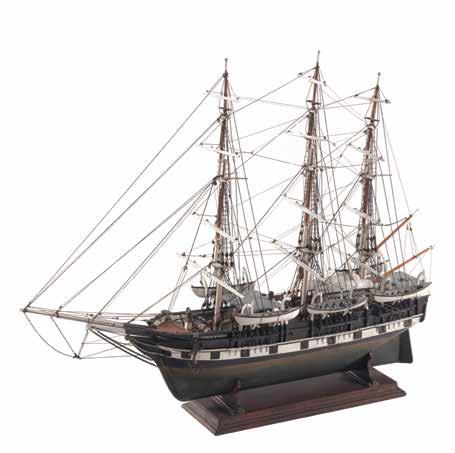
Second Half of the 19th Century Beautifully detailed and rigged, including whalebone embellishments to rigging, tryworks, hatch covers, etc. Black hull with red boot stripe and deep red bottom. Displayed on a cradle. Height 29”. Length 35”. 3,000/5,000

Mid-19th Century
Whalebone cage comprised of impressively carved and pierced stays. Whalebone shaft topped with an elaborately turned whale ivory finial. Finial, ball-form clamp, adjustment knobs and collars with red and dark blue-green incised banding and bands of contrasting pique. Clamp with unengraved silvered metal nameplate. Some adjustment knobs with shell caps. Length 18.5”. Cage diameter approx. 15”. 10,000/15,000


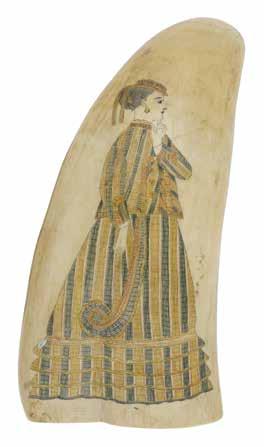
The women, both in elaborate dresses with patterns mostly executed with stippling, are set amidst flowers, vines and grasses. One woman’s bare foot is peaking out from under her dress. Deep patina. Length 6.25”.
4,500/6,000
4051, obverse and reverse
4052. LARGE SCRIMSHAW WHALE’S TOOTH WITH INSCRIPTION Dated 1873
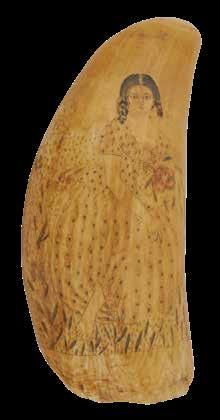
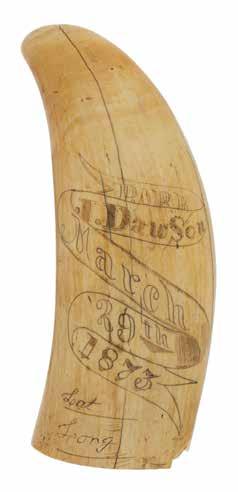
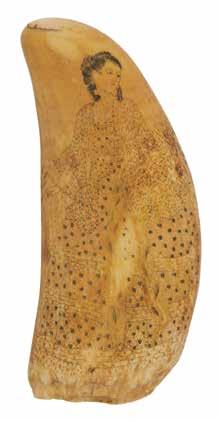
“Bark J. Dawson March 29th 1873” in different lettering styles on a twisting banner, and “Lat ____” and “Long ___” in script lettering below. Inscription presumably references the taking of the whale that yielded this tooth. Length 7”.
2,000/3,000

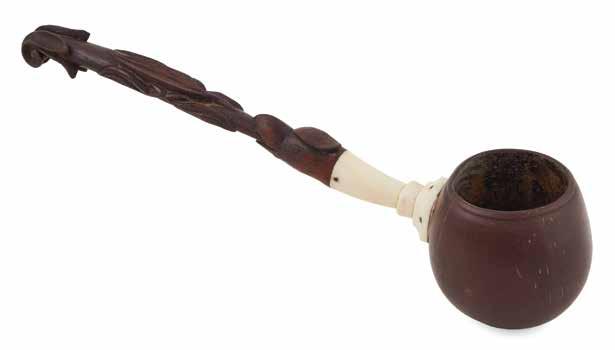


19th
19th

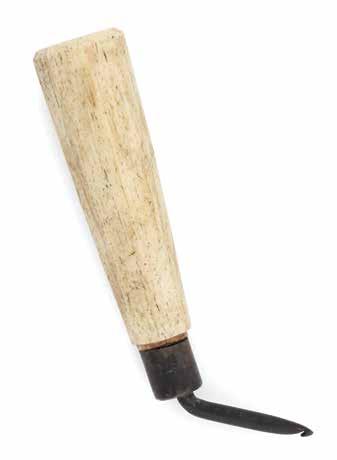




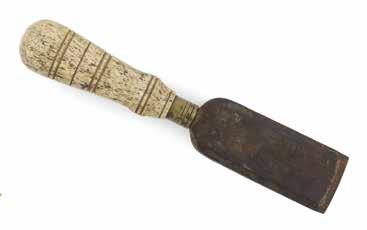
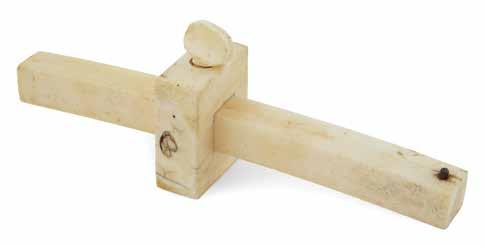
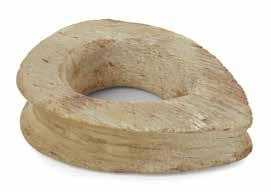
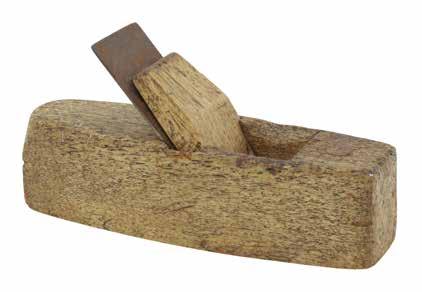
19th
19th
19th Century Whalebone stick with whale ivory caps, inlaid abalone bands and a central inlaid translucent shell panel showing the “Abby H. Butts” inscription below. Abigail Butts was the wife of Captain Francis A.
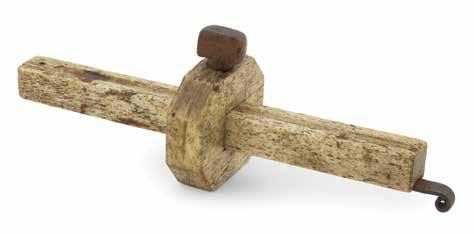
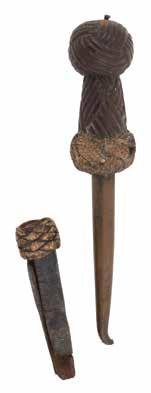
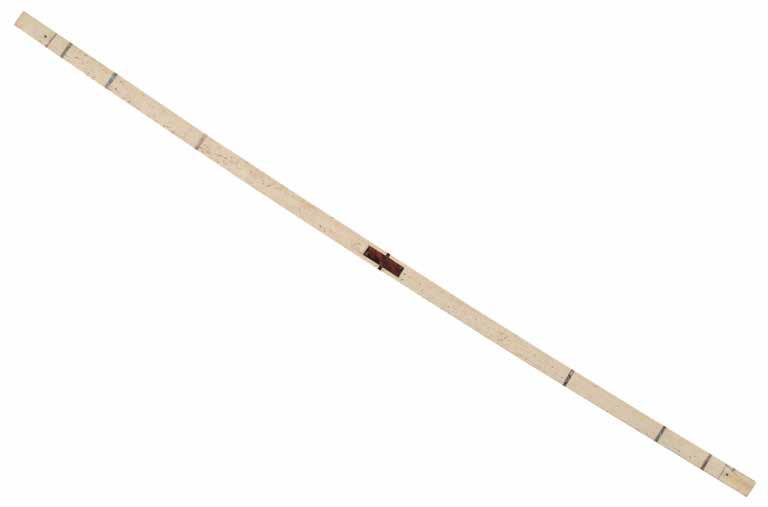
Portrait of the American whaleship Niger. Signed and dated lower left “E.N. Russell 1905”. Also includes a postcard of the Niger and a souvenir pitcher, height 6”, on which the decoration is purportedly based off this painting. Oil on canvas, 18” x 26”. Framed 19.75” x 28”. 1,000/1,500
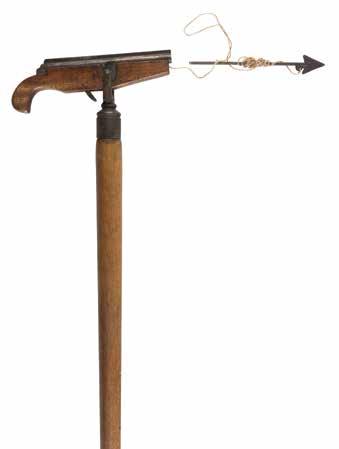
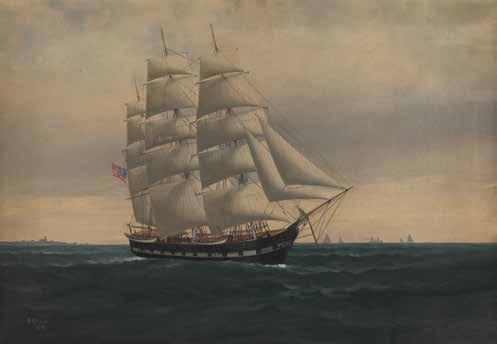
4072. WHALE OIL BAILER
19th Century
Brass pot and iron handle. Pot diameter 10”. Length with handle 21.25”. 350/500
Provenance: Barbara Johnson Collection.
4073. HARPOON GUN CARTRIDGE BLOCK
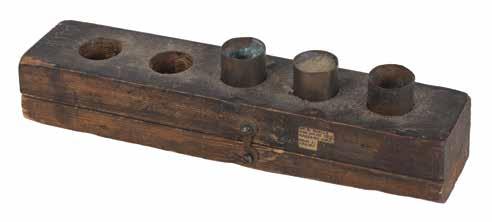
19th/Early 20th Century
Old paper tag marked “Darting Gun Harpoon From Bark Sea Breeze of New Bedford Made by E.B. & F. Macy 1860-1904 Front Street New Bedford, Mass.”. Height 2.5”. Length 9.5”. Width 2”. 700/1,000
4074. DOUBLE FLUE HARPOON MADE FOR A GREENER HARPOON GUN

19th Century
With stop withers. Head marked “Ocean Nymph” and “R. & Co. 1866”. Length 51”. 1,500/2,000
19th
65.5”. 500/1,000
4076. DOUBLE FLUE HARPOON

19th Century
Made by Henry Hall of New London, Connecticut. Marked “N. Engd.” and “B.B.H.H.” for bow boat. Length 39”. 2,000/3,000
Provenance: Robert Hellman Collection.
4077. TOGGLE HEAD HARPOON

19th Century Unmarked. Length 40.5”. 900/1,200
4078. RARE MASON AND CUNNINGHAM
BOMB HARPOON
Circa 1880
Hinged barbs. Length 33.75”. 2,000/3,000
4079. TOGGLE HEAD HARPOON
19th Century
Head marked “S&P”. Original octagonal pole and manila line, the pole branded “J.H. Little”. Wooden sheath. Total length 97”. 1,500/2,500
19th Century
Original
1,000/1,500
Second Half of the 19th Century
With
1,000/1,500
Mid-19th Century
The
19th Century

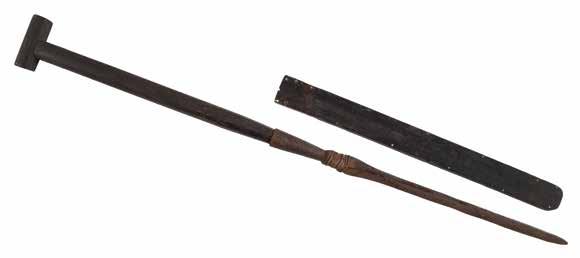
Under old gray paint. Unmarked.
49.25”. 200/300






4084. TOGGLE HEAD HARPOON FOR A GREENER-TYPE HARPOON GUN
19th Century
Retains strong orange paint throughout. Unmarked. Length 47”. 1,000/2,000
4085. RARE DARTING HARPOON GUN
19th Century
From the bark Canton. With brass bomb, toggle head harpoon, original pole and a leather sheath painted blue. Marked “Pat Apr 1882”. Head marked “BK Canton”, “Macy” and “LB” for larboard boat. Harpoon length 37.75”. Pole length approx. 97.5”. 3,000/4,000
4086. R.E. SMITH BOMB HARPOON
Mid-19th Century
Fixed head with toggle barb. Illegibly marked near head. Length 25.5”. 1,000/1,500
4087. HARPOON USED IN A GREENER-TYPE HARPOON GUN
19th Century
Exceptionally large head. Adjustable stop withers with barbed ends. Length 50.75”. 2,000/3,000
4088. CAST IRON C.C. BRAND HARPOON GUN
Mid-19th Century
Skeletal stock butt. Includes brass bomb lance with rubber fins. Length 38”. 3,000/4,000
4089. SIX WHALING BOMB LANCES 1,500/2,500
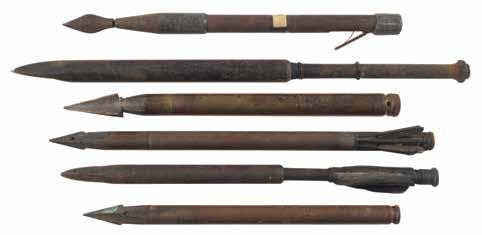
4090
4090. RARE TOGGLE HARPOON FROM THE BARK CANTON
Mid-19th Century
Head marked on one side “BK CANTON” and the other “SB”. Retains period pole and canvas-covered wooden sheath. Total length 74.5”.
4091. FORGED IRON SINGLE FLUE HARPOON

Mid-19th Century
Unmarked. Length 35”.
4092. TWO LAKE & BURGESS HARPOONS
Mid-19th Century
One single flue and one double flue. Both marked “L&B” for Lake & Burgess of New London and “FNL”, possibly for the ship Fenelon. Both retain period manila rope. Lengths 37” and 39.75”.
Provenance:
Purportedly both used on the same whaling voyage on the Fenelon
4093. TEMPLE-STYLE HARPOON
Mid-19th Century
Marked “Keoka” for the bark Keoka and “W.B.” for waist boat. Length 37.25”.
4094. CAST IRON TOGGLE HARPOON

Mid-19th Century
Head stamped for Cole of New Bedford. Length 29.75”. 600/800
4095. TOGGLE HARPOON
Mid-19th Century
Marked “J. Barton” for James Barton and “SB” for starboard boat. Stamped on the point “A.T.G.” for the gas schooner A.T. Gifford and “B.M. Ortiz”. Retains period manila rope and canvas-covered wooden sheath. Length 37.25”. 1,500/1,800
4096. TOGGLE HARPOON ATTRIBUTED TO THOMPSON
Mid-19th Century
Finely executed sailor’s ropework on shaft and the lower portion of the cone. Unmarked. Length 41”. 1,600/2,000
Literature:
Similar to the example titled “Mr. Thompson’s Harpoon” illustrated on pg. xiv in Harpoons and Other Whalecraft by T.G. Lytle.
4097. TWO SWIVEL BARB HARPOONS
Mid-19th Century
Faintly marked “CR”, possibly for the ship Crescent Length 37.5”. 800/1,200
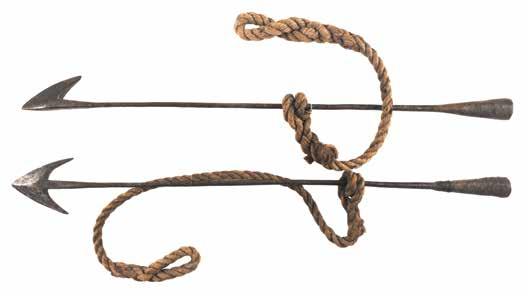


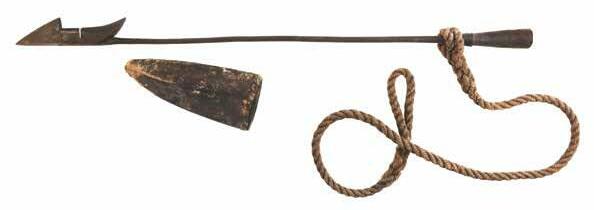


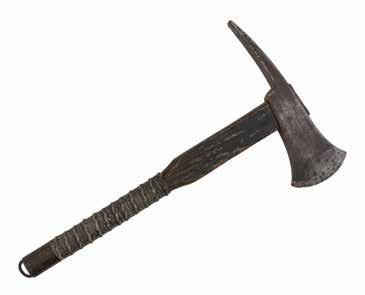
4101. CAST IRON BLUBBER SPADE
Mid-19th Century
Unmarked. Length 41.25”. 300/500
4102. LATER WROUGHT IRON DOUBLE FLUE
HARPOON WITH ORIGINAL SHAFT
America, 20th Century
The sharp double flue blade marked “Macy” and “SB”. Mounted to original wooden pole with seizing to the lower part of the steel mount and manila rope tied to the pole. Length 88”. 3,000/5,000

4103. TOGGLE HEAD DARTING GUN IRON

Early 20th Century
Identified by Bob Hellman as Peters of New Bedford. Boat mark on head. Length 37.5”. 700/1,000
Provenance: Bob and Nina Hellman, Nantucket, Massachusetts. Includes copy of original receipt. The Collection of Michael Gill.
4104. DURFEE FORGED STEEL SINGLE FLUE

HARPOON
Mid-19th Century
Stamped “Durfee”. Length 35.75”. 1,200/1,800
4105. FORGED IRON DOUBLE FLUE
HARPOON, PROBABLY ENGLISH
Mid-19th Century
With stop withers. Under old red paint. Head stamped on one side “IBS” and marked illegibly on the other. Length 25”. 800/1,200





Mid-19th Century
Tenney is also known as the “King of the Sea” artist. Coastal scene wraps around the circumference, depicting a barefoot and helmeted Liberty holding aloft a chalice and grasping a stars and stripes shield at her side. She stands beside a fouled anchor, a pile of cannonballs and an urn-topped monument draped in American flags, and she gazes out at a ship at sea. At the tip, an eagle entwined with a “Liberty and Freedom” banner drinks from the chalice. Great patina and the slight blue-green coloration typically seen on Tenney scrimshaw. Length 5.25”. 6,000/10,000
Provenance:
Nina Hellman Antiques, Nantucket, Massachusetts, January 26, 2015.
Samuel W. Tenney’s identity was uncovered by scrimshaw historian Michael Gerstein through a tooth in the collection of Historic New England. Tenney was born in Oxford, Massachusetts and served in the Navy aboard the U.S.S. Brandywine and later on the whaleship Fenelon of New Bedford. Examples of Tenney teeth to come to market at Eldred’s include Lot #623 in the November 21, 2013 auction and Lots #31 and 233 in the July 25, 2019 auction, one from the collection of Paul Vardeman and the other from the collection of Sam and Donna McDowell. A similar tooth to this one is illustrated in Wandering Whalemen and Their Art: A Collection of Scrimshaw Masterpieces by Alan Granby (Hyannis Port, Mass.: 2021), p. 75-76, and another in Scrimshaw and Scrimshanders, Whales and Whalemen by E. Norman Flayderman (New Milford, Ct.: N. Flayderman & Co., Inc., 1972), p. 6, which was sold at Eldred’s, July 25, 2019, Lot #2.
Mid-19th Century
Obverse depicts four ships in different positions off a coastal lighthouse. Reverse depicts the densely detailed “View of Jerusalem.”, with figures on a hill in the foreground overlooking the city’s walls. Titled in serifed lettering below scene. Length 8.5”.
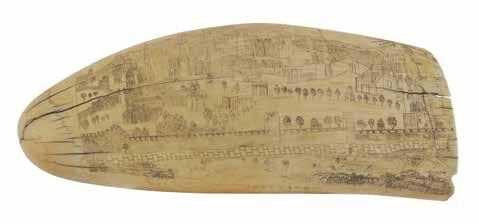
Mid-19th Century
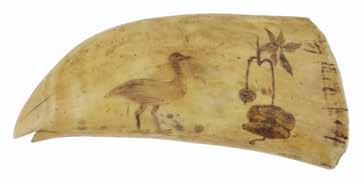
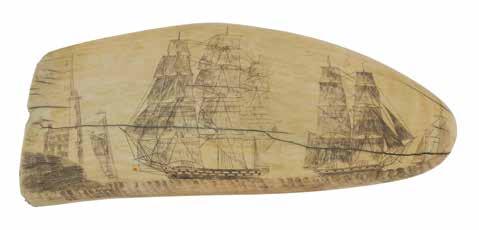
Whaling scene on obverse with a whaleship in the foreground and another in the far distance, three whaleboats in the water, a pod of spouting whales, and a harpooned whale, the water colored red around it. Reverse with a shorebird and an exotic flowering plant. Mellow patina. Length 6.75”. 3,500/5,000

Mid-19th Century
Obverse of one tooth depicts “Royal Navy Forever” over a scene of a distant ship and a couple with their arms linked, the man raising a chalice and the woman holding a kerchief and a bottle of wine. Other tooth depicts “Englands Glory” over a lion’s mask, a ship and a figure of “Hope” holding a British flag on pole and resting her elbow on a fouled anchor. Figure identified in a diamond-shaped medallion at base. Both scenes with acanthus leaf borders. Reverse of one tooth depicts “Longwood New House St. H. Na” above a view of the house and its grounds. Other tooth depicts crossed French flags above “Napoleons. Tomb Helena. 1836.”, identified in a diamond-shaped medallion at base. Both teeth with lion’s masks and deeply carved swag borders at tips, the swags containing and suspending acanthus leaves, medallions and lion’s masks. Shaded borders at bases with diamond-shaped medallions, some vacant, some with acanthus leaves and some with lettering. Lengths 5”.
4,000/6,000
A similar pair by the same hand was part of the Kobacker Scrimshaw Collection, sold at Eldred’s, The Marine Sale, July 19, 2018, Lot #42. Both pairs depict St. Helena, where Napoleon spent six years in exile before his death in 1821. The British governor of the island, Sir Hudson Lowe, agreed to build a new Longwood House in 1820, to replace the inhospitable old Longwood House, but Napoleon died before construction was completed. Napoleon was buried on St. Helena but his remains were moved to France in 1840.

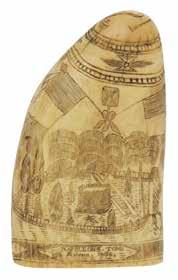
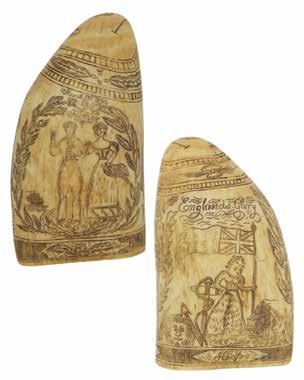
4113

A starboard view of a frigate under sail, flying a streamer and flags from the masts and with crewman visible in the rigging and on deck. A smaller vessel flying a streamer is off the stern. Portrait within a fine arched frame with a sawtooth border along the lower edge. Mellow patina. Length 7”. 1,000/1,500
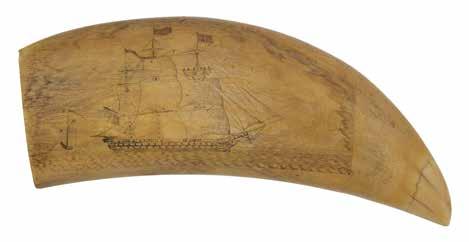
19th Century
Obverse with a whaling scene of a whaleshp flying a “B” house flag, three whaleboats in pursuit of whales in the foreground, and two whaleboats on the distant horizon sailing toward the viewer, characteristic of the scrimshander’s work. Traces of polychroming. Reverse depicts a bark with a bone in her teeth and a cutter off a coast lined with distinctive towering cliffs. The larger ship is flying a long streamer, and both vessels are flying British ensigns. Length 7.5”. 7,000/10,000


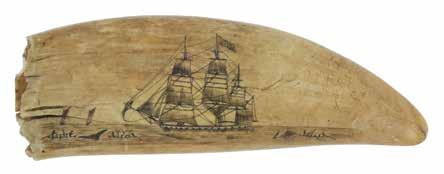
A tooth by the Naval Engagement Engraver also depicting a ship flying a “B” house flag was offered at Eldred’s, The Marine Sale, August 4, 2022, Lot #3100.
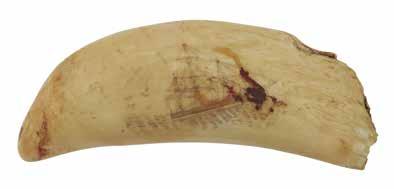
Mid-19th Century
Obverse depicts a ship off a coastal lighthouse and a large lighthouse keeper’s building. Nicely detailed with reef points, window muntins, a chimney, fence, etc. Reverse depicts a ship in rolling seas. Length 7”. 2,500/3,500
Provenance:
Paul Madden Antiques, Sandwich, Massachusetts.
19th
19th
Lid with hardwood top and baleen lip, the top inlaid with whale ivory and abalone hearts and diamonds surrounding a whale ivory star with central baleen dot. Box with baleen sides and soft wood base, the sides with scrimshaw depicting two American-flagged ships, a lighthouse, a stately home with fence and trees, and a building, probably a customs house, flanked by flagpoles, one flying a large American flag and the other a burgee. Height 3.25”. Length 8”. 800/1,200
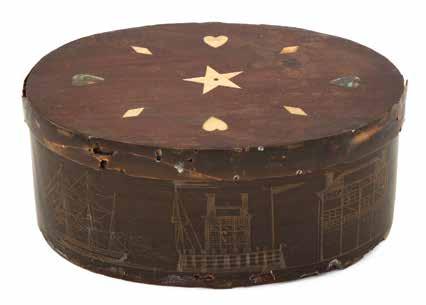

19th Century
Full-length portraits in arched niches, one of a woman with long hair holding a serrated spear and the other of a woman with short hair holding a longer barbed spear. Both women hold a cluster of coconuts and have muscular tattooed bodies.
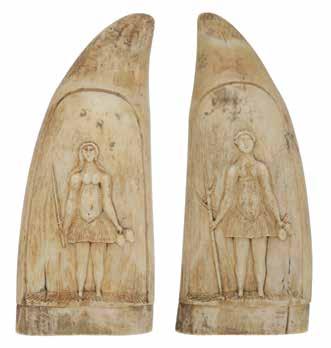
Lengths 6”. 1,500/2,500
Mid-19th Century
Obverse depicts a naval battle, most likely the U.S.S. Constitution and the dismasted H.M.S. Guerriere, the ships surrounded by billowing smoke and flying their nation’s flags and ensigns. Deep, intaglio-style carving of the ships’ hulls. “Constitution” in faint rudimentary lettering below scene. Reverse with a nude goddess, an eagle grasping a banner in its beak, a shield, a horn, American flags, a bundle of olive branches and arrows, and a portrait medallion of a ship, probably the Constitution. Length 6.75”. 10,000/15,000
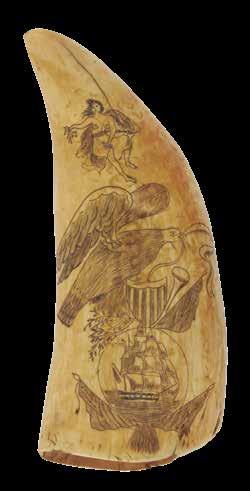
Provenance: Paul Madden Antiques, Sandwich, Massachusetts.
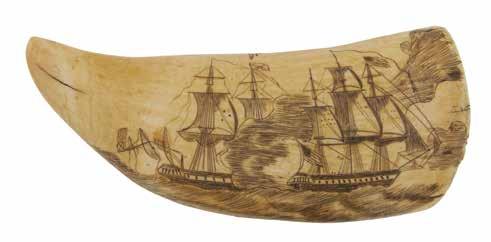
19th Century
Obverse with a fine line border surrounding a whaling scene of a whaleship and two whaleboats in pursuit of four visible whales, one surfaced and spouting, one showing its fluke, one about to be harpooned and one already captured, the water around it colored red. Ship with unusual composition of deep stipples and very fine lines. Crescent shape at tip, outside of border. Reverse with a circle within a five-pointed star at tip, a ship in rollicking seas at base, and a central arch of stars above a spread-wing eagle clutching a shield to its breast and arrows and olive branches in its talons. Length 6”. 3,000/4,000
19th Century
Depicts a British ship, five men in a whaleboat, a surfaced whale and rough seas. Deeply incised. Length 6”. 1,000/1,500

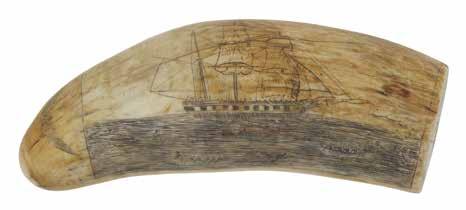
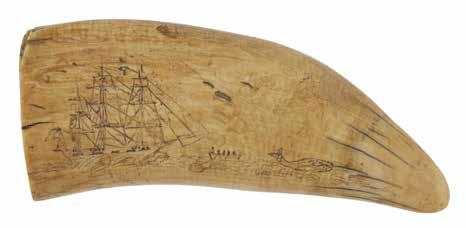
19th Century
19th
19th Century
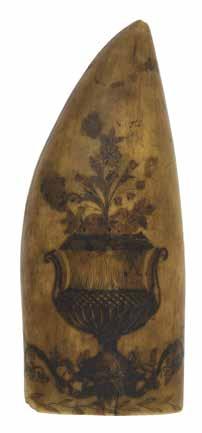

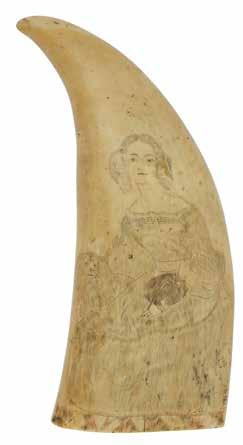
Obverse with a half-length portrait of a woman adorned with flowers, framed with an elaborate floral border. Reverse depicts an urn of flowers entwined with a flowering vine. Fine foliate tendril at base. Richly inked, with some traces of polychroming, and finely detailed. Deep patina. Length 5.25”. 1,000/1,500
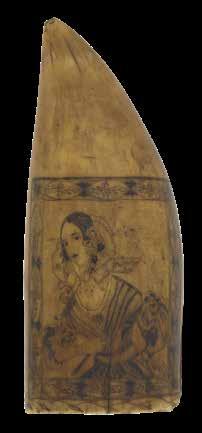
19th Century

19th Century
Bold whale ivory clamp carved as right fist clenching the shaft. Lower portion of the shaft is whalebone while the upper portion is comprised of a series of conjoined whale ivory segments with red and dark blue-green incised banding. Turned whale ivory collars, adjustment knobs and substantial clamp screw with matching red and dark blue-green incised banding. Shaft topped with a turned whale ivory mount that probably was designed to receive a yarn cup. Whalebone cage in need of restoration. Length 15.5”.

2,000/3,000
Whale ivory C-shaped clamp with scrimshawed monogram “RAC” cartouche, contrasting pique heart and other embellishments, relief-carved scrolls, a carved bulbous fluted column, and a shell shield-shaped escutcheon around the screw aperture. Whale ivory yarn cup, adjustment collars and clamp screw with red incised banding. Dark exotic wood shaft and collar screw. Lighter wood cage. Length approx. 21”. Cage diameter approx. 21”.
700/1,000
19th Century
Both in elegant dresses. Lady on one side, possibly Scandinavian, has red flowers in her hair and red bracelets on her wrists and holds a posy of red flowers. The lady on the other side, possibly Spanish, has a red fan-like hair ornament, a pendant necklace and beaded bracelets, and she holds a folded fan. Length 6.5”. 500/1,000
19th Century

Scene wraps around the circumference and depicts a mother resting her hand on the back of a chair and watching one daughter play with a hoop and the other jumping rope, while a toy sailboat rests in the background. All three figures in elaborately patterned dresses. Mostly executed in pinpoint with some shading. Length 7.25”.

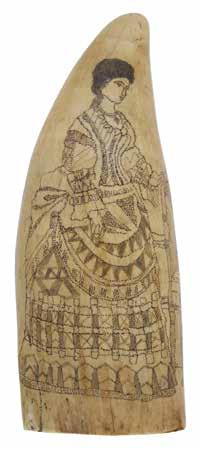
1,000/1,500

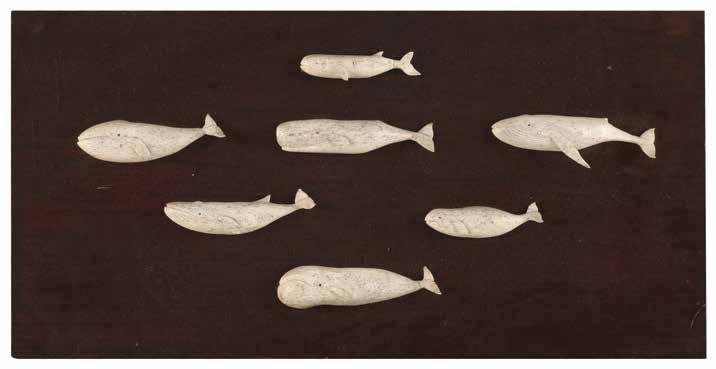
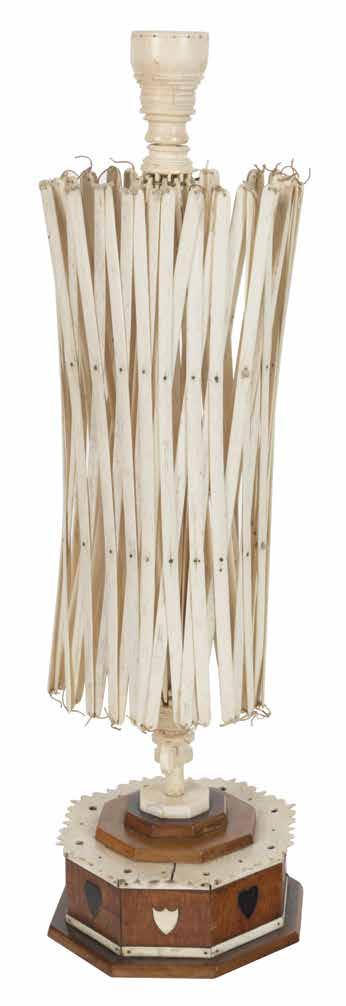
Massachusetts, 1881-1947
“New Bedford Docks”. Signed lower left “C.W. Ashley”. Oil on canvas, 30” x 25”. Framed 35” x 30”. 6,000/8,000
Provenance:
According to family history, this painting was acquired from the artist by Alexander Gault Grant, Massachusetts, and descended through the family.
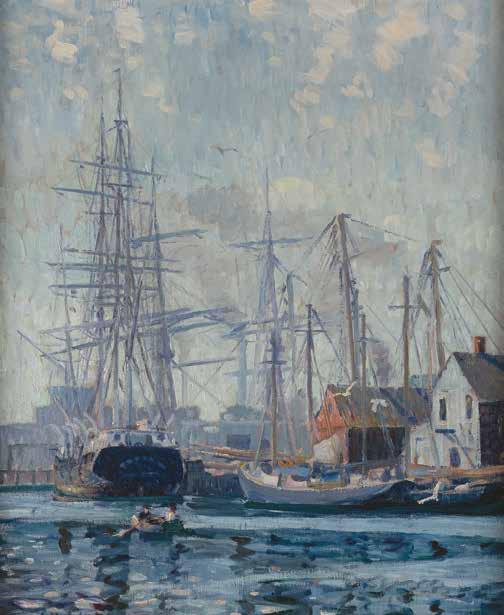
Andrew Jacobson Marine Antiques, Ipswich, Massachusetts, 2016.
Massachusetts, 1881-1947
Two sailors on deck, one carving a pie crimper. Signed right center “C.W. Ashley”. Pen and ink, 7.75” x 5.75” sight. Framed 15.25” x 12.75”. 300/500
Provenance: Nina Hellman Antiques, Nantucket, Massachusetts, 2012.
4134. EXCEPTIONAL WALRUS AND WHALE IVORY SEAM RUBBER


Mid-19th Century
Handle with turk’s-head knop inset with a baleen circle. Octagonal stem with carved rings and baleen band. Sides of blade in an unusual serpentine shape. Length 4.25”. 2,000/3,000
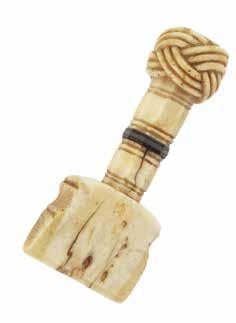
Provenance: John F. Rinaldi Antiques, Kennebunkport, Maine, 2016.
Illustrated:
Scrimshaw and Scrimshanders, Whales and Whalemen by E. Norman Flayderman (New Milford, Ct.: N. Flayderman & Co., Inc., 1972), p. 126.
4134
4135. WHALE IVORY SEAM RUBBER 19th Century
Both sides of blade with “Mary 1823” engraved and colored with red sealing wax. Also monogrammed in red sealing wax “SWR”. Handle and blade with continuous bold ring turnings. Length 4.5”.
700/900
Provenance: John F. Rinaldi Antiques, Kennebunkport, Maine, 2016.
A similar busk, from the Collection of Ian R. MacKenzie, also depicting a whaling scene framed by the same husk garlands and flanking emblems as seen here, was sold at Eldred’s, The Marine Sale, August 19, 2021, Lot #52. One with three scenes but the same style of husk garlands, most likely by the same artist, was sold at Eldred’s, The Marine Sale, August 4, 2022, Lot #3196. More information about the Lambeth Busk Engraver is forthcoming in a future publication by Dr. Stuart M. Frank. 4136
4135
4136. SCRIMSHAW WHALEBONE BUSK WITH WHALING SCENE BY THE LAMBETH BUSK ENGRAVER
Mid-19th Century
Finely detailed whaling scene showing a whaleship, a large pod of spouting whales, several waifed whales, whaleboats actively involved in captures, and figures visible on deck of the whaleship and in action in the whaleboats. Scene framed within husk garlands and flanked by a sprig of forget-me-nots and a music-themed emblem of a lyre and baton amidst foliage. Length 14.5”. 4,000/6,000
19th Century

Depicts four darkly inked vignettes, each set atop a running bond pattern: two port-view ship portraits, a woman wearing a tri-pointed hat holding aloft a vine garland and standing on a small knoll, and a portrait of a knight in full armor. Reverse with a crude engraving of a sloop done by a different hand. Lobed top. Length 13.5”. 4,000/6,000
The woman’s tri-pointed hat as seen here is nearly identical to one on another tooth attributed to a Ceres Artisan sold at Eldred’s, The Marine Sale, August 13, 2020, Lot #48. Her vine garland is similar to the garlands that often form the proscenium arches commonly seen on Ceres Artisan teeth.

Mid-19th Century
Cartouche at center, the name mostly worn away, is surrounded by flowering plants and trees, one tree with a snake coiled around the trunk. Upper vignette depicts a spread-wing eagle above a monument flanked by American flags. The eagle holds a banner in its beak, has a red-striped shield at its breast and crossing arrows by its tail feathers. Lower vignette depicts a building with a large tower topped with American flags and a whale-form weather vane. Vignettes with arched borders. Delicate foliate vine around perimeter. Ruffled carving at top and bottom of busk. Length 12”. 1,000/1,500
Mid-19th
Inset whalebone cover with baleen and abalone inlay forming a star. Unusual geometric fingers.
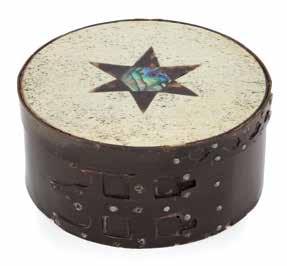
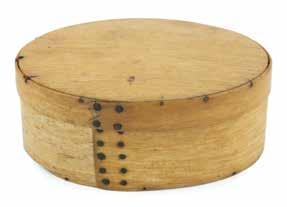
Provenance:
Paul Madden Antiques, Sandwich, Massachusetts, 2005.
Notes:
A similar example is illustrated in Scrimshaw and Scrimshanders, Whales and Whalemen by E. Norman Flayderman (New Milford, Ct.: N. Flayderman & Co., Inc., 1972), p. 231.

One side depicts a well-dressed gent with a walking stick standing on a checkerboard-patterned boardwalk overlooking two distant ships, one flying an American flag. Above the scene is a small emblem of a sun face rising over the mountains. The sun face and the checkerboard, which resembles mosaic pavement, could be Masonic symbols. Opposite side depicts a young girl standing beside a tall potted rosebush, reaching out one hand to grasp a flower and holding a floral sprig in her other hand. Scene
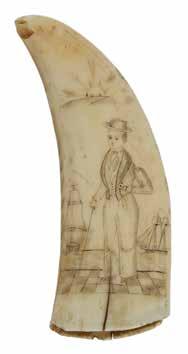
SCRIMSHAW PANBONE PLAQUE DEPICTING A WHALING SCENE
Mid-19th Century
Depicts a whaleship under partial sail off a small mountainous island, probably volcanic, as well as four whaleboats at different stages of whale capture, and several whales, one of which is waifed. Vine and double-line borders around perimeter. Approx. 5” x 8”. With wooden stand. 3,500/5,000
This plaque is very similar to, and possibly the same hand, as one illustrated in Ingenious Contrivances, Curiously Carved by Stuart M. Frank (Boston: David R. Godine, 2012), fig. 5.2, and one sold at Eldred’s, The Marine Sale, August 19, 2021, Lot #133. The otherwise anonymous scrimshander, believed to be British, is known as the Panbone Engraver.

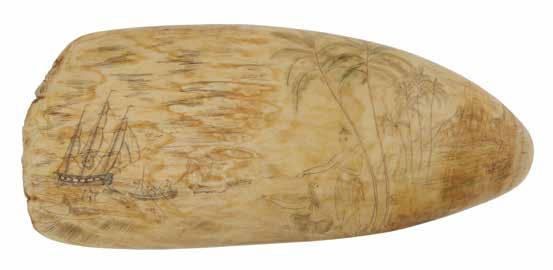
Circa 1850
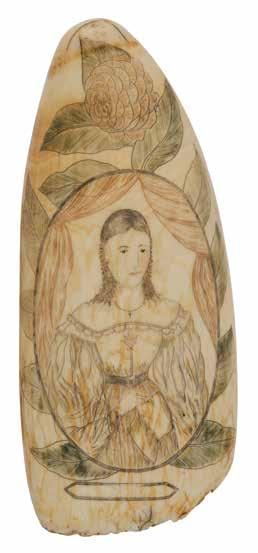
Like on many of Hiliot’s teeth, the obverse depicts a Pacific Islander scene showing two natives in grass skirts standing beneath palm trees, pointing their outstretched arms toward a whaleship and two whaleboats in active pursuit of a pod of whales. Distant mountains and a cloudy sky frame the scene. Reverse with an oval medallion containing a three-quarter length portrait of a formally dressed woman with tightly curled hair, wearing a cross necklace and a rose tucked into the belt of her dress, and holding a folded letter in her hand. Portrait framed by red drapes and medallion surrounded by green leaves and a red rose. Vacant cartouche at base. Bright colors and warm patina. Length 7”. 20,000/30,000
Provenance:
Hyland Granby Antiques, Hyannis Port, Massachusetts, 2014.
Two similar teeth by whaleman George Hiliott are illustrated in Ingenious Contrivances, Curiously Carved by Stuart M. Frank (Boston: David R. Godine, 2012), fig. 3:13a and b. Frank writes that Hiliott engraved at least five teeth showing a native islander on one side and an elegantly clad woman on the other.
Extraordinarily unusual and fanciful subject matter for scrimshaw, possibly unique. “Whew for the Diggins” in serifed lettering at tip of obverse, above a hybrid fish/sidewheeler, with a fish’s head and tail fins and a central smokestack trailing smoke. A man in a top hat and tailcoat is astride the vessel while a long-haired figure flies behind him, holding on to his coattails. Below the vessel is a herd of animals, including a turtle, flying fish, a galloping horse, a buck, does and a coyote. At the base is a mountainous desert landscape that wraps around the circumference, with a man riding an elephant on the obverse and a man riding a camel on the reverse. The elephant rider is wearing a conical cap, is smoking a pipe and has a sack marked “Gold Dust” slung over his shoulder. The camel rider is wearing a flat-peaked cap, is holding a whip in his right hand, is resting a rifle against his left shoulder and has three boxes stacked behind him, the largest box marked “California Gold”. A small dog carrying a sack in its mouth walks between the camel’s legs. It is believed the elephant and camel riders are moving eastward, leaving with their gold, while the other animals rush west to seek their fortunes. Length 6.5”. 20,000/30,000
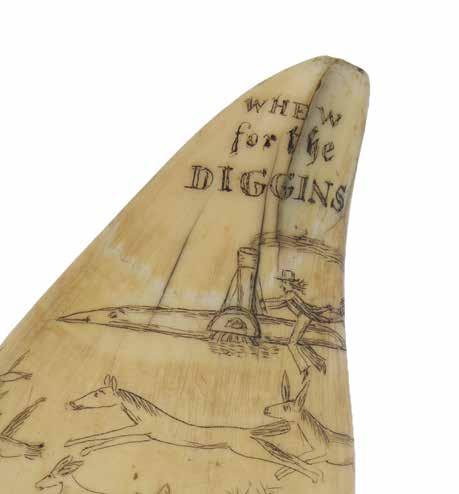
Provenance: Nina Hellman Antiques, Nantucket, Massachusetts, 2002.
Illustrated:
“Rare Subject Matter for Scrimshaw: The California Gold Rush”, Antique Scrimshaw Collectors Association Scrimshaw Observer, Vol. 3, No. 1, Winter 2019, p. 5.
Elephant motifs are more common in California Gold Rush memorabilia than might be expected, given that elephants aren’t native to California and weren’t used in gold prospecting. However, the idiom “Seen the elephant” or “seeing the elephant”, referring to the adversities and disappointment suffered by gold seekers on the trail and in the camps, was a popular one at the time and was referenced widely in diaries and periodicals. When a man had given up and headed home, or was otherwise disenchanted with his life’s station, it was said he had “seen the elephant”.
The origins of the phrase are debatable but common folklore has it that a farmer who had never before seen an elephant but longed to do so encountered one in a circus parade while he was on his way to market. The farmer was delighted at the sight but his horse was terrified, overturning the cart and destroying the farmer’s wares. In response the farmer said it didn’t matter for he had “seen the elephant”.
There are records of whalers heading to California to try their luck with gold, especially as the whaling industry began to decline in the Mid-19th Century. Interestingly, in an 1850 letter written aboard a Nantucket whaleship bound for San Francisco and the Gold Rush, the writer, T.L. Whitaker, complaining about the voyage, says he may “see the elephant before we get to San Francisco”.
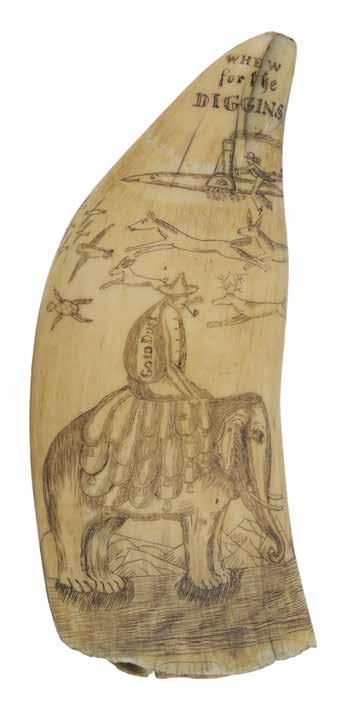
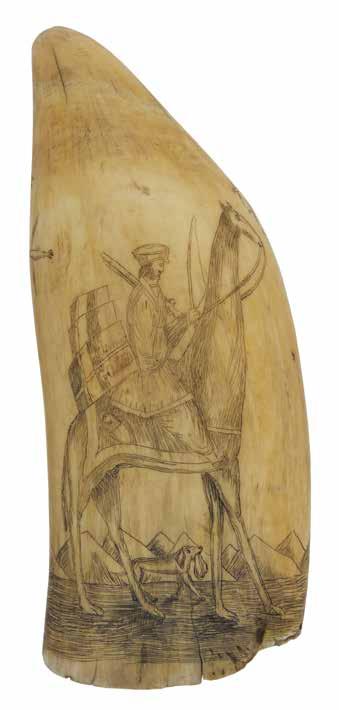
Mid-19th
Provenance: Northeast
1,800/2,500
4147. WHALEBONE FID


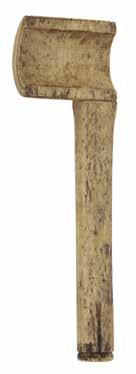
Mid-19th Century Turned rings at end. Length 11.5”. 700/1,000
Provenance: Paul Madden Antiques, Sandwich, Massachusetts, 2011.
4148. CARVED WHALEBONE SERVING MALLET 19th Century Marked “EHO” above a diamond. Length 8.5”. 700/900

Mid-19th
Provenance: John
800/1,200
Provenance: John F. Rinaldi Antiques, Kennebunkport, Maine, 2015.
4149. NICELY MADE WHALEBONE SNATCH BLOCK
19th Century
Beveled edges. Retains old, possibly original, manila rope. Block length 4.5”.
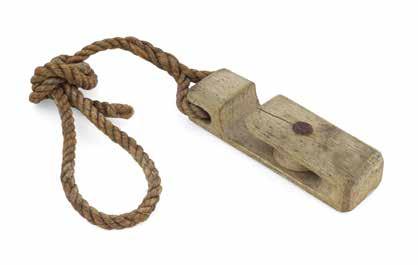
4150. WHALEBONE SNATCH BLOCK
4151. WHALEBONE DOUBLE BLOCK
4152. WHALEBONE SINGLE SHEAVE BLOCK
Mid-19th Century
Whalebone and copper pins. Deep patina. 500/700
Provenance: Paul Madden Antiques, Sandwich, Massachusetts, 2011.
4153. RARE WHALEBONE SNATCH BLOCK

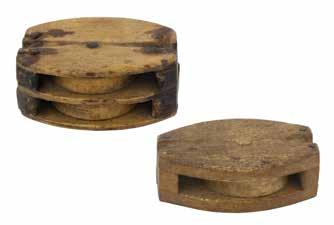
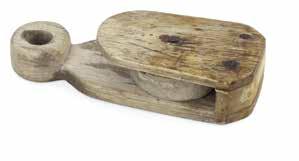
Mid-19th Century
Sheave with whalebone pin. Remainder of block with large copper pins. An exceptional example of a seldom-seen form. Length 7”. 600/900
Provenance: Eldred’s, The Marine Sale, July 20, 2012, Lot #566A.
800/1,200
Provenance: John
1,800/2,500
Provenance: Northeast Auctions, Portsmouth, New Hampshire,
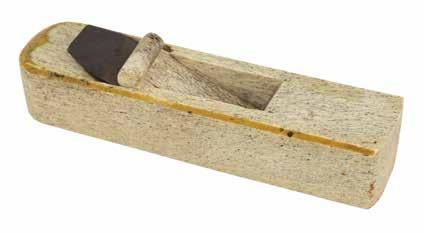
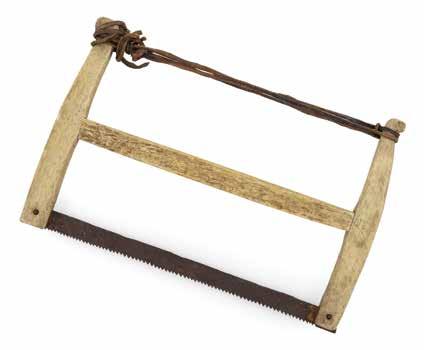
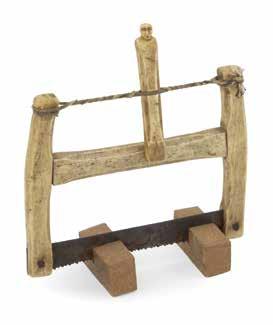
700/1,000
Provenance: Collection of Welles Henderson. John Rinaldi Nautical Antiques, Kennebunkport, Maine, 2011.
Illustrated: Jack Tar: A Sailor’s Life by J. Welles Henderson and Rodney P.
Provenance: Richard’s
Provenance: John
Provenance: John

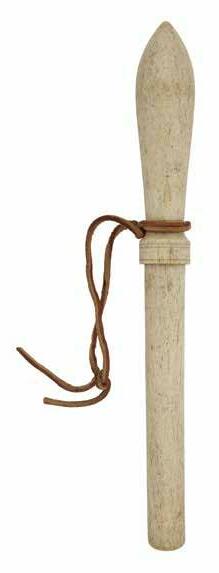
Provenance:

4162. WHALE IVORY AND WALNUT ROLLING PIN
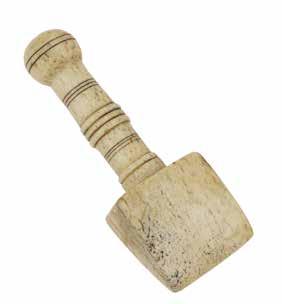

Mid-19th Century
Beautifully turned whale ivory acorn-form handles. Walnut roller. Length 16.75”. 800/1,200
4163. WHALEBONE CLOTHESPIN Second Half of the 19th Century Length 4.5”. 125/175
Provenance: Nina Hellman Antiques, Nantucket, Massachusetts, 2002.
4164. WHALEBONE SEAM RUBBER
Mid-19th Century
Nicely turned handle. Length 5.25”. 1,000/1,500
4165. TWO WHALEBONE ITEMS 19th Century
A fid, length 6.75”, and a billy club, length 10.5”. 500/700
4166. RARE BOTTLE OF "MOBY DICK SPERM OIL"

Late 19th/Early 20th Century
Original paper label depicts a sperm whale. Contains eight fluid ounces. Unopened. Height 7”. 300/500
Provenance: Nina Hellman Antiques, Nantucket, Massachusetts, 2006.
4167. PHOTOGRAPH OF AN INUIT FAMILY TAKEN ABOARD THE U.S.S. BEAR
Dated 1895
Signed illegibly and dated lower left. Framed 12” x 16”. 500/1,000
Provenance: William Reese Company, New Haven, Connecticut, 2015.

4168. PETRIFIED WHALEBONE AND WALRUS IVORY OOSIK
Late 19th Century
One end carved as a polar bear’s head, showing its teeth and black features. Polished tip at opposite end. Baleen spacers. Length 14”. 500/800
Provenance: Nina Hellman Antiques, Nantucket, Massachusetts, 2015.
4169. POLYCHROME SCRIMSHAW WHALEBONE AND WHALE IVORY SWIFT
Mid-19th Century
Turned whale ivory yarn cup, collars and adjustment knobs, the yarn cup and an adjustment knob engraved with vines of red flowers. Simple cylindrical whalebone shaft. C-shaped whalebone clamp inlaid with abalone, tropical wood and metal pins. Adjustment screws also inlaid with metal pins. Whalebone cage. Yarn cup and clamp can be unscrewed. Length 25”. Cage diameter approx. 23”.
1,000/1,500
Provenance: Nina Hellman Antiques, Nantucket, Massachusetts, January 3, 2007. Includes a copy of the original sales receipt.

4170. DOUBLE WHALING JOURNAL FROM THE WHALESHIP HUDSON OF SAG HARBOR, NEW YORK
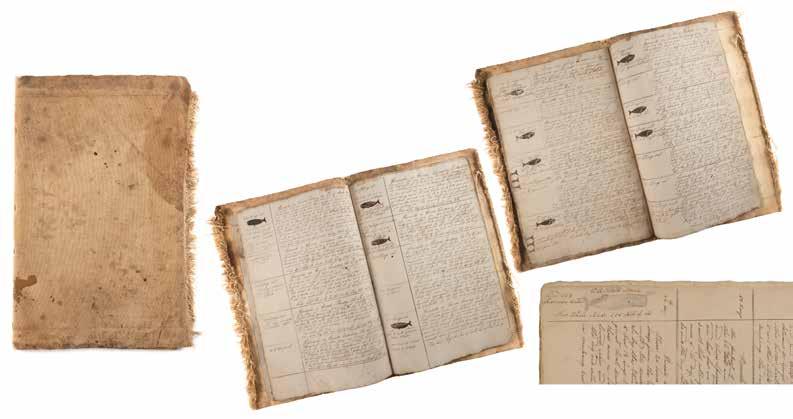
First voyage commenced May 27, 1835 and ended July 2, 1836. Last entry notated “Ship Voyage 13 Months 6 Days 1,400 Barrels Whale 520 of Sperm and 14,000 Pounds of Bone”. Includes approx. 28 whale stamps and drawings of whales. Second voyage commenced August 27, 1836 and ended April 9, 1837. Includes approx. 41 whale stamps. Both voyages with notations of Captain Henry Green making kills on whaleboats. Bound in sailcloth. Lot includes copies of several of the Hudson’s crew lists provided by Mystic Seaport. 22” x 14.5”.
5,000/8,000
Provenance: Northeast Auctions, Portsmouth, New Hampshire, 2007.
4171. CARVED WOODEN WHALING LOGBOOK TRIPLE STAMP
19th Century Stamps a whale’s tail, a ship and a sperm whale. Carved letters on one side. Length 4”.
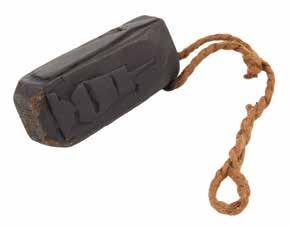
1,200/1,800
Provenance: Paul Madden Antiques, Sandwich, Massachusetts, 2004.
4172. ACCOUNTING BOOK OF THE WHALING BARK
MARY FRAZIER
Manuscript officer’s and crew account book for the bark’s 18671871 whaling voyage to the Pacific under Thomas F. Caswell, master. Mostly details slop chest purchases and cash advances, though it also mentions the loss of third made John George and his whaleboat crew during an encounter with a whale in December 1868, the sale aboard ship of some of the drowned crew’s belongings, and the return of George’s sea chest and its contents to his father in the Azores. Also contains a fairly substantial list of crew who deserted. 13.25” x 18.25”. 300/400
Provenance: Nina Hellman Antiques, Nantucket, Massachusetts, 2008.
Issued July 19, 1842 for James Thompson by W.H. Taylor, Deputy Collector of the District of New Bedford, Massachusetts. Framed 13.75” x 8.75”. 300/500
Impresses “Sons of Temperance Nantucket” surrounding a ship. Diameter 1.5”. 800/1,200
Provenance: Paul Madden Antiques, Sandwich, Massachusetts, 2014.
Last Quarter of the 19th Century Beautiful carving of an attractive woman with a red flower in her black hair, long eyelashes, a ruffled collar, and a red and green dress. Height approx. 27”. 12,000/15,000
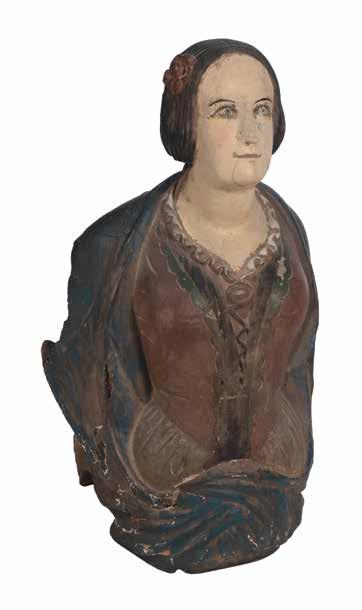
19th Century
Gilt relief-carved floral, foliate and scroll design and rope border on a black painted ground. Painted inscription on reverse. Height 7.25”. Length 56.25”. 1,500/2,500

New York, 1858-1943
The Charles W. Morgan at sea. Signed and dated lower right “F. Leo Hunter 1925”. Oil on canvas, 16” x 20”. Framed 20” x 24”. 1,000/2,500
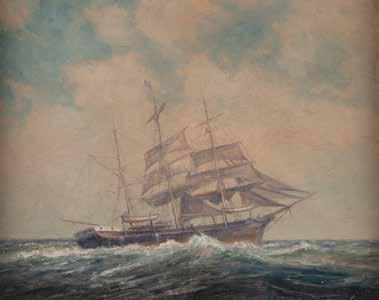
Provenance:
Paul Madden Antiques, Sandwich, Massachusetts, 2004.
Massachusetts/Rhode Island/Scotland, 1867-1951
Portrait of the whaling schooner A.E. Whyland of New Bedford. Signed lower right “James Cree”. Ship identified verso. Oil on canvas, 12” x 16”. Framed 19” x 22”. 1,000/1,500
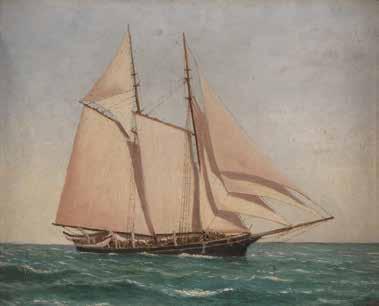
Made for New Bedford’s semi-centennial. Depicts a whaling scene, the waterfront and “New Bedford Semi-Centennial Souvenir 1847 1897”. Length 2.5”. 250/350
4180.
Marked on back “P.F. Gay No.
Mass. Copyrighted 1932”. Height 10.5”. Length 15”. 300/500
4182
4181. RARE WROUGHT IRON HARPOON




Mid-19th Century
By J. Tinkham. Stamped on head. Unusual toggle with arrowtype end. Length 34.5”. 3,000/4,000
Provenance: Purportedly purchased from Clifford Ashley.
4182. WROUGHT IRON TOGGLE HEAD HARPOON
Mid-19th Century Stamped on head “[…] & WEB.”. Length 36.75”. 1,200/1,500
4183. RARE SINGLE FLUE HARPOON
Mid-19th Century
By J. Tinkham. Stamped on upper shaft. Length 34.75”. 2,500/3,500
4184. WROUGHT IRON TEMPLE-TYPE HARPOON
Mid-19th Century
Traces of marks on both sides of toggle head. Length 40”. 800/1,200
4185. TWO-HANDLED CAST STEEL BLUBBER MINCING BLADE

Mid-19th Century Stamped “Brades Co. Cast Steel 5”. Turned wooden handles. Length 36.25”. 500/800
4186. BLUBBER SPADE WITH UNUSUAL CURVED BLADE
19th Century Wooden pole. Length 72.5”. 700/1,000

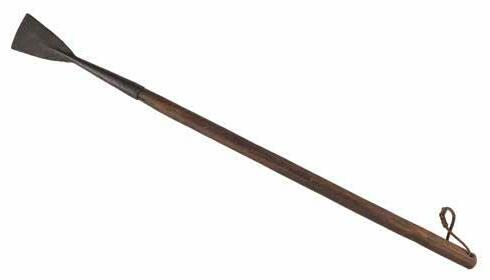
4187. BLUBBER SPADE
19th Century Octagonal wooden handle. Unmarked. Length 51.5”. 500/800
4188. WROUGHT IRON BLUBBER SPADE
Mid-19th Century Stamped “Snow & Co”. Length 17.5”. 400/600
19th
Provenance:
Purportedly from Paul Vardeman, Kansas City, Missouri.
19th Century
One side with “Frank E. Brown, Manufacturer, ... New Bedford, Mass., U.S.A.” above images, prices and text descriptions of various implements. Opposite side with images, short descriptions and prices above “Frank E. Brown, Successor to Eben Pierce, Manufacturer of the Pierce Bomb Lances, Whaling Guns, &c., ...”. Framed 14.75” x 6.5”. 300/500
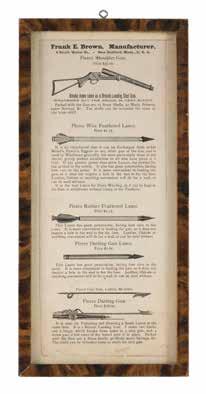
19th
It was believed the oar in the normal position would interfere with the line as it ran out of the tub, so once a whale had been harpooned and the “stern all” order was given, the tub oarsman would use the upper tier of the oarlock. Notably, he would have to stand up in the whaleboat to row when
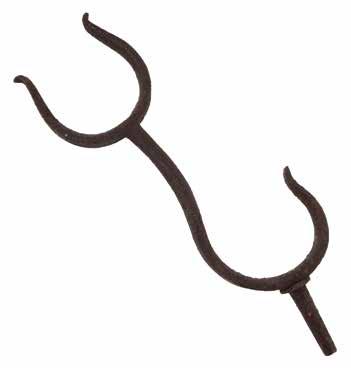
800/1,200
Provenance:
Nina Hellman
A wooden sheath for a lance and a sailcloth-covered wooden sheath for a toggle harpoon. Lengths 8” and 10.25”. 400/800

Stamped for maker “A.D. Richmond & Co New Bedford”. On a contemporary mount. Bell height 6.75”. Diameter of base 6.75”. 1,000/1,500
Provenance: Private Collection, Florida. Ryan M. Cooper, Yarmouth Port, Massachusetts, 2010.
The watch bell, the smaller of two bells on a whaleship, was mounted from the ceiling of the after house. The helmsman, keeping track of the sailors’ watches, would strike the bell between one and eight times.
Period wood pole. Length approx. 96”. Strainer diameter approx. 18”. 500/1,000
 4192. BRONZE WHALESHIP’S WATCH BELL
4192. BRONZE WHALESHIP’S WATCH BELL
Late 19th Century
Hinged barbs. Detachable shank and head. According to the consignor, only one other harpoon of this kind has been identified and is in the Mystic Seaport Collection. Length 33.25”.

1,500/2,500
Provenance: Paul Vardeman, Kansas City, Missouri.
Illustrated: Whaling Harpoons, Whaling Guns and Related Weapons and Tools by Arthur Credland, Second Supplementary Volume, 2016.
Marked
shaft “R Brown Patd 1850” for Robert Brown of New London, Connecticut. Hinged barbs at side. Length 33.5”. 700/1,000
Century
Mounted on its original pole and complete with original harpoon and bomb lance. Harpoon made by Macy and stamped “LB” for larboard boat and with vessel markings “BK SPM” or “BK SDM”, possibly for the bark Sunbeam. Brass bomb lance marked “Pierce”. Length 84.5”.


3,000/4,000
Provenance: Maritime Antiques, Inc., York, Maine, 2010.
Provenance: Nina Hellman Antiques, Nantucket, Massachusetts, 2010.
French/English, Early 19th Century
Unique form, probably a commissioned or presentation piece, with four drawers instead of the traditional sliding or hinged lid. Corner posts with gryphon-form finials and carved feet. Blind-fret foliate and scroll carvings with gilt foil and green paper backing on top, sides and drawer fronts, including a monogram at the center of the top. Underside with painting on paper “La Fortune”, depicting a classical woman with butterfly wings, a cornucopia and a winged wheel, riding atop puffy clouds over a landscape. Drawers with turned bone knobs and red paper liners. Contains approx. 55 engraved and colored dominoes, two bone dice, and 48 polychrome bone playing cards, notable for having a blue geometric design on the reverses. Height 4”. Length 8.25”. Width 3.75”. 4,000/6,000
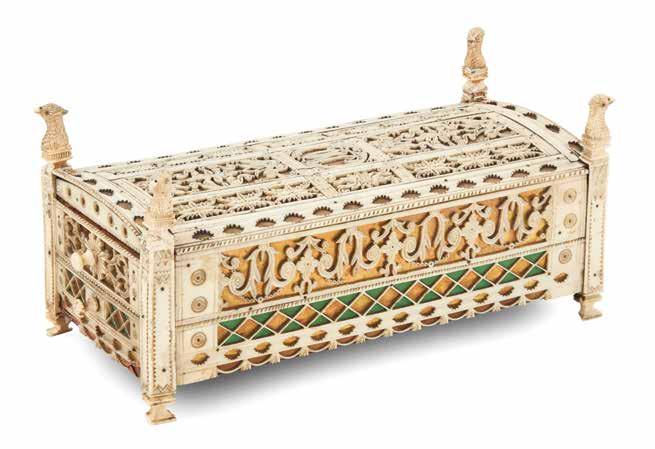
French/English, Early 19th Century
Cover with relief-carved bust portrait of a woman flanked by floral designs. Reverse with repetitive carving but of a gentleman. Ends carved with floral and foliate designs. Length 4”. Width 1.75”. 400/600
French/English, Early 19th Century

Twin hinged domed tops with tiny knobs and carved, pierced and engraved heart, club, filigree and bull’s-eye designs. Domes open to reveal a polychrome sliding cover depicting two figures at the flag-draped tomb of “Lord Nelson”, with the masts and flags of a ship visible behind the British flags and red drapery that frames the scene. Protruding lip with cribbage board track. Corner posts with shaped finials and feet. Contains approx. four cribbage pegs, two dice, 53 engraved and colored dominoes, and a skittles set of one ball and nine pins. Height 2.5”. Length 10.25”. Width 4.5”.
2,500/3,500
French/English, Early 19th Century
Unusual size and shape. Twin hinged domed tops with tiny knobs and open-carved lovebird, diamond and floriform designs. Classical-style architectural panels at head and foot of domes. Protruding lip with cribbage board track. Three panels slide open to reveal fitted interior. Corner posts with shaped finials and feet. Contains four cribbage pegs, three dice, and carved and engraved dominoes. Handwritten paper label on underside indicates the box was made at Porchester (probably Portchester) Castle “about the year 1809”, made with mutton bones saved from soup and sold “through the bars of their cells”. Height 2.75”. Length 5.5”. Width 5.5”. 800/1,200
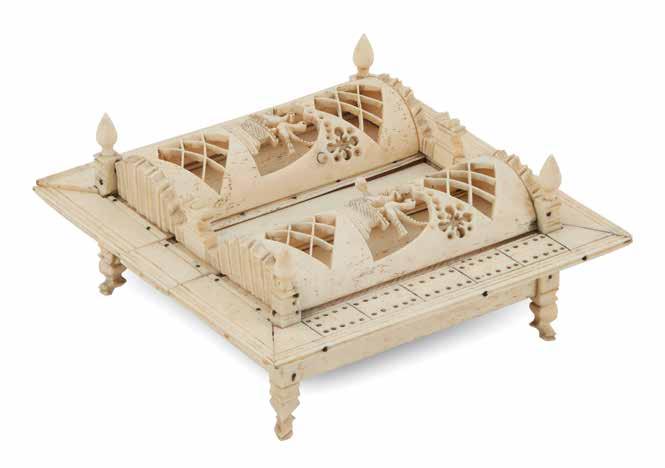
French/English, 19th Century
Squared C-shaped wooden clamp with bone veneer, the panels engraved and pierced with foliate and geometric designs. Equipped with a wooden adjustment screw, two bone spool holders, a bone threader and a round cavity, probably for a pincushion. Length approx. 6.5”. 200/400
French/English, Early 19th Century
Triangular sliding cover with watercolor panels under glass. Additional watercolor panels under glass around perimeter of box, for a total of 14. Cribbage board along perimeter of top. Carved swag and tassel design along lower edge of box. Corner posts with carved finials and feet. Contains approx. 55 engraved and colored dominoes, two bone dice, and 52 polychrome bone playing cards, believed to be a full set. Height 3.5”. Length 9.25”. Width 4”. 2,500/3,500
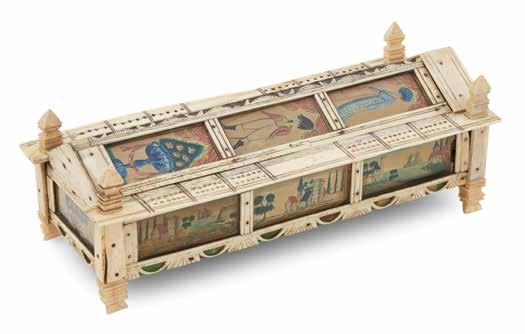
Early 19th Century
Pincushion top. Sides with engraved foliate designs and elaborate pierced and carved floral panels backed with mica. Height 4.25”. Width 7.5”. Depth 6”. 1,000/1,500
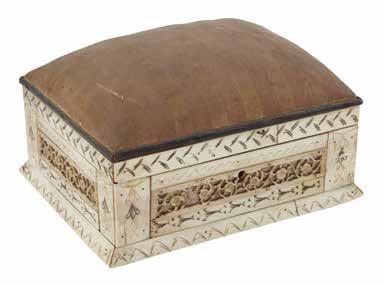
French/English, Early 19th Century
Finely carved and detailed mechanized two-tier model with traces of polychroming. Turning the crank animates the three female figures, the spinning wheel and the windmill on the upper platform. One of the women is standing with her spotted dog on a leash. The other two women, both in the typical large bonnets, are seated in high-back stools, one rocking a baby and the other working the spinning wheel. Lower platform with hand crank, three pierced wheels, etc. Platforms joined by turned columns and are raised on a turned foot.
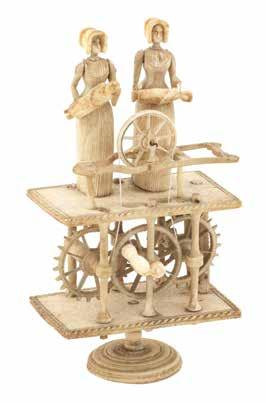

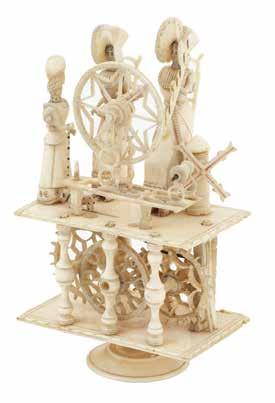
Height 5.25”. Width 3”. Depth 2”. In contemporary oval boxwood box. 2,500/3,500
French/English, Early 19th Century
Mechanized model of typical form, with a windmill and a lady seated at a spinning wheel on the upper platform and a hand crank and two wheels on the lower platform. Lady with the traditional large bonnet, charming polychrome facial details, a frilly collar, a pink polka-dotted skirt and a matching flag mounted on the back of her stool. Platforms joined by turned columns and are raised on a turned foot. Includes original wooden box with ink inscription, possibly “Jenny”, on sliding lid. Carving height 5.5”. Width 2.5”. Depth 1.5”. Box height 3”. Length 6.5”. 1,800/2,500
French/English,
children.
19th

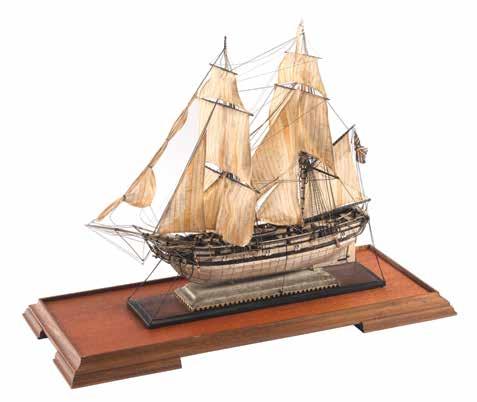 By Dan Matthews for Langford Marine Antiques, London.
By Dan Matthews for Langford Marine Antiques, London.
Hull built up from the solid, the hull and decks planked in bone, and with a painted black waist, the head rails supporting a figurehead, a simple transom with the name “Lee” hand-lettered, the hull pierced and rigged for 16 cannons, the deck detailed with pin and fife rails, bit post, anchor winch, hatches, ships boat over the open waist, bilge pump, tiller, skylight, flag, etc. Rigged as a brig, with bowsprit, masts, spars, trees, tops, standing and running rigging, and a suit of sails. Displayed on a raised plinth covered in green velour within a mahogany and glass case. Case height 20.5”. Length 24”. Width 10.25”. 3,000/5,000
Probably English, 19th Century
Hull and decks planked in bone over a solid mold, fitted with stem, keel and rudder, the waterline and sheer planked in lignum vitae, the hull pierced with 24 gunports with cannons and gunport lids, the decks detailed with anchors, boat, open waist with ladder, windlass, double ship’s wheel, poop deck, companionway, etc. Rigged with a bowsprit, three masts with cross spars, standing and running rigging, etc. Displayed on a heavy mahogany cradle base. Height on base 16”. Length 19.5”. Width 6.5”. 800/1,200
Provenance: The Stephen D. Weinroth Collection.
Mid-19th Century
Under old red paint with “LB”, for larboard boat, painted in red and white on the top. Iron straps. Period stopper. Height 16”. Diameter approx. 16.5”. 1,000/1,500
19th Century
Lettered “Brig Two Sisters, Letter Bag”. Flap with blue trim. Displayed on a contemporary rod. Height 17.5”. Width excluding rod 12.75”. 500/1,000
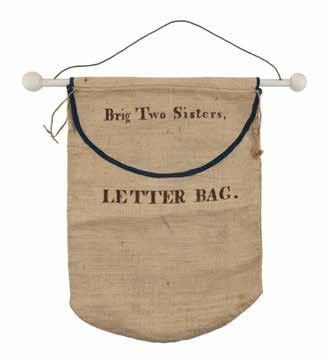
Circa 1820s
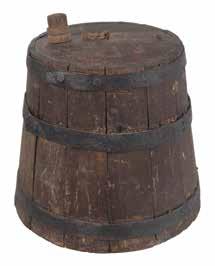
Murphey (or Murphy) was third mate on the voyage, which began September 4, 1820 when the Dauphin sailed from Nantucket. Written in verse. Clean and legible handwriting. Mentions the discovery and recovery of a whaleboat and two survivors from the whaleship Essex disaster and includes an early description of scrimshaw, from tools to “other trinkets for the girls”. 12” x 8”. 500/1,000 4212
BUCHANAN
Dated April 30, 1860
Signed right center edge. 15.75” x 20” sight. Framed 21.75” x 25.5”. 800/1,200
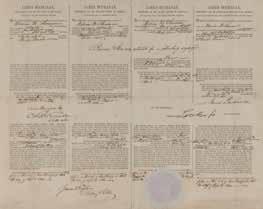

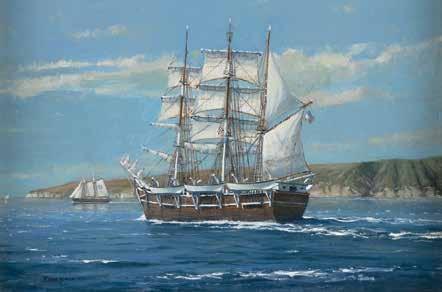
4217. CASED MODEL OF A WHALEBOAT 20th Century
Painted white with black gunnel. Detailed with sails, masts, boom, oars, etc. Case height 8”. Length 24”. Width 8”. 600/900
4218. WILLIAM BRADFORD
Massachusetts/California, 1823-1892
“Crushed by Icebergs”. Printed by Storch & Kramer, Berlin.
Titled on label verso. Housed in a wonderful nautical-theme carved frame. Chromolithograph, 19.875” x 33”. Framed 27.75” x 40.5”. 1,000/1,500

4219. BENTON MURDOCH SPRUANCE
Pennsylvania, 1904-1967
“Moby Dick The Passion of Ahab” portfolio of 26 lithographs. Published by Barre Publishers, Barre, Massachusetts, 1968. First edition, limited to 450. Text by Lawrence Thompson. Blue clamshell box with gilt lettering. Each sheet 22” x 16”.
400/600
4220. * POLYCHROME ENGRAVED WHALE’S TOOTH BY ROBERT SPRING
20th Century
Depicts a ship at sea flying an American flag and pennant. Signed and dated on reverse “R. Spring 74”. Length 4.75”. 400/600
4221. * TWO ENGRAVED WHALE’S TEETH BY ROBERT SPRING
20th Century
Executed in sepia tones. One depicts a whaleboat and the other crossed whaling implements. Both signed “R Spring” and dated “76” or “77” on reverse. Lengths 4.5” and 5”. 400/600
4222. * POLISHED WHALE’S TOOTH Length 7.75”. 600/900
IMPORTANT NOTE
Per Federal Regulation, items marked with an asterisk (*) may only be purchased by a Massachusetts resident and will not be shipped out of state.
Wisconsin/Nova
Whaler in the Arctic. Signed lower left “G”. Pencil on paper, 12” x 9.75” sight. Framed 17.75” x 15.75”. 500/1,000

Wisconsin/Nova
“Dutch Whaling Flutte from the Kendall Museum’s Model ...”. Signed lower left “G”. Titled on label verso. Watercolor on paper, 12.75” x 9”. Framed 18.25” x 15.75”. 500/1,000
19th Century
Together with an unusual whalebone, whale ivory and metal hinge, purpose unknown. One parallel ruler with mahogany straight edges and whale ivory caps and hinges. Other with ebony straight edges and whalebone hinges. Lengths from 7.5” to 13.5”. 300/500
19th Century
Whale ivory L-shaped handle, the end carved and engraved as an eagle’s head, with a slightly open beak, lively eyes and rows of feathers. Eagle terminates in incised banding, one band engraved with a four-petal clover design. Whalebone shaft with two sections of spiral carvings above a tapered cylinder. The upper spiral carving is narrow and runs counterclockwise, while the lower section is wider and runs clockwise. Both sections with ink highlights to accentuate the spirals. Length 30”.
3,000/5,000

4227. CANE WITH RELIEF-CARVED WHALEBONE HANDLE

19th Century
L-shaped handle carved with phrygian cap. Wooden shaft with steel ferrule. Length 34.75”. 400/600
4228. TWO INUIT CARVED CANES
1) Whale ivory handle carved in the form of a walrus. Five-section vertebrae throat. Wooden shaft with metal ferrule. Length 33.5”.
2) Walrus ivory handle carved in the form of a polar bear. Bone throat carved in a pattern of alternating nodules. Wooden shaft with brass collar and metal ferrule. Length 37.75”. 600/800
4229. WHALE IVORY AND WHALEBONE CLENCHED FIST WALKING STICK
19th Century
Whale ivory handle carved as a clenched right fist. Whalebone shaft with rope twist carving down nearly the entire length. Length 30.25”. 1,200/1,800
4230. MARINE IVORY AND WOOD CANE WITH CLENCHED FIST HANDLE

19th Century
Boldly proportioned handle carved as a clenched right fist and shirt cuff. Tapered cylindrical shaft comprised of alternating segments of hardwood and ivory, the top two sections ringturned. Metal ferrule. Length 33.5”. 1,000/2,000
19th Century
Beautifully detailed.
500/1,000
19th/20th Century
Commemorating the schooner A.T. Gifford, the last American schoonerrigged whaleship to cruise Hudson Bay. Relief-carved with three stars and “Sch. A.T. Gifford” within a cloud-like form. Relief-carved cribbage track. Three baluster legs. Screw-on knob at base encloses a peg compartment. Length 14.5”. 1,000/1,500

The A.T. Gifford was built in 1883 in Essex, Massachusetts, and she had home ports of Gloucester, Massachusetts and New York City. She caught fire and sank in 1915 and none of the crew survived the disaster.
Mid-19th Century

Probably a porpoise or blackfish jaw. “Ship Burlington” below a scandalous view of a woman smoking and holding up her skirt to reveal her ankles and feet. “Revista Popular Illustrada Julho de 1859” (Popular Illustrated Magazine July 1859) below two well-dressed women engaged in conversation. Length 20.25”. 800/1,200
19th Century
Knob end relief-carved with a crown and “John Gifford 1842” in Gothic lettering. Conical shaft with ribbed spiral carving above a relief-carved band depicting an anchor, a Britishflagged ship and a fish. Length 16.75”. 4,000/6,000

19th Century
Lid with wood top, baleen sides and a color lithograph mounted under glass depicting a woman’s head, marked lower right “Memory”. Box with baleen sides and wood base panel. Baleen sides secured with riveted and serrated fingers, the lid with one finger and the box with three. Height 3.75”. Diameter 5.5”.
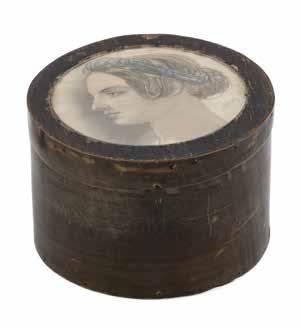
19th Century
700/1,000
Coconut shell bowl engraved with assorted hex signs, a spouting sperm whale, a sailboat and a three-masted vessel. Wooden throughtenoned handle with an incised and faceted whale ivory terminal and medial joint. Length 15.5”. 500/800

Mid-19th Century
Mounted as a powder flask with brass cap at base. Leafy vine frames images of a floral sprig, a three-masted vessel flying a striped flag at the stern, and a scene of a crown above Britannia wrapped in a British ensign standing beside an anchor and pointing toward a distant ship. Checkerboard pattern at very tip. Total length 4.5”. 2,500/3,500
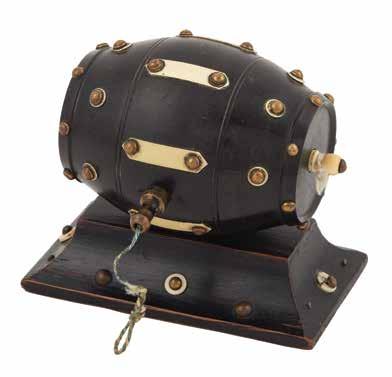
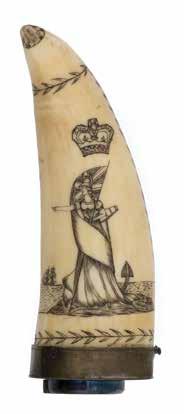
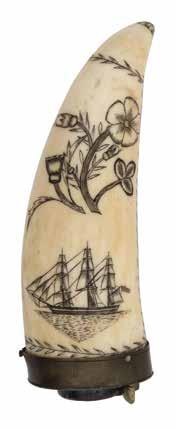
Century
In ebony and ivory with brass nailhead details. Square flared base. Screw top reveals a spindle on the interior. Height 3.5”. Width 4”. Depth 3”. 400/600
Mid-19th Century
Vignettes of trees, geometric designs and a house. Scrimshaw done in a fashion that creates a well-defined image on the baleen. Length 13”. Width 1.5”. 500/1,000
Circa 1850
Obverse depicts a fine three-quarter-length portrait of a woman in fashionable clothing, identified as “Lucy Purdon” in script lettering below. The use of a woman’s full name is very rare in scrimshaw; it was far more customary to use just a first name or initials. Reverse depicts an urn set on a footed plinth, the body of the urn with scene of two women in a landscape, and the square base with a shield resembling the Australian shield and figures of women at the corners. Pinprick transfer execution. Length 4.75”. With wooden stand. Total height 6”. 800/1,000


Provenance: William J. Boylhart Collection.
This tooth is believed to have been presented to Lucy Purdon of the whaling and shipbuilding Purdon family of Hobart, Tasmania.
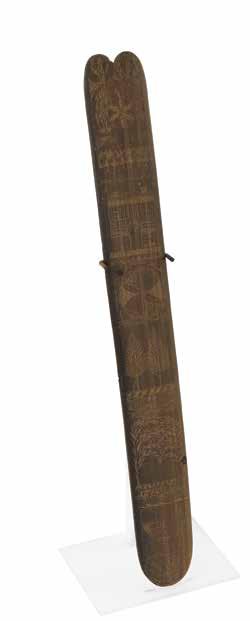
Provenance: The Lloyd Collection, 1986 (retains Lloyd Collection sticker #253).
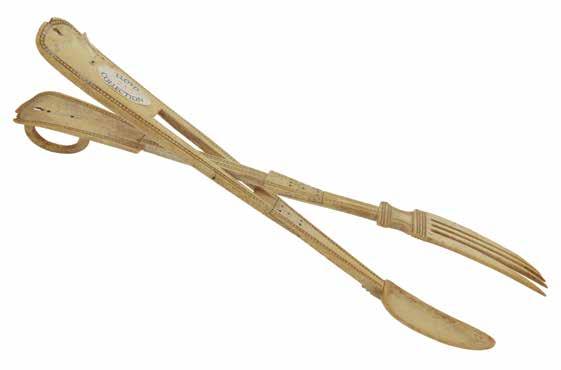
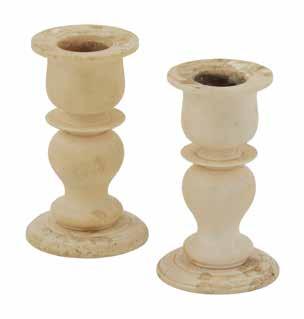
19th Century
Depicts a couple holding hands, possibly a Renaissance bride and groom. “Forget me not” in faint script lettering above title. Length 4.5”. 400/600
19th Century
Depicts a gentleman hunter, an American-flagged ship, a Native American and a woman wearing a straw hat. Tendril border around the perimeter of the busk and between some of the vignettes. Charmingly detailed, including the design of the woman’s dress, which has heart shapes on the bodice and a tendril pattern on the skirt that matches the border. Length 12”. On metal stand. 500/800

19th Century
Several unusual vignettes cover nearly the entire length, separated and surrounded by line, pique and sawtooth borders, and interspersed with foliate sprigs. Depicts a five-pointed star within a circle, a heart containing floral sprigs, a pendulum clock flanked by trees, a Masonic temple, a figural monument framed by drapes and tassels, a basket of flowers, and a view of a ship as viewed through architectural arches, one topped with a British flag. Busk lobed at top and canted at base. Length 14.5”. 800/1,200

19th
400/600
19th Century
Obverse depicts a naval battle between an American and a dismasted British ship, both engulfed in smoke and flying colored flags and streamers. Some pinpoint execution. Reverse depicts a ship on a dead run. On both sides the water is depicted as a defined oval. Rich patina.
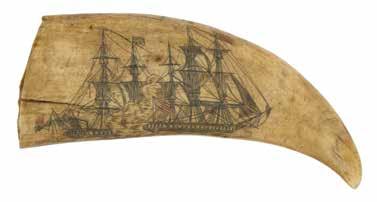
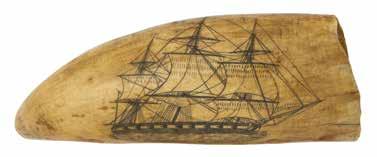
19th Century
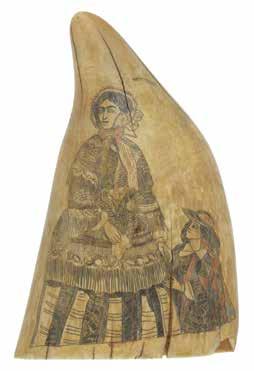
Obverse depicts a horse and rider, possibly a woman riding sidesaddle. Reverse depicts a mother holding her daughter’s hand. Each figure in elaborate dress with red, blue, green and yellow components. Length 6.25”. 2,000/3,000

19th Century
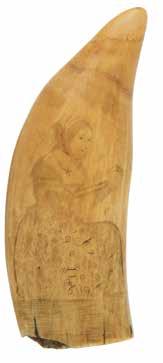
Napoleon III wears red epaulets and holds his hat at his side. Napoleon in a long blue coat. Other colored components on both teeth. Lengths 7”. On wooden stands. Total heights approx.
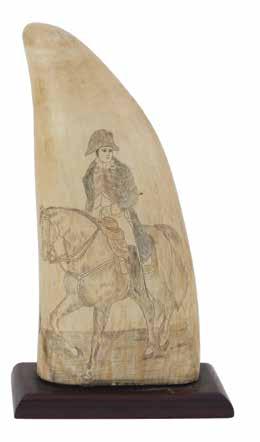
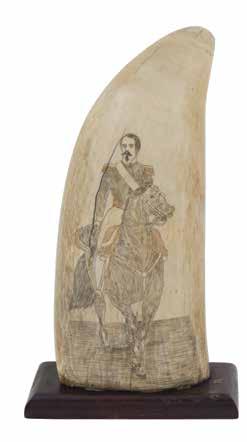
Obverse with a traditional portrait of Alwilda, sourced from the 19th Century volume The Pirates Own Book ..., who is wearing a hat and tunic, has a pistol tucked into the sash at her waist and holds aloft a sword. Reverse depicts a woman with her hands clasped as if in prayer, possibly Alwilda in traditional Scandinavian dress. Faint red highlights on both sides. Deep patina. Length 6.5”. 2,500/3,500

Two latitudinal scenes wrap around the circumference of the tooth. The upper scene depicts a stern-view portrait of a whaleship and whale processing, showing cutting in, with a whale drawn up alongside the ship and whalemen on the cutting stage, and trying out, with smoke billowing from the tryworks. Lower scene depicts a whale capture, with a whaleship, a large pod of whales, and several whaleboats, one of which is stoved and another with the harpooner at the bow poised to strike. Ships flying assorted flags and pennants, notably a house flag with a white field bisected by a thick horizontal band. Length 8.25”. Includes wood stand. Height on stand 11.25”. 14,000/18,000
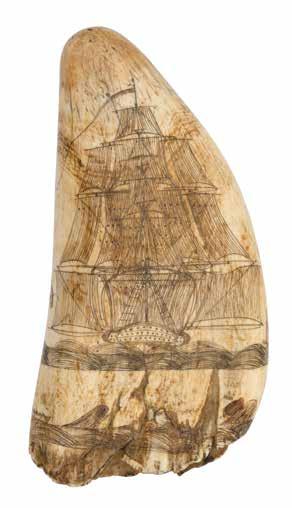
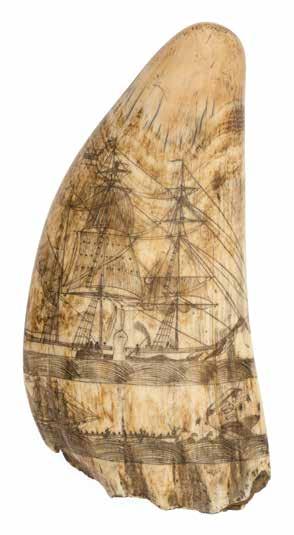
4253. POLYCHROME SCRIMSHAW WHALE’S TOOTH WITH SHIP PORTRAITS AND TOASTS, POSSIBLY BY THE NAVAL MONUMENT ENGRAVER
Mid-19th Century
Three ship portraits wrap around the circumference, all three ships flying long red streamers and one flying an American flag. Below the portraits, in serifed lettering, are the toasts “May the Single Be Married and Married Happy.” and “May the Smiles of Conjugal Felicity Compensate the Frowns of Foetune [sic].”, both toasts contained in the 1791 volume The Toast Master Being a Genteel Collection of Sentiments & Toasts .... Although the ship portraits don’t appear to be exact copies of plates from Abel Bowen’s Naval Monument, they, as well as the lettering, are executed in a very similar style to known Naval Monument Engraver examples. On footed wooden stand. Height on stand 7”.
4254. SCRIMSHAW WHALE’S TOOTH WITH PRESENTATION INSCRIPTION
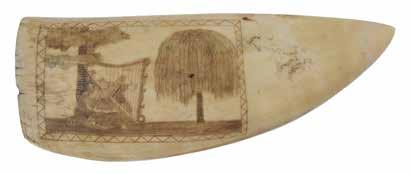

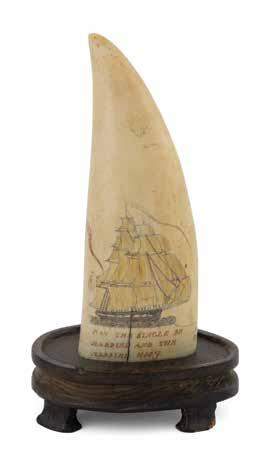
Circa 1830
2,000/3,000
“Presented by LWM to his Mother” on edge in fine elegant lettering. Obverse depicts a column within an enclosed courtyard surrounded by buildings. Reverse depicts King David playing his harp in the shade of trees. Scant traces of polychroming. Scenes with geometric borders. Length 7”.
2,500/3,500
Provenance: Barbara Johnson Whaling Collection, Sotheby’s New York, December 16-17, 1983, Lot #640.
Mid-19th Century

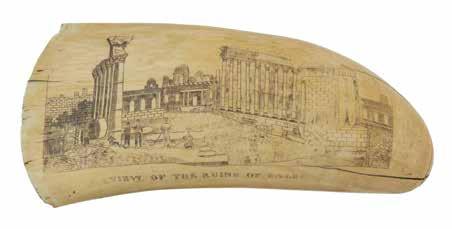
Obverse
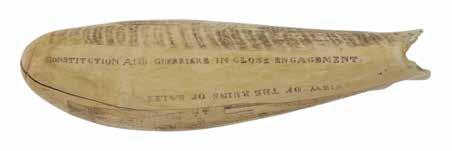
Mid-19th Century
Obverses depict arches of stars over spread-wing eagles grasping olive branches and arrows in their talons. One eagle clutches an “E. Pluribus. Unum.” banner in its beak and hovers over a crossed American ensign and flag. Other eagle hovers over a Liberty shield, an olive branch, arrows and an “E. Pluribus. Unum.” banner. Reverses depict whaling scenes, one showing a whaleship with whaleboats in the water in pursuit of a whale, and the other a whaleship cutting in. Both ships flying large American flags off the stern. Lengths 6.5”. Affixed to wooden bases. Heights on bases 7.5”. 8,000/12,000
19th Century
Handle with band of circle-in-square and swirled ribbed carvings. Blade apparently unmarked. Sheath with silver metal band to suspend a leather holder, and pique, drapery and opposing hearts carvings. Not believed to have been crafted together, but knife fits nicely in sheath. Total length of knife in sheath 9.5”. Blade length 4.125”. Blade width .625”. Blade thickness approx. .125”. 500/700


19th Century


Probably a shoe hook. Terminal in the form of a bird with stippled eyes and stippled embellishments on one side. Architectural shaft with ball-in-cage. Terminal broken off. Length approx. 8”. 150/250
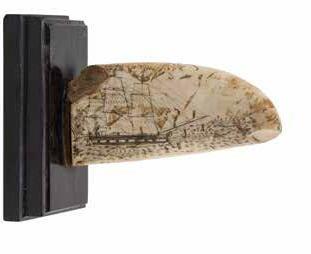
4259. POLYCHROME SCRIMSHAW WHALE’S TOOTH WITH EAGLE AND LADY LIBERTY
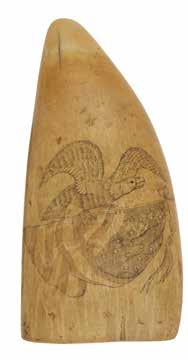
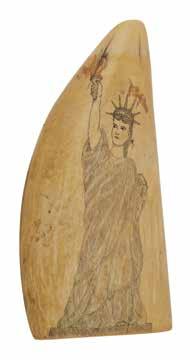
Late 19th Century
Obverse depicts an eagle perched on a flagpole with a spearpoint finial, a streamer tied in a bow just below the finial and a loosely furled 18-star American flag. Reverse depicts Lady Liberty modeled after the Statue of Liberty, holding aloft a flaming torch in one hand and an inscribed tablet in the other, and wearing a crown, robes and sandals. Length 6”.
4260. CARVED BONE MODEL OF A WHALESHIP

19th Century
By Captain Elhy F. Turner, possibly of the Charles W. Morgan. Hull planked in bone with applied keel, stem and rudder post, and an ebony waist. Bone-planked decks detailed with anchor davits, anchors, anchor windlass, whaleback, companionway, bit posts, tryworks, cutting-in platform, whaleboats on davits, companionways, wheel, etc. Rigged as a three-masted bark, with bowsprit, three masts, cross spars, standing and running rigging. Displayed on a pair of keel blocks on a black felt base within a domed glass case with black base. Case height 11.25”. Length 11.5”. Width 9.75”. 2,500/3,500
4261. ROGER MITCHELL
Massachusetts, Contemporary
Display of five carved and painted wooden whales. Each species with an identifying placard. Backboard with rope-carved border. Signed in ink on reverse “R. Mitchell”. Backboard 28” x 11”. 300/500
4262. RICHARD VAN WICKLEN “WICK” AHRENS
Vermont, 1944-2016
Carved wooden sperm whale plaque painted black and white. Signed and dated verso “Wick Ahrens ‘98”. Height 8”. Length 26.5”. 1,000/1,500


4263. RICHARD VAN WICKLEN “WICK” AHRENS
Vermont, 1944-2016
Carved and painted wooden bottlenose dolphin plaque. Signed and dated on back “Wick Ahrens ‘98”. Height 9”. Length 26”. 800/1,200
4264. ROGER MITCHELL
Massachusetts, Contemporary
Carved and painted wooden humpback whale. Carved signature on reverse “R Mitchell”. Length 39”. 300/500
4265. ROGER MITCHELL
Massachusetts, Contemporary
Carved and painted wooden narwhal with glass eye. Mounted on a brown-painted backboard. Carved signature on reverse “R Mitchell”. Backboard 7” x 28”. 300/400
By Mark A. Sutherland (b. 1954). Hull painted white with a black rail and blue-gray interior. Detailed with floorboards, thwarts, centerboard trunk, stepped mast with partners, oars, harpoons, buckets, coils of line, etc. Rigged with a cotton sail with panel seams drawn in. Displayed on a pair of turned brass pedestals within a glass case with a cherry wood base. Case height 8”. Length 9.25”. Width 3.5”. 700/1,000
20th Century
Near to scale model of the whaleship Carlottah of Greenport, Long Island, New York.

24”. Length 28.5”. Width 11”. 500/1,000
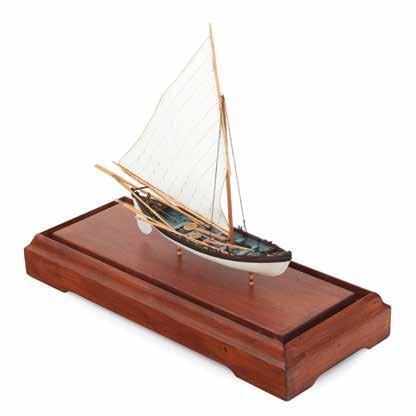
19th Century
Three large neoclassical stone buildings, each finely detailed with columns, triangular pediments, parapets, grand staircases, fences, etc. Left and right buildings flying swallowtail flags with central crosses. Center building’s staircase flanked by a palladian motif. Laurel leaf vines at ends. Panel canted at one end and curved at the other. Length 14.75”. 1,000/1,500

Late 19th Century

Three vignettes of buildings exhibiting typical Russian architectural traits including domes, towers, spires, columns, etc., some topped with crosses, flags or streamers. One spire in the lower vignette appears to be topped with a large bird. Executed in sepia, black and rich black. Handwritten label verso “Russia - C.H. Brewer ...”. Length 13”. 500/1,000
19th Century
Subtly engraved “Ellis” amidst a leafy green vine bearing different types of red and brown flower blossoms. Double line and green diamond border around perimeter. Length 13.75”. 800/1,200

19th Century
Pistol
19th Century
Looped serpent with elongated mouth and red eyes, the head supported by a brace. Contrasting bands at the joint between the serpent and the square shaft. Fluted wheel. Warm patina. Length 6.75”.
Circa 1850
Architectural shaft, fluted on the underside, grasped by a well-detailed hand. Wonderful anatomical accuracy and tensity in the thumb, index and middle fingers outstretched along the shaft and the ring and little fingers curled toward the creased palm. Cuff with three metal “buttons”. Yoke with relief-carved leaf and star on each side. Fluted wheel. Rich patina. Length 6”. 2,000/3,000
Provenance:
Barbara Johnson Whaling Collection, Sotheby’s New York, December 16-17, 1983, Lot #477.
Mid-19th Century
Whale or walrus ivory. Teardrop-shaped handle, the edges and points notably sharp, with a large open heart and a diamond. Stepped architectural design at base of yoke. Fluted wheel. Length 6.25”.

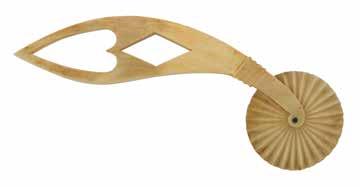
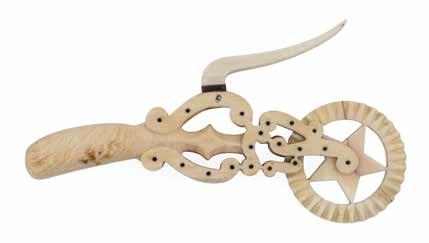
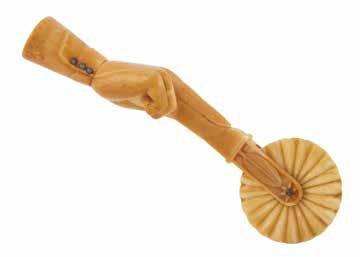
4275.
19th Century
4276.
4277.
Handle carved in the form of a lady’s leg and boot, with a central baleen “garter”. Elaborate mount for three-tine fork and wheel carved as a series of conjoined scrolls. Fork mount broken off but present, though a small section may be missing. Fluted wheel with pierced tetraskele. Swinging bail hanging loop at end of handle. Length 8”.
300/500
A similar example, from the Collection of Sam and Donna McDowell, was sold at Eldred’s, The Marine Sale, July 25, 2019, Lot #225.
19th Century
Engraved “S.A.B” in script pinpoint lettering below knop. Rounded knop with holes on both sides but not throughpierced. One-piece handle and yoke with stepped, fluted and ribbed carvings on top and underside, and a central bulbous section with pierced diamonds on all four sides. Fluted wheel. Length 5.5”.
300/500
19th Century
1) Whalebone handle with spearpoint terminal, incised banding and quilted diamond carving. Horn bowl affixed to handle with pins. Length 9.5”.
2) Walrus tusk stem with medial contrasting band, probably exotic wood. Open heart-shaped terminal and bowl believed to be marine mammal ivory or bone. Length 14.5”. 250/350
20th Century
Depicts a headdress, five-pointed stars, Lady Liberty, a “In Union is Strength” banner, two spread-wing eagles, one with a “Liberty and Union One and Inseparable ...” banner, a bust portrait of Abraham Lincoln and a sheaf of wheat. Serrated border at base. Length 22.5”. * Per Federal Regulation, this item may only be purchased by a Massachusetts resident and will not be shipped out of state. 500/700
Provenance: Eldred’s, The Marine Sale, July 19, 2013, Lot #860.

4279.
Germany, Early 20th Century Decorative scrimshaw borders at the tip and base. Length 6”. 400/600
4280.

19th Century
Whale ivory barrel-form clamp, ring-turned yarn cup and adjustment collar, the collar with red incised banding. Clamp screw in whale ivory and adjustment screw in whalebone, both in the form of cubes. Wood shaft. Whalebone cage. Length 17.5”. 500/1,000
19th Century
Turned whale ivory chalice-form yarn cup, pagoda-form clamp, collars, adjustment knobs and screws, some components with red incised banding. Whalebone shaft and cage. Free-spinning serrated wheel, much like a crimper wheel, at top of shaft just below yarn cup. Length 14”. Cage diameter approx. 12.5”. 500/1,000
19th Century
A gentleman and a lady tend to a man who has apparently been shot in the chest, presumably the aftermath of a duel. The lady holds a bloodied handkerchief to his chest, and he holds a cross in his hand. At his side are a pitcher and basin, a gun, an apothecary box and a flag. Fine and detailed workmanship. Affixed to a tiered whale ivory stand. Height on stand 6.75”. 800/1,200
19th Century
One-piece construction, scrimshawed to resemble the covers and spine of a book and pierced with evenly spaced twin eyelets around the perimeter. Some lines deeply incised and filled with red sealing wax. Contains a blind-stamped leather-bound copy of History of the Bible (Buffalo, N.Y.: 1851). Length 2.25”. Width 1.5”. Depth 1.25”.
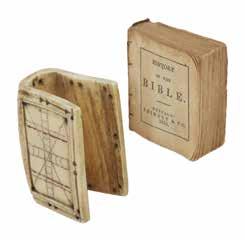
Illustrated: Scrimshaw and Scrimshanders, Whales and Whalemen by E. Norman Flayderman (New Milford, Ct.: N. Flayderman & Co., Inc., 1972), p. 234.
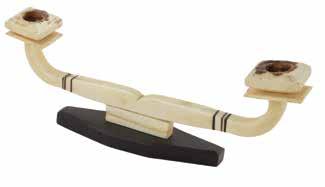


4285. WHALE IVORY-HANDLED CANE


Mid-19th Century
Pommel handle and bulbous throat with ring turnings and incised bands, each section with a distinctly different patina. Shell roundel inlaid at top of handle. Silver metal collar engraved “J. Prince Jr. Presented by W. Smith 1844”. Wood shaft with gold-tone metal ferrule. Length 31.75”. 200/300
4286. EXTRAORDINARY CLENCHED FIST CANE
Mid-19th Century
Whale ivory handle carved as a right fist tightly clenching a snake that coils about the hand and wrist. Snake with a tilted head, inlaid eyes and a flicked forked tongue. Tall whale ivory throat formed as two octagonal columns, one with Gothic arch panels and one fluted, with baleen and ring spacers. Slightly tapering figured wood shaft with inlaid ivory and mother-ofpearl diamonds just below the inlaid ivory and mother-of-pearl sawtooth border. Metal ferrule. Length 37.25”. 3,500/5,000
4287. WHALE IVORY AND WHALEBONE CANE



19th Century
Whale ivory handle carved as a Turk’s-head knot atop an urn, with a dark wood roundel inlaid to the top. Throat composed of alternating bands of whale ivory and a dark exotic wood. Whalebone shaft with spiral rope-twist carving tapering to a simple cylinder. Length 35.75”. 1,000/1,500
4288. CANE WITH TURK’S-HEAD HANDLE
19th Century
Whale ivory handle on an octagonal whalebone throat that ends in a scalloped edge. Baleen bands between handle and throat and throat and shaft. Tapered cylindrical whalebone shaft. Length 33.5”. 500/1,000
4289. CLENCHED FIST WALKING STICK
19th Century
Whale ivory handle and throat carved as a clenched right fist atop an octagonal throat carved with elongated hexagons, mimicking a shirt cuff. Fist clenches a fabric wrist cord. Waferlike octagonal silver metal collar. Octagonal whalebone shaft tapers to a cylinder; alternating faces of the octagon with an intaglio triangle. Length 36.5”. 500/700
4289
19th Century
Obverse with attractive portrait of a woman wearing a blue bow in her hair and a dress with a blue, black, red and yellow checkered skirt. Reverse depicts a ship with a red stripe and figurehead and a red, white and blue American flag flying from the stern. Length
19th Century
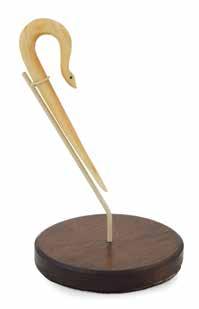
One tooth depicts a young woman hanging from a trapeze, and the other depicts a young man, possibly a clown, wearing a cap, striped short pants and clunky shoes, and resting his hands on his hips. Some traces of polychroming on his belt. Pinprick transfer execution. Lengths 7”. 1,800/2,500
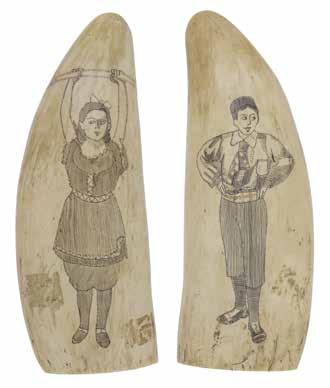
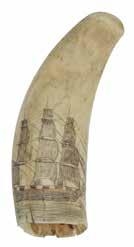
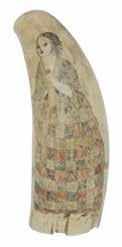
19th Century
1) Whalebone, engraved with hearts and triangles, one heart containing “Emma”. Length 12.25”.
2) Whalebone, engraved with a floral medallion and a bird. Length 14.25”.
3) Baleen, engraved with a heart, a building with a clock tower, a home, a ship portrait, two landscapes and a lighthouse. Length 13.25”.


4) Boxwood, carved with hex signs, a home, leafy branches, stars and other geometric designs. Length 12.75”. 300/500
19th Century
C-shaped wooden clamp with whalebone screw. Spool with wooden top and base, and bone or ivory dowels and shallow cup. Length 7.5”. 400/600
19th Century
Initialed in cartouche at base of reverse “DPS”. Obverse with a bust portrait of George Washington; a scene of angels on the dock, titled in banner below “Agriculture Commerce Arts Literature”; a city square scene with a monumental sculpture of a man on a rearing horse, probably Napoleon; an oversize peacock in a garden; Liberty holding aloft an American flag while riding on the back of an eagle; and a large monument topped with an angel on horseback and extensively embellished with cherubs, horses, classical maidens, a double-headed eagle, etc. Reverse with a scene of a woman mourning at a monument beneath a weeping willow; two three-quarter-length portraits of woman, one balancing a basket atop her head; and a scene of close combat between two men, one grasping a billowing American flag, while a fallen soldier is at their feet. Serrated border at base wraps around circumference. Length 24.5”. 2,000/3,000
19th Century
1) Fine and beautifully detailed work depicting a bird perched on a flowering tree branch and flowering tendrils surrounding a young woman with tightly curled hair wearing a headband across her forehead and holding a closed fan in one hand. Length 15.5”.
2) Figural portraits executed in red and black cover nearly the entire tusk. One is a full-length portrait of a man in a landscape surrounded by a harlequin-pattern border, though the man’s feet slightly encroach on the border and his outstretched arms expand beyond the border and wrap around the edges of the tusk and interact with a full-length portrait of a woman wearing a hat and holding a fan. Other portraits all of women in various poses, one holding a book and a dog in her lap. Some with foliate surrounds and other with harlequin surrounds. Length 16.5”. 1,000/2,000
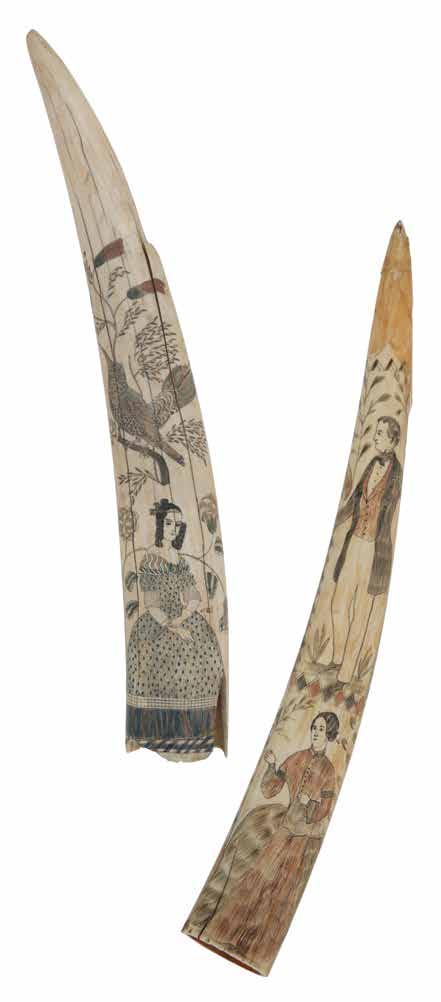
19th
Fluted octagonal shaft terminates in a carved sawtooth design embellished with contrasting pique inlay. Incised faceted knop/grip. Subtly tapering blade with incised lines. Possibly a miniature oar, though wear at end of blade indicates it may have had a functional purpose. Length 26”. 500/800
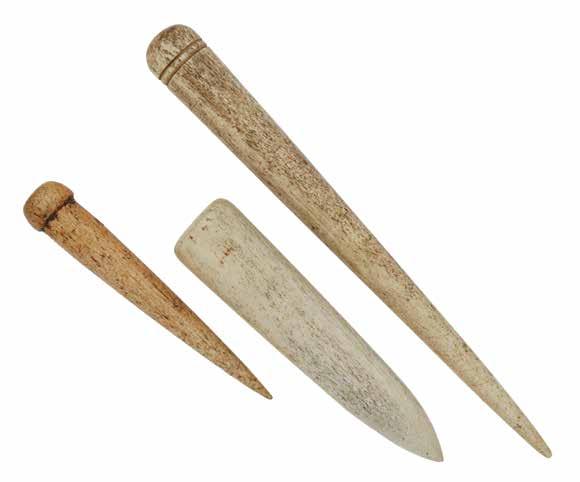

19th
Shortest
Wednesday, March 1 9:30 A.M.
Selections from the Kelton Collection of Marine Art & Artifacts
The Collection of Chuck and Jan DeLuca
The Collection of Michael Gill
Instruments
Paintings
Prints and Multiples
Models
America's Cup, Yachting and Cruising
Steamships and Liners
More

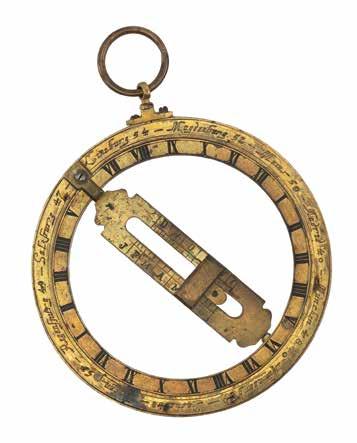
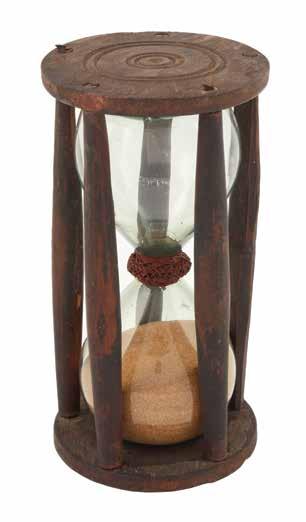
4503
4504
4503. BRASS POCKET SEXTANT

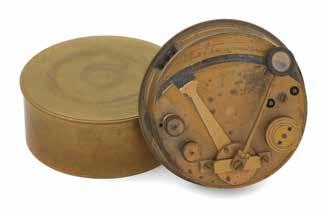
London, 19th Century
Marked “Elliott & Sons 56 Strand London”. With leather case, potentially a later addition. Diameter 3.125”. 300/400
4504. CASED SET OF DRAFTING INSTRUMENTS
18th Century
Silver-mounted shagreen case. Rule marked “Crichton
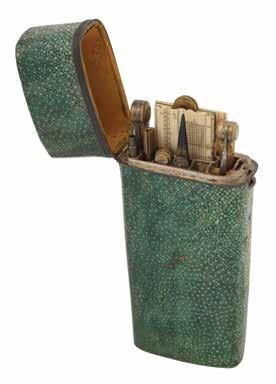
London”. Case height 6.75”. Width 3”. 500/800
4505. CASED BRASS NAVIGATIONAL RING
London, 19th Century
Engraved “Adams London”. Case height 0.75”. Width 6.25”. Depth 4.75”. 300/400
4506. POCKET SEXTANT
London, 19th Century
Marked “Troughton & Simms London”. With red leather case fitted for a sextant and a scope. Case length 4”. Width 3.25”. 300/400
4507. BRASS RING DIAL
England, 18th Century
Unmarked. Diameter 4”. 300/500
4508. COMPLETE SET OF DRAWING INSTRUMENTS
London, Late 18th/Early 19th Century
Bears label of W. & S. Jones, London. Ray skin case. Case height 6.75”. Width 2.75”. 400/600
4506
4509.
Denmark, 1774-1855
Portrait of the ship Adeline of Salem. Signed “Drawn by J. Peterson Copenhagen”. Titled lower center "Ship Adeline of Salem commanded by Joseph Felt 3rd Passing Cronberg [sic] Castle near Elsingoer [sic] the 20th May 1818". Watercolor on paper, 16.5” x 23.5”. Framed 28” x 33.5”. 800/1,200
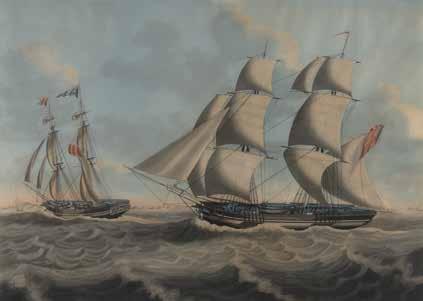
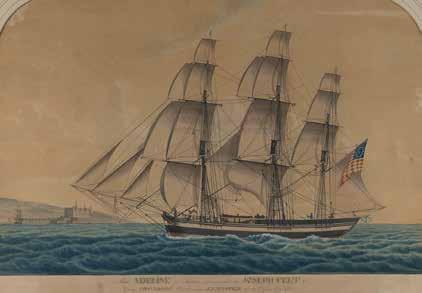
4510. DIRK ANTOON TEUPKEN
The Netherlands, 1801-1845
Portrait of the brig Francis Ann of Harwich. Signed and dated lower left “D.A. Teupken 1826”. Watercolor on paper, 19.5” x 28” sight. Framed 29” x 37”. 800/1,200
Provenance: Carl Crossman Collection.
“The North West End of One of the Admiralty Islands”. Depicts natives attacking a schooner. Unsigned. Titled lower center. Typed label on back attributes the work to Lt. Col. C. Hamilton-Smith. Watercolor on paper, 8.5” x 9”. Framed 17” x 19”. 700/900

1800
“View of the Fort & Harbour of Prince of Wales Island from the Gallery of the Brunswick at anchor after a sketch by the Rev. S. Hamilton 1800”. Titled lower edge. Pencil and ink on paper, 4.5” x 9”. Matted 9” x 13”. 300/500
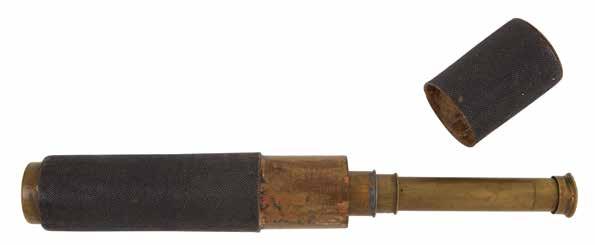
4515. CASED MODEL OF THE H.M.S. BOUNTY
Late 19th/Early 20th Century Black hull with green bottom. Beautifully executed rigging and deck works. Re-rigged by William Hitchcock, noted model maker. Mounted on a beveled plinth within a glass and wood case. Case height 28.5”. Length 31”. Width 14.5”. 3,000/6,000
4516. CASED MODEL OF THE SANTA MARIA
First Half of the 20th Century One of the ships on the Christopher Columbus 1492 expedition. Model with finely detailed brightwork hull. Displayed dioramastyle set in an acrylic ocean within a glass and wood case. Case height 13.25”. Length 16.25”. Width 8”. 1,000/1,500
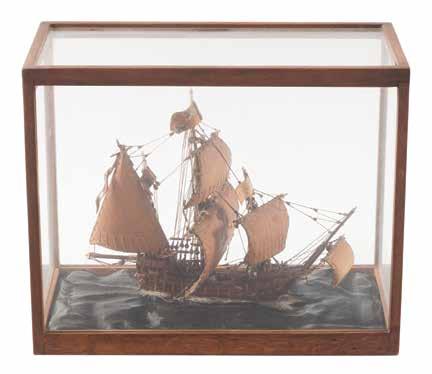
Provenance: Seaman’s Savings Bank, New York.
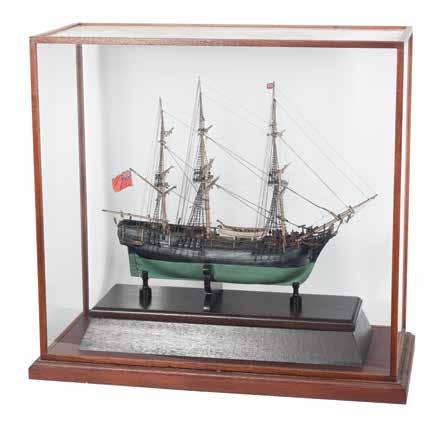
20th Century
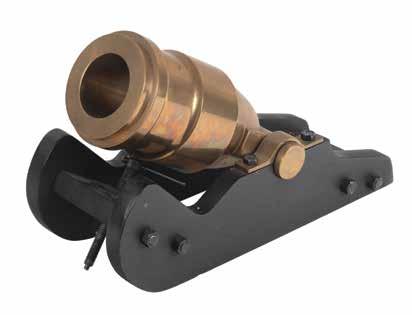
Hull built up in plank-on-frame construction with the planking below the waterline off to show the framing. Just below the waist on each side are eleven long sweep oars, and above the waist on each side are eight cannons, rigged though the hull. Detailed with anchors, ladders, buckets, windlass, raised poop deck with canopy, rigged with a bowsprit and three masts with a lateen mizzen, stern lanterns, etc. Displayed on a pair of turned brass pedestals within a maple and glass case. Case height 3.75”. Length 4.75”. Width 3”. 500/700
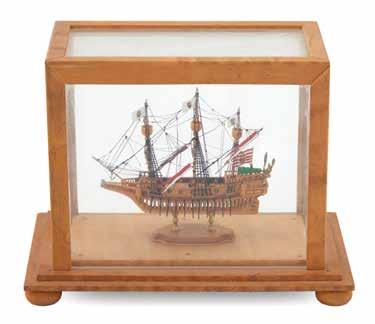
Stormy seas. Monogrammed lower left. Oil on canvas, 6” x 8”. Framed 11.5” x 13.5”. 700/900
Carved ivory hull with inset stem, keel and rudder post, rudder, applied transom, scored plank lines on the deck, and detailed with deck hatches, anchors and tiller. Rigged as a gaff cutter with bowsprit, mast, boom, gaff, cross spars, and standing and running rigging. Displayed on a marquetry base with later framing within a mahogany and glass case. Case height 7.5”. Length 9.25”. Width 5.25”. 700/1,000

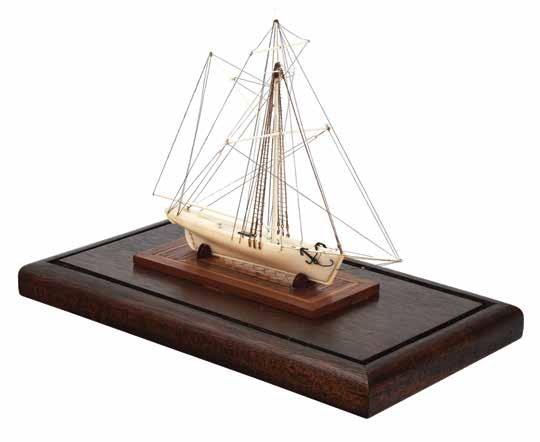
Marked
A
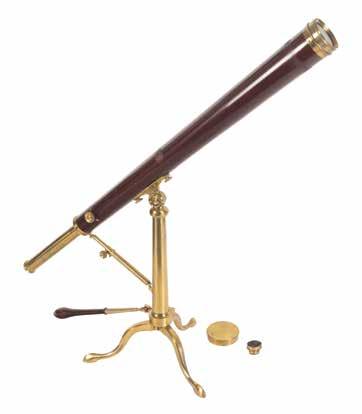
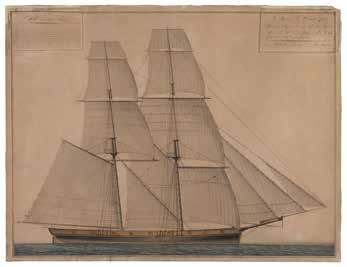
Marked
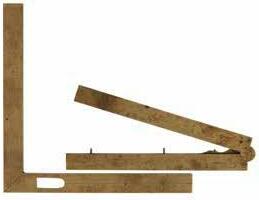
Marked on scale “Berge Ramsden London”. Skeletonized metal frame. Two lenses. Wedge-shaped walnut case. Case height 4.75”. Width 13”. Depth 11.25”. 200/300
Marked on scale “Cary London”. Wooden
Case height 5”. Width 11.25”. Depth 11.25”. 300/500
3”. 250/350
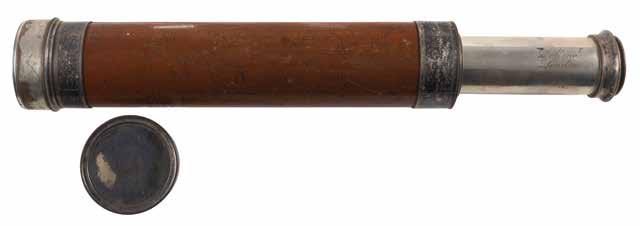
Eldred’s is pleased to offer maritime art and artifacts from the Kelton Collection over a series of auctions.
PAIR OF EARLY CONTINENTAL IRON CHART DIVIDERS

scalloped decoration running down both shafts. Length 22.75”. 600/800
Provenance: Tesseract, Hastings-on-Hudson, New York, 1999.
Circa 1776
Signed in Arabic along one of the sight vanes “Made by the little slave of his Lord, Ahmad b’Ali Marsil, year one thousand one hundred and ninety” (1190 A.H., equivalent to 1776-77 A.D.). One side of the brass plate with an engraved astrolabe quadrant with data for 35 degrees north latitude. This line of latitude runs through the Maghreb Region in Northwest Africa, which comprises current-day Morocco, Algeria and Tunisia. One of the radial edges has been cut with a long indentation to provide two “sight” vanes, and a plumb bob is attached by a string to the apex. There is also a horary quadrant for unequal hours marked at the apex. Extensive astronomical and mathematical plots are engraved on the surface including a stereographic projection of the sky with astrological symbols, various star positions and the elliptic and azimuth lines. These plots enable the quadrant’s use as a computer to find rising and setting times and positions of the sun, the constellations and bright stars, as well as the time of day or night, and other solutions for problems in practical astronomy. Reverse with a sine quadrant, which has been covered by a reinforcing board and back plate with a roundel inscribed “From the work of as-sayyid Ahmad b, Ali Marsil, may God have mercy”. This suggests the modification was made by the original maker. At the bottom, the quadrant has an index of 0-90 for taking sights. The quadrant sight used gravity to align the plumb bob with the index reading when the celestial body was observed by eye over the top of the instrument along the sighting vanes. The string was then clamped by the observer’s finger against the index, and the angle read. Height 7.5”. Width of arc 10.25”. 3,000/5,000
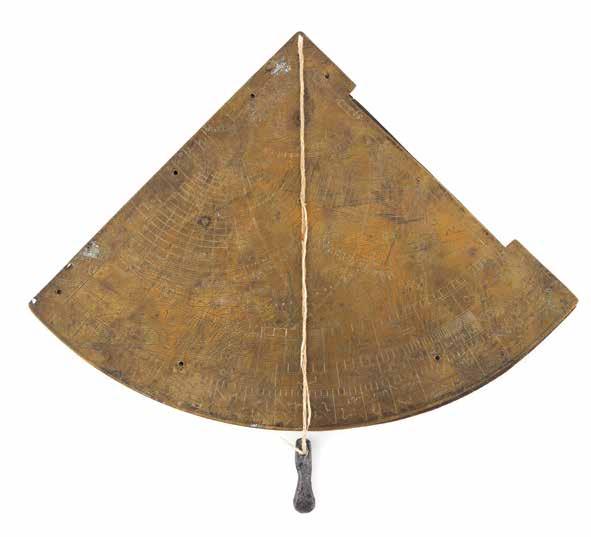
Provenance:
Sotheby’s, London, Frank Collection of Scientific Instruments, 1986.
Since no horizon need be visually sighted (like with the later bubble sextant), this instrument could be used for star sights at night and on land where the horizon was not observable. The reading did not have to be compensated for the altitude of the observer -- the calculation of which was very controversial. The cast shadow method was used to measure the sun’s altitude. The basic design of the instrument is of ancient origin. A graduated circle was the earliest instrument for measuring the altitudes of heavenly bodies precisely. It was Ptolemy who first suggested the measurement could be made with a quarter circle or quadrant. The quadrant reproduces data from the entire sky. It is conceptually formed by taking the circle of the sky with all required data, folding it on the East-West line, then folding the resulting semi-circle on the North-South line. Thus the four quadrants of the full circle, with their data, are superimposed over one another. In use it is necessary to select the curves and data appropriate to the quadrant addressed. As a maritime instrument, the quadrant could have been in use by Arab navigators in the Indian Ocean centuries before the Portuguese arrived, although at sea, stabilizing the plumb bob on a rolling deck was a problem in obtaining an accurate sight.
The 35 degrees north latitude seems to be the most central latitude bisecting the Islamic world. It passes through Morocco, Algeria, Tunisia, along the southern Mediterranean through Crete and Cyprus, then into Syria, Iraq, Iran, Afghanistan, Pakistan and Northern India before extending on into China and points east. Although the latitude information constrains the use of the quadrant as an astronomical computer to the latitude for which the data is inscribed, it can be used anywhere in the world for measuring the altitude of the sun, moon and stars, the primary measurement required to determine one’s latitude. The 90 degree scale inscribed at the bottom is for this function.
Dated 1699
Signed and dated on the side of the ebony shaft “A Tade * 1699”, approx. 5” up from the square end. Sides bear graduated scales for altitude and zenith distances. Four pearwood vanes with wing-shaped brass set screws. Smallest vane is 3.5” in length and 1.5” wide and has an elk horn sighting vane required when using the instrument as a backstaff. Two largest vanes are 15.25” and 24.125” in length and 1.5” wide. The secondsmallest vane is 7.5” in length and 1.5” wide and is original to the instrument, signed in ink “D de Waay”, believed to be that of an owner. The vane has a replacement brass aperture disc fitted to one end for using the instrument as a back-staff. The brass set screw is also a replacement. Shaft .53” x 32.5”. Height on stand 24”. Length on stand 32.5”. 50,000/70,000

Provenance:
A private collection.
Antiquairs, Grijpma & Van Hoogen, Groningen, purchased from the above circa 1990.
Hyland Granby Antiques, Hyannisport, Massachusetts, purchased from the above circa 1997. Purchased from the above 1998.
Literature:
“The Cross-Staff, History and Development of a Navigational Instrument” by Willem F.J. Mörzer Bruyns, Rijksmuseum Nederlands Scheepvaart Museum; Zutphen, Walburg Institute, 1994. Historical information on p. 14-16, 20-30 and 53.
“Bulletin #80 of the Scientific Instrument Society” by Willem F.J. Mörzer Bruyns, March 2004.
The definitive treatise on these instruments, The Cross-Staff, History and Development of a Navigational Instrument by W.F.J. Mörzer Bruyns, contains a list of all known instruments extant. This instrument is listed on p. 53, number 15 in oldest date order, and is the only known cross-staff by this maker. There are only four older instruments in good or very good condition and this is the only 17th Century example in private hands. Less than 100 cross-staffs exist in any condition throughout the world. Of these, only about 40 are in good to very good condition with at least one original vane. Of these, most are in institutions.
Cross-staffs were first described and probably invented around 1342 by the Catalan-born Jewish philosopher and scientist Levi Ben Gerson (1288-1344), then living in Avignon. It was then used only by astronomers. Its use was introduced at sea by the Portuguese around 1515, about 50 years after the quadrant and the astrolabe, probably inspired by Vasco da Gama’s observing the Arab’s use of the kamal in 1498. Initially, the Portuguese used it to measure the altitude of the Pole star, preferring the mariner’s astrolabe or the nautical quadrant for sun sights. In the southern hemisphere they observed a star in the Southern Cross, although this required the application of a much larger correction than that of the North Star observation.
While the backstaff was developed by Davis in 1595, and was popular for almost 200 years, the cross-staff continued in active use. Many, especially the Dutch, considered its ease and accuracy of construction and its ability to make accurate sights preferable to the backstaff. The cross-staff was finally supplanted in the Dutch East India Company ships about 1750 by the octant and later the sextant.
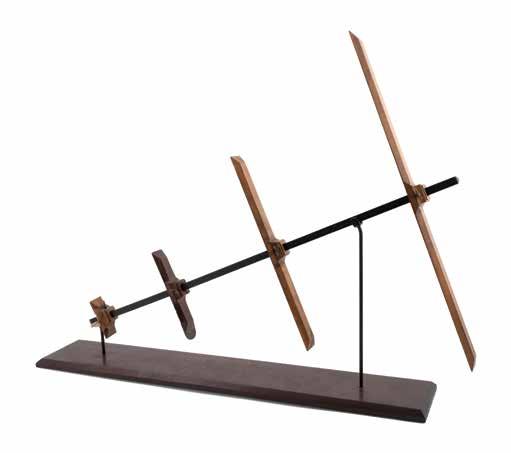

Circa 1700
Unsigned. Made from 7/16” thick boxwood with brass hinges, the rule opens as a rectangular surround with outside dimensions of 13 3/8” x 16 3/8”. All six wood segments are divided on both sides with scales in inches and degrees, divided every tenth of an inch and every half degree. In use it would be slipped over a 12” x 15” plain board to hold down the paper and provide direct plotting of angles and distances using an alidade or simple straight edge. One peripheral degree scale is centered on the plane table center, the other on a point just 2 1/4” in from the table’s edge. Decorated with a folk art-style engraving of an eel or sea serpent. Length folded 17.75”. 600/800
Provenance:
Tesseract, Hastings-on-the-Hudson, New York, 2013.
In his treatise on surveying and navigational instruments, “The Compleat Surveyor” by mathematician William Leybourn (Britain, 1626-1716), first published in 1653, Leybourn outlines the various instruments used in surveying and how they were employed. The Plane Table Rule is described: “The Table itself is a Parallelogram, containing in Length about 14 inches and a half, and in Breadth 11 inches: it is composed of three several boards, which may be taken asunder for ease and convenience in carriage. For the binding of these three boards saft when the Table is set together, there belongeth a joynted frame, so contrived, that it may be taken off, and put on the Table at Pleasure. Tis Fram also is to fasten a sheet of paper upon the Table, when ou are to describe the Plot of any Field or other Inclosure thereupon. This Frame must have upon it near the inward Edge, Scales of equal Parts on both sides, for the Speedy drawing of parallel Lines upon the Paper; and also for the shifting of your Paper, when one sheet will not hold your whole work.”
Mid-18th Century
Original rendering of Captain Cook’s coat of arms, passed down through the Cook-Fleck-Rimer family, together with an archive of four family photos, mostly of the Rimer family and their life in South Africa, a sale catalogue of the Rimer Collection of Antiques, a club listing, and other biographical and provenance information, most with Sotheby’s sale markers. Oil on cardstock, 11.5” x 9”. Framed 19.75” x 17.25”. 3,000/5,000
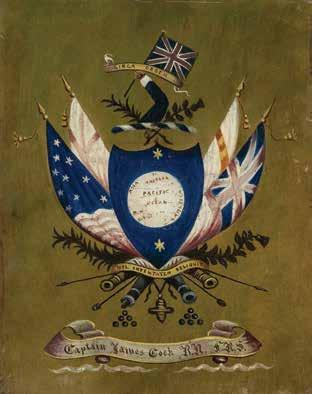
Provenance:
Captain James Cook (1728-1779).
Mrs. James (Margaret Cook) Fleck (1742-1804), his sister. Thence by descent to James Cook Rimer (1848-1928), a great-great-grandson.
Frederick Rimer (d. 1980).
Richard Anthony Cook Rimer (1938-1995).
Sotheby’s, London, Sale L03625, November 2003, Lot #211.
4535
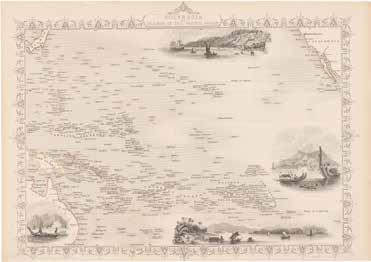
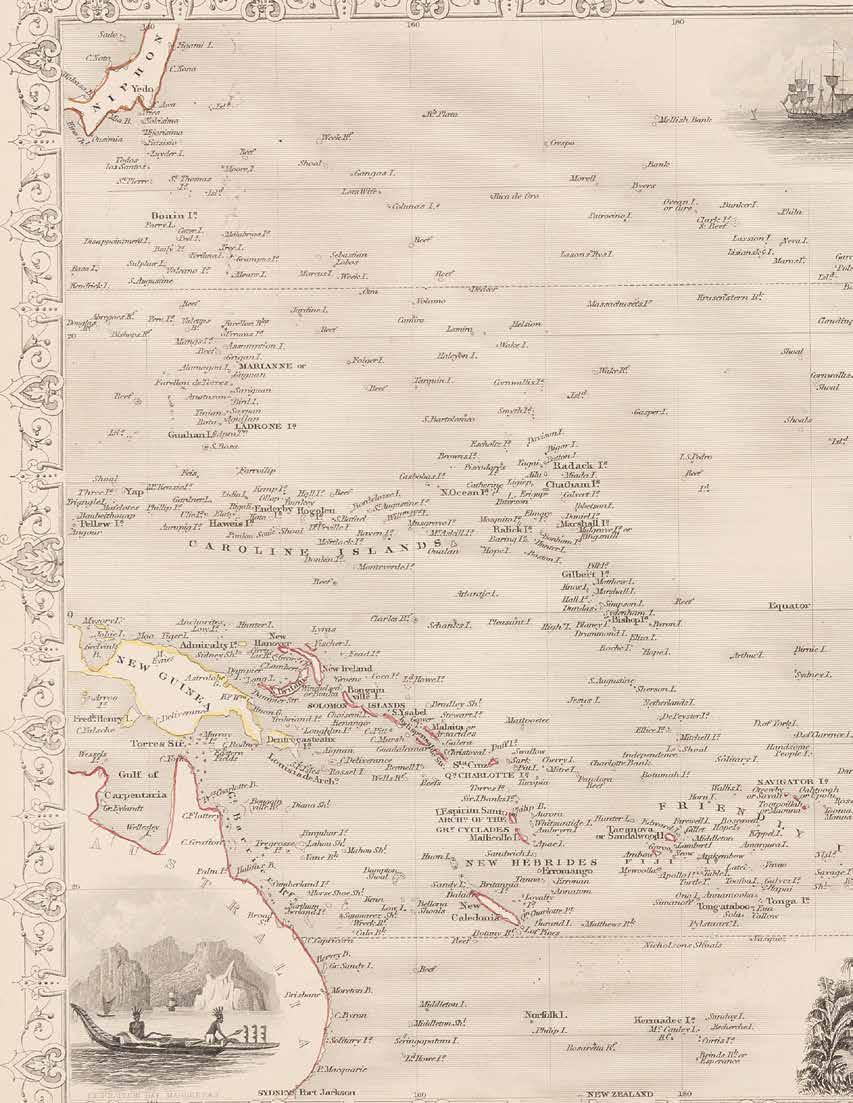
“A Man and Woman of Sandwich Islands”. A pair of graphite images drawn separately on a single sheet. Indistinctly signed and dated lower right “Stirld:26 Nov:1786”. After the original by John Webber, who is known for Cook Voyage sketches 1778 and as an expedition artist. Pencil and ink, 5” x 6.75” sight. Framed 11” x 12.75”. 1,000/1,500
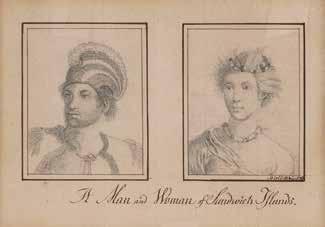
Provenance:
Robert G. Sawers, London, 1986.
400/600
Published by J. & F. Tallis, London and New York. Drawn and engraved by J. Rapkin; the illustrations by H. Winkles and engraved by T. Wrightson. From The Illustrated Atlas edited by R.M. Martin, the last highly decorative atlas produced in the Victorian era. Titled at the top center and surrounded by scrollwork border. Vignettes depict topographical views of Kalakakooa [sic], Sandwich Islands, Otaheite, Harbor of Dory, New Guinea and Resolution Bay, Marquesas. Some borders later outlined in red. Steel engraving on paper, sheet size 10.5” x 14.25”. Unframed.
Provenance:
Christie’s, Los Angeles, 2000. Robert Sawers, London, 2000.
Literature:
The Art of Captain Cook’s Voyages - Volume Three, The Voyage of the Resolution and the Discovery 1776-1780 by Bernard Smith and Rudiger Joppien (Yale University Press, 1988), p. 543.
Both of these images are plates in the 1784 edition of Cook’s Third Voyage, appearing on pages 125 and 126. Robert Sawers wrote in 1986 that he believes these drawings were originals for the smaller Octavo Edition published in 1786. Both are considered to be two of the most striking portraits done by Webber on the third voyage. The man, who wears a feathered cloak and typical Hawaiian headdress, has been identified as the Hawaiian chief Keneena, one of Cook’s closest allies during his stay in Kealakakua Bay. The woman is unidentified.
4539
Charles Barraud, working mostly in watercolors, won early recognition as an artist in New Zealand, and his paintings from 1850 onward are of considerable historical value. From his many sketches done in the field, Barraud took a selection to England that were reproduced in the portfolio “New Zealand: Graphic and Descriptive”, published in London in 1877. It contains a total of 74 chromolithographs, uncolored lithographs and woodcuts, with an accompanying text by W.T. L. Travers, a lawyer, politician and naturalist. These are likely from that collection.
4539. AFTER CHARLES DECIMUS BARRAUD
New Zealand/United Kingdom, 1822-1897
Five port views from New Zealand, circa 1877. Includes: Whanganui River, Hokitiki River, Rotorua, Coromandel Harbour and Auckland Harbour from Freeman’s Bay. Housed within a common mat and frame. Aquatint etchings on paper with hand coloring, each 4.25” x 10.5” sight. Framed 23.5” x 36.25”. 700/1,000

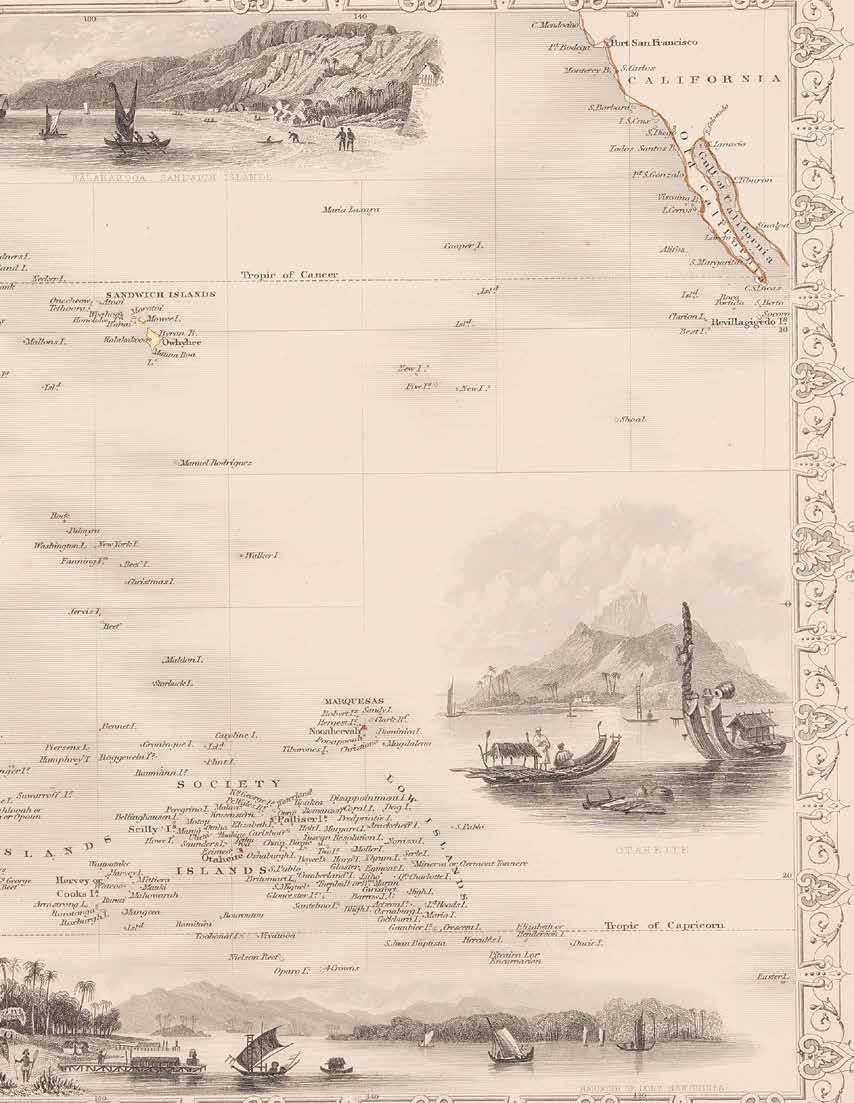
Provenance:
Pan Pacific Fine Art, Ltd., Auckland, New Zealand.
This document provides valuable information about navigation in the Strait of Magellan and the climate of Cape Horn during the Third Quarter of the 18th Century. Without question, the rounding of Cape Horn constituted one of the most dangerous and risk-filled missions in navigation around the coasts of the Americas. The frigate La Ventura departed from Callao (the port of Lima) on August 16, 1769, and arrived at Rio de Janeiro on November 19. After a stopover of almost three months, she left the Brazilian port February 13, 1770 and returned to Spain, reaching Cadiz on May 3.
Circa 1769
Spanish frigate La Ventura in the ice at Cape Horn. A drawing in two sections, side by side, each section within a square border of alternating filled and open lines. Left panel with a compass rose in the upper left corner and a bird’s-eye view of the sequential movement of the frigate La Ventura through the ice field from west to east in the perilous waters off Cape Horn during a voyage from Callao to Rio de Janeiro. The right panel has a detailed front-view of the sequence, depicting the ship entering the strait and its encirclement by icebergs. Pen, ink and watercolor on vellum, 15.75” x 13.75” sight. Framed 22” x 20.75”.
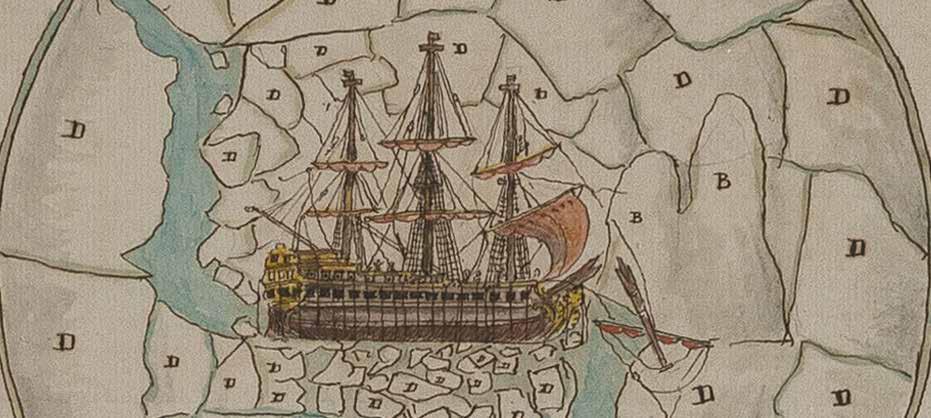
8,000/12,000
Provenance: Douglas Stewart Fine Books, Armadale, Australia, 2015.
The manuscript explanation of the legend in the drawings gives a precise account of the rounding of Cape Horn and the dramatic accident that befell the ship in the ice field. On October 8, 1769, at 3 o’clock in the morning, La Ventura entered the Strait of Magellan. The crew carried out soundings, then at half past ten the ship entered much deeper waters in an attempt to avoid a collision with any one of the numerous massive icebergs that surrounded her. At midday, unable to escape the situation, the frigate struck an iceberg, completely breaking its bowsprit. After managing to retreat from immediate danger by navigating through a narrow channel in the ice, the Andes Cordillera was sighted at 2 o’clock. Still in the menacing presence of huge icebergs, the crew were ordered to man the oars in order to more closely control the ship’s direction and speed. Finally, at around 7 o’clock, La Ventura began to round the Cape and distance herself from the icebergs, and by 9 o’clock she had completed her exit from the ice field.
Spanish records show that in 1768 the La Ventura, also known as La Amisted, was a part of this Cape route and transported a cargo of 350 tons divided into 360 registries, of which 165 (46%) belonged to those who resided in Peru. This cargo had been shipped from Cadiz. This and other records show that the local Peruvians participated in the transatlantic trade equally with that of the residents of Spain.

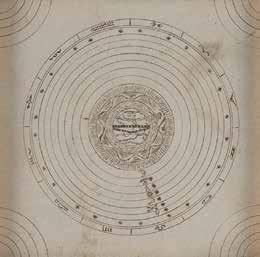
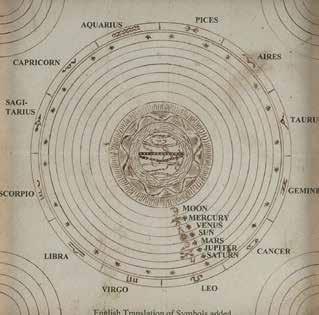
Circa 1780
Unsigned. Ebony “T” frame with inset ivory scale calibrated from -2 to 99 and divided in 20 arc minute increments. Brass 18” flat index arm with ivory vernier reading from right to left “0 5 10 15 20”, providing a reading with an accuracy of one arc minute. Index arm with a single thumb screw stop, of the type which predates the tangent screw fine adjustment feature introduced in the Late 18th Century. Additionally includes an ivory name plate (blank), an ivory-bound pencil, a peephole sight, three colored filters, mirrors, brass feet and other details. Lacking box. Length of radius arm 18”. Width of scales 14.5”. 800/1,200
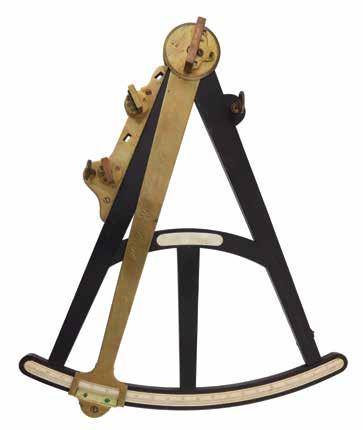
Provenance: West Sea Company, Old Town San Diego, 2012.
This early double reflecting navigation instrument has a large index mirror and two horizon mirrors. The lower of the two mirrors is for the antiquated back sight feature with a single peep sight. The upper mirror is for standard sighting using a double peep. For taking sun lines the original set of three colored glass filters is present. It is interchangeable for use with either sight. Remarkably, this quadrant is complete with its original, rarely found ivory-bound pencil for recording observations. Interestingly, some old notations are still present on the vertical limb just below the blank ivory nameplate in the center of the instrument. More typically, such observations would have been recorded on the inlaid ivory notepad on the reverse side. The reverse is also complete with its original brass “feet”.
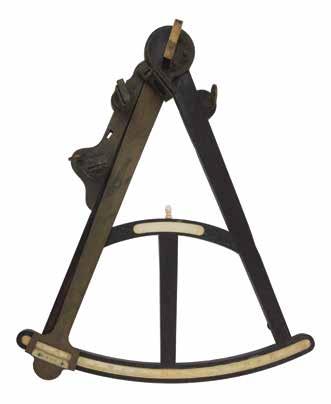
Britain, Circa 1780
Signed on the brass index arm “Richard Rowland” (Britain, 1761-1840). Ebony “T” frame with inset ivory scale calibrated from 0 to 95, and divided in 5 arc minute increments. Long flat brass index arm with ivory vernier and a single thumb screw stop, the type which predates the tangent screw fine adjustment feature introduced in the Late 18th Century. Additionally includes an ivory name plate (blank), dual peephole sight, mirrors, brass feet and other details. Lacking box. Length of radius arm 18”. Width of scale 14.75”. 800/1,200
Provenance:
Christie’s South Kensington, London, 1985.
Exhibited: Pacific Asia Museum at USC: “Trade and Treasure Exhibition”, 1987.
This slightly later quadrant exhibits many advances over the John Urings instrument. While it is still large and fitted with two sights, it has more brass parts for greater rigidity. The index arc has been expanded to a useful 95 and the index scale is ivory, which has much greater visibility. The main sight on the right has two peep holes. They are different sizes to compensate for the brilliance of the sun or for use at night. It has been fitted with an ivory vernier scale, a practice that began about 1750. The vernier scale makes very accurate measurements possible when the pointer lies between marks on the main index scale. Its invention is credited to Pierre Vernier (1580-1637), who put it in use circa 1631.
United Kingdom, 1735-1774
British squadron and Dutch ships in a squall, circa 1760. Oil on canvas, 16.5” x 25.25”. Framed 19.25” x 28.25”. 1,500/2,500
Provenance: West Sea Company, Old Town San Diego, 1992.
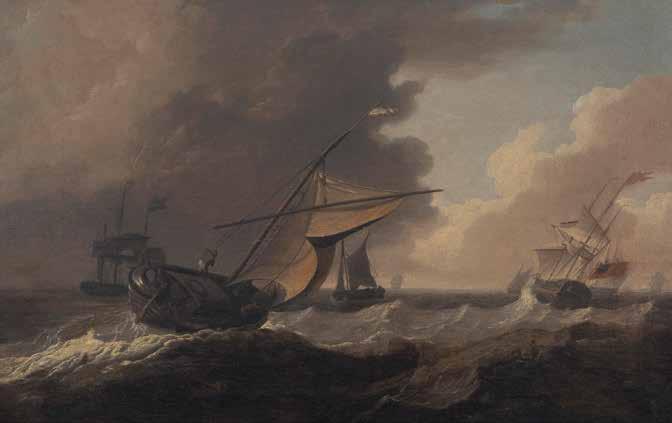
Unsigned. Shaft made of hardwood, bound in brass, divided in centimeters and halves from 0 to 65, and mounted with peephole sight and a heart-shaped handle at one end. A sliding crossbar has an adjustable slot calibrated from 0 to 86 units, where 20 units equals 1 centimeter. The principle is like that of the cross-staff -- in this case one sets the slot for an object of known size (a ship, person, etc.), then sights on that object through the peephole, sliding the crossbar along the staff until the object just fills the slot, and then reads the distance from the graduations on the staff. Length 30”.

Provenance:
Tesseract, Hastings-on-Hudson, New York, 1995.
400/600

Circa 1800
Signed “G. King Boston” on the compass card. Compass card also with decorated north and east points and set within a weighted brass bowl with an agate pivot. Housed within the original hand-dovetailed pine box with original green paint and gimbal frame. Inscribed in pencil on interior of box “Oliva Shedd Ronnberg”, perhaps referring to the succession of vessels on which the compass was used. Compass diameter 3.5”. Box height 3.75”. Width 7”. Depth 6”. 400/600
Provenance:
West Sea Company, Old Town San Diego, 2001.
Dating from the Federal period, this is a significant American boxed dry card ship’s compass with an early decorated “East Point”. In the early days of map making, Jerusalem was placed in the center of the map because it was considered the most holy city in Christendom. Subsequently, in addition to the north point on the compass rose, many early compasses had the east point embellished in recognition of the fact that Jerusalem lay to the east of most of the Western commercial centers. In this early American compass, the card evokes this tradition, with embellishments around the north and east points.
Gedney King (about 1777-1839) was born in Salem, Massachusetts. He was apprenticed to his uncle, Benjamin King, the famous colonial instrument maker from Rhode Island. Around 1800, the younger King set up his own instrument-making firm on Fore Street in Boston then moved to Fish Street in 1805. Two of King’s instruments, dated 1800 and 1802, are in the collection of the Peabody Essex Museum in Salem.

An early and rare bearing compass fitted to take sun azimuth bearings. Signed on the center of the compass card “Blunt New York” (G.W. Blunt, American, fl. 1811-1872) and under the center nut “U.S. Navy”. Card engraved on light blue/green paper and divided with elaborately decorated points, the north point with engraved signature “William Hooker”, who was the compass maker’s son-in-law. The outer bezel (circumference) of the compass card has an engraved silver scale, divided in degrees, which holds the card in place. The dry compass card rotates on an agate or sapphire “jewel” set within a brass bowl that sits in a gimbaled ring and mounted to a dovetailed wood box with triangular feet. Mounted to one side of the top of the bowl is a flip-up black oxidized sight that can be adjusted vertically. The sight is fitted with a prism allowing the silver scale to be viewed simultaneously with the sun or other object whose bearing is being taken. In addition, there are red and green hinged filters that can be swung in or out of view. Opposite the sight is a flip-up brass framed sighting line with a hinged filter that slides up or down as needed. Compass diameter 9”. Box height 10”. Width 12”. Depth 12”. 3,000/5,000
Provenance:
Hyland Granby Antiques, Hyannis Port, Massachusetts, 2000.
Portrait of a young American woman.
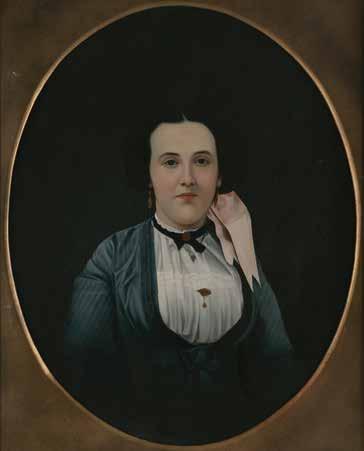
Unsigned
Early 19th Century
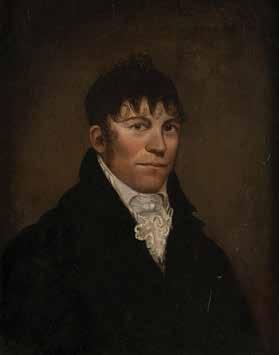
China Trade
Provenance: Eldred’s, 1995.
4549.
“Attack and Capture of the Forts at the Entrance of the River Pei-Ho_China”. Inscribed along the lower margin “From a Sketch by F.J.E.B. Bedwell. _ T.Picken Lith.”, “London: Published by Day & Son, Lithographers to the Queen, Gate Street, Lincoln’s Inn Fields” and “Day & Son. Chromolith. To The Queen”. Subtitled “On the 20th May 1858. By the Allied British and French Gun Boats and Boats of the Squadron in the Gulf of Pechili” and further inscribed in script “Respectfully dedicated by permission to their Excellencies Rear Admiral Sir M. Seymour K.C.B. and Rear Admiral C. Reigault de Genouilly G.E.L.H. K.C.B.”. Hand-colored lithograph, 40.25” x 24” sight. Framed 24” x 32.25”. 700/1,000

Hull built up from the solid and painted with a green bottom and black and white topsides. Deck with scored and varnished planking. Detailed with figurehead, anchors, hatches, windlass, pin and fife rails, deck houses, ship’s boats, stove pipe, companionways, skylight, ship’s wheel, etc. Rigged as a ship with a bowsprit and three masts, cross spars, standing and running rigging, and flag. Displayed on a wood cradle within a mahogany and glass case. Case height 18”. Length 27”. Width 10”. 1,000/1,200
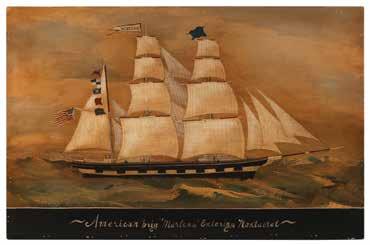
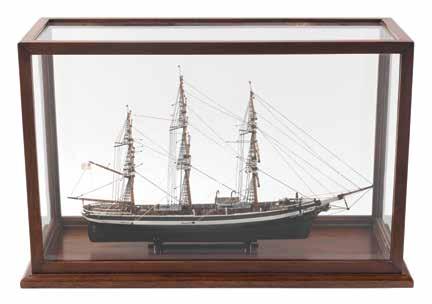
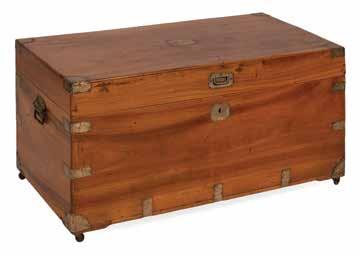
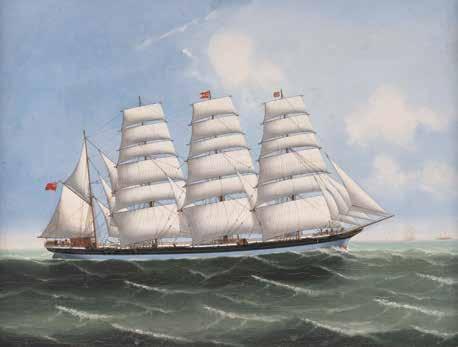
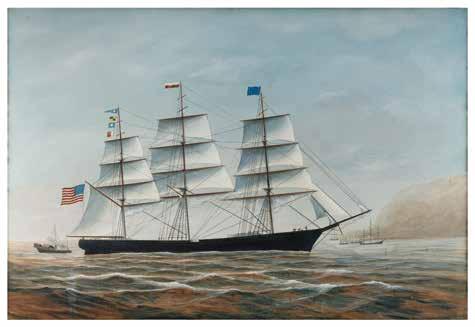
4555. BRITISH SAILOR-MADE MODEL OF A 90-GUN BRITISH SHIP OF THE LINE
Circa 1850
Hull built up from the solid and painted with a green bottom and black and white topsides. Fitted with head rails with residual gold polychroming, the figurehead of a man, the stern with quarter galleries with glazed windows, rudder, and other details. Deck with scored planking and detailed with numerous figures on deck and in the rigging, pin and fife rails, deck hatches, ladders, belfrys, poop deck, double helm, ship’s boats on davits, etc. Rigged with a bowsprit and three masts, cross spars with stun’sail booms, standing and running rigging, flags and other details. Displayed on wood cradles mounted to a mahogany board. Height 24”. Length 35”. Width 9”. 2,000/3,000
4556. ADMIRALTY-STYLE MODEL, POSSIBLY THE U.S.S. CONSTITUTION
America, Late 19th/Early 20th Century Black hull with green bottom. Detailed deck with cannons in gunports, capstan, lifeboat, etc. Lifeboat is an addition made by William Hitchcock, noted model maker. Mounted to a mahogany base. Height 13.5”. Total length approx. 42.5”. Width 9.5”.

1,500/2,500
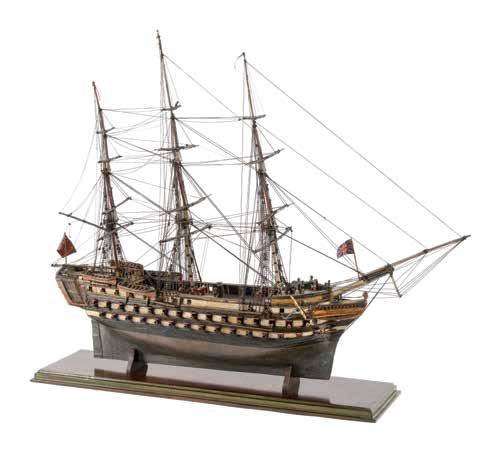
England, Late 20th Century
War
1812
1,500/2,500
France, 1765-1835
“Betsy of Boston John Virgin Commander 1816”. Signed and dated lower right “Antoine Roux Marseilles 1820”. Titled lower center. Gouache on paper, 17” x 23”. Framed 29.25” x 34.25”.
Provenance:
3,000/5,000
Diana H. Bittel Arts & Antiques, Bryn Mawr, Pennsylvania, at the Ellis Antiques Show, Boston, 2000. A distinguished Beacon Hill, Boston collection.
America, Contemporary
“Niagara vs. Detroit Battle of Lake Erie War September 10, 1813”. Titled on frame plaque. Signed lower left “Ducey 2001”. Also includes two line drawings by the artist of the Niagara and the Detroit. Watercolor and gouache, 16.5” x 21” sight. Framed 26” x 30.5”. Line drawings 13” x 15” and 18” x 15”.


1,000/1,500

In the form of the breech end of a cannon. One bookend with brass plaque “This material was taken from the original hull of the U.S. Frigate Constitution keel laid 1794 rebuilding 1927”. Heights approx. 7.5”. 500/1,000
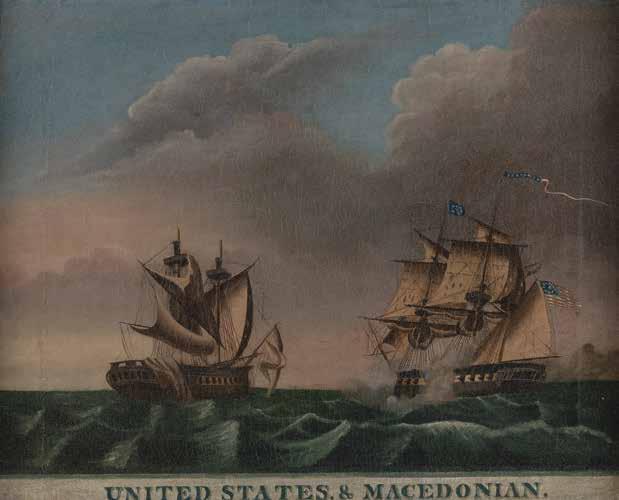
19th Century
In rosewood. Foliate carving along edge of top and base. Upper case with two half drawers over a full-width drawer. Lower case with two full-width drawers and tapered ribbed feet. Brass handles at sides of both cases. Height 40.5”. Width 38”. Depth 17.5”. 2,400/2,800
British-flagged
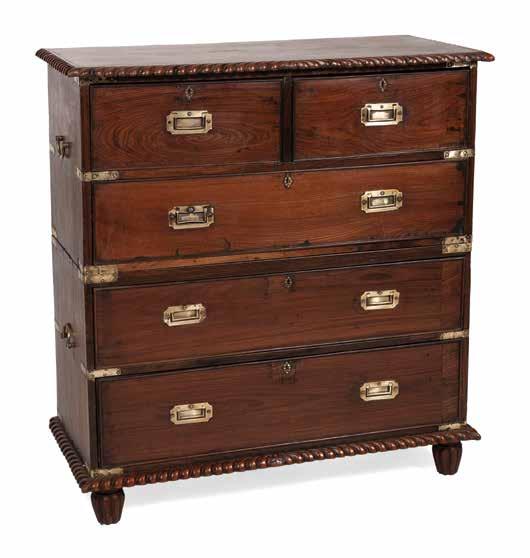
19th Century
Depicts one large ship and two smaller off a lighthouse flying a British red ensign. The large ship is flying a Union Jack off the stern and several other pennants from the masts. 12” x 24” sight. Framed 16” x 28”. 1,000/1,400

19th Century
Arched board with a rope-carved border. One side carved with tassels, a bow and a shield, and shows traces of a painted lion. Other side carved with a stage, curtains and foliate border. Height 20.25”. Width approx. 29.75”. 800/1,200
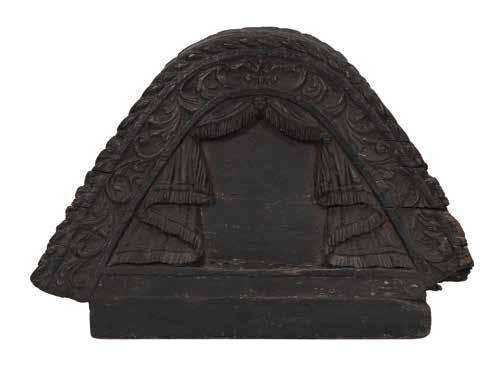
Portrait

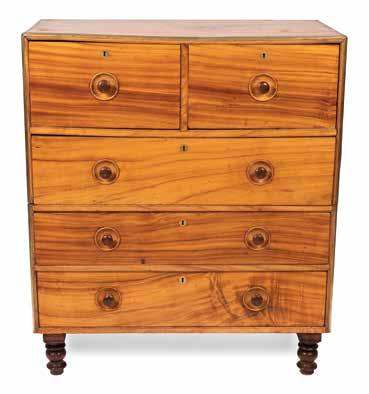
4568. WAYNE HOLSOPPLE America, Contemporary “The Bow Chaser”, a carved cherry wood sculpture. Detailed with a figure sitting on a “bow chaser”, dressed as a conscript sailor, loading his flintlock pistol, and detailed with bucket, loading rams, carriage tackle, cannon, etc. Housed in custom plexiglass case with wooden base. Case height 25”. Length 27”. Width 22”.
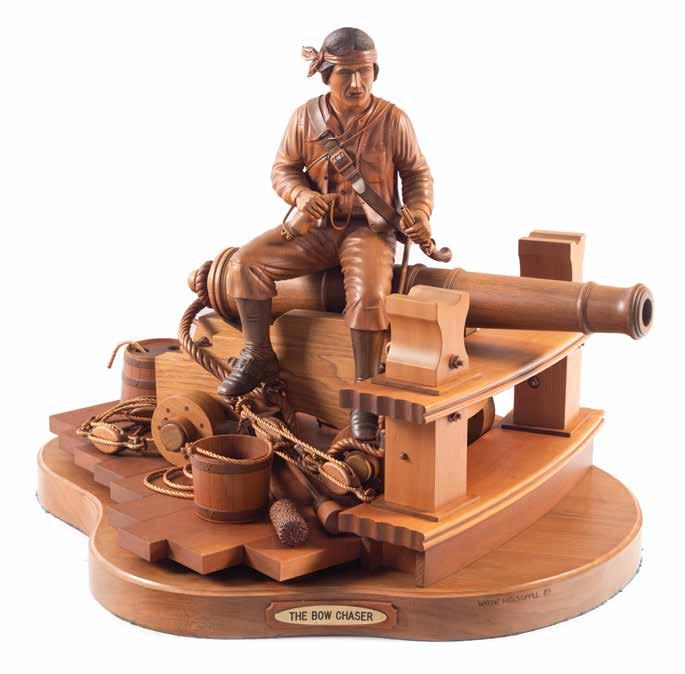
19th Century
Portrait of a three-masted ship with black hull flying a British flag. Nicely detailed deckworks and figures. No signature noted. Oil on canvas, 22.25” x 28.25”. Framed 28.5” x 34.5”. 1,500/2,500

London, 19th Century
Marked on scale “Spencer Browning & Rust London”. Wedge-shaped dovetailed walnut case with paper labels for David Baker and Charles Pace. Case height 5”. Width 13.75”. Depth 11.5”. 400/600
19th Century

In mahogany. One-part construction with a deep full-width desk drawer over two half drawers over two full-width drawers. Brass and iron hardware. Height 46”. Width 39”. Depth 23”. 1,200/1,400
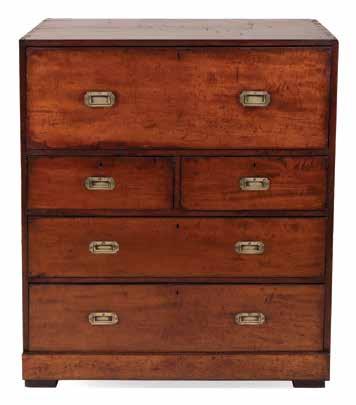
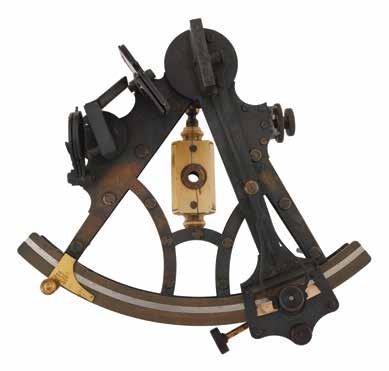
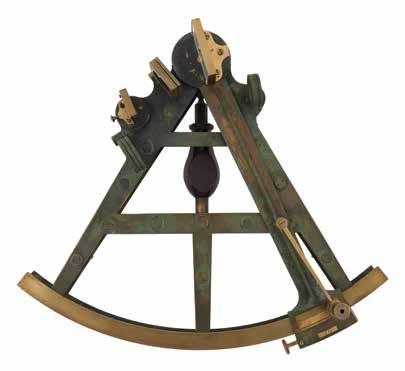
Unmarked.
4577. NICKEL-PLATED THREE-DRAW TELESCOPE 19th Century
Marked
4578. CASED SKELETONIZED FRAME SEXTANT
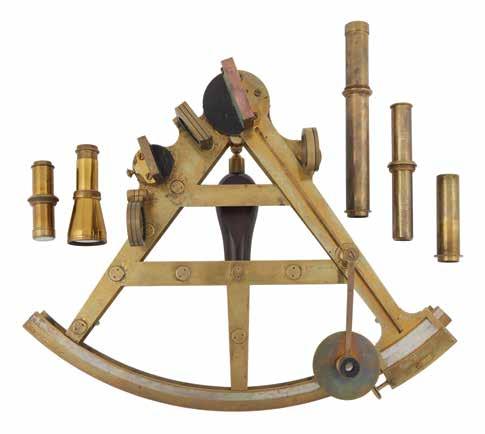
Scale marked “E. Lorieux. A. Hurlimann, … Paris 439”.
10.25”.
Hull built up from the solid with painted green bottom and black topsides. Deck planked and pinned and detailed with anchors, anchor windlass, pin and fife rails, hatches, galley, buckets, deck eyes, skylight, compass house, tiller, etc. Rigged as a schooner with a bowsprit and two masts, standing and running rigging, and other details. Displayed on an inlaid cherry base on a “T” keel stand within a glass and cherry case. Also includes a plan for a study model and a brief document regarding the making of these plans. Case height 27.25”. Length 37”. Width 15”. 1,800/2,500

“View
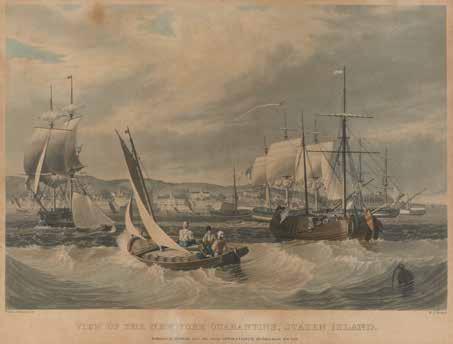
Provenance: Atlantic Gallery, Washington, D.C. The collection of Dr. John McDonough. Thence by descent to the current owner.
Washington/New York, 1955-
Broadside portrait of the Confederate auxiliary raider C.S.S. Shenandoah at sea, engraved and hand-colored on a fossilized piece of mammoth ivory. Circa 1989. Inscribed around the border “The Celebrated Confederate Auxiliary Raider - 38 Prizes taken in a 58,000-mile Cruise under Lieutenant James I. Waddell - 1864-65”. Signed, dated and inscribed verso “Aide-Toi Et Dieu T’Aidera” (Heaven helps those who help themselves). Displayed on a wood, ebony and abalone inlaid stand. Height on stand 5.5”. Width 4.75”. 800/1,200
Provenance: Maritime Art Gallery, Mystic, Connecticut. The collection of Dr. John McDonough. Thence by descent to the current owner.

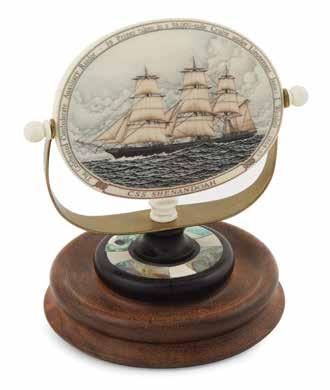
4583. GIDEON JACQUES DENNY
California/Delaware, 1830-1886
Ship on stormy seas. Signed lower left “GJ Denny”. Oil on canvas, 20” x 26”. Framed 31.25” x 47.25”. 2,500/3,500
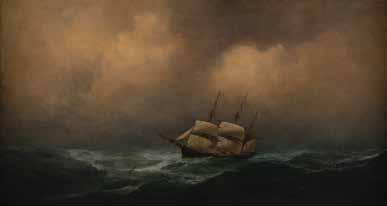
Provenance: Maxwell Galleries, San Francisco. The collection of Dr. John McDonough. Thence by descent to the current owner.
4584. AMERICAN SCHOOL
19th Century
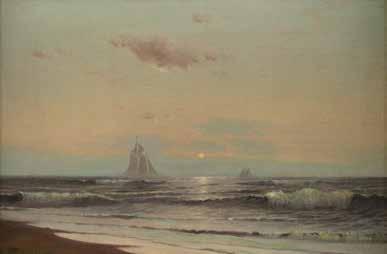
Seascape. Signed lower left “Wm. T. Richards”. Oil on canvas, 12” x 18” sight. Framed 22” x 28”. 2,500/4,500
4585. CONTINENTAL SCHOOL
19th/20th Century
Ship’s anchorage at dusk. Signed illegibly lower right. Oil on canvas, 6.5” x 9”. Framed 9” x 12”. 300/500
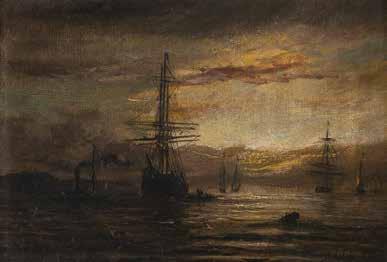
United Kingdom, 1808-1879
Passengers being rescued from the burning Ocean Monarch Signed and dated lower left “Henry Melling 1848”. Two old labels verso, the oldest one marked “From Richard Jeffreys Carver Gilder & ... 8 ct ...”, and the more recent “William D. Jones Phone Royal 520[?] Carver Gilder Picture Frame Maker Etc. 100 Seel Street Liverpool Gilding done for the Trade ... only used mirro ... rd ... pap ... ". Oil on canvas, 17” x 29.5”. Framed 21.75” x 34.5”. 5,000/7,000
Provenance:
Paul Mason Gallery, Sloane Street, London.
Purchased from the above by Richard Kelton on the advice of Sam Davidson, May 1998.
Eldred’s, The Marine Sale, August 2020, Lot #253.
Ocean Monarch, an American emigrant ship, was outward bound from Liverpool with more than 300 passengers on board when fire broke out in the stern and spread rapidly. This painting depicts the arrival of Thomas Littledale’s cutter yacht Queen of the Ocean, returning from the Beaumaris Regatta. In conjunction with the steam frigate Alfonsa, more than 200 passengers were rescued.
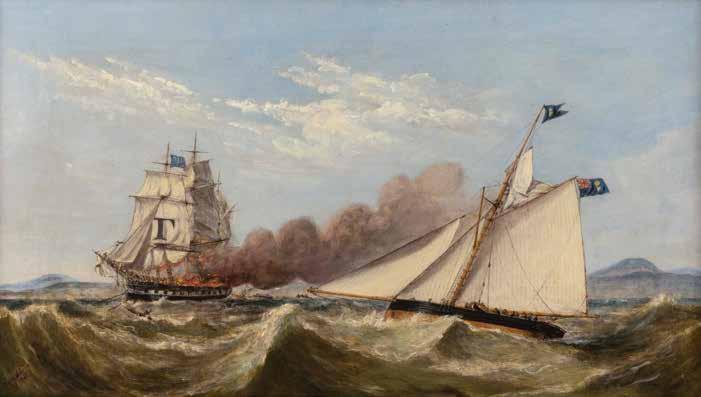
United Kingdom, 1808-1879
The Queen of the Ocean going to the rescue of the Ocean Monarch. Circa 1848. Designed and drawn on stone by Henry Melling. Published by George Smith, Watts & Co., Lithographers, Liverpool. Lithograph on paper with hand coloring, 10.75” x 15.75” sight. Framed 19.25” x 23.75”. 400/600
19th Century
Marked “U.S.L.H. Depot Lamp Shop Staten Island NY”. Height excluding handle approx. 6.25”. 300/500
PART TWO
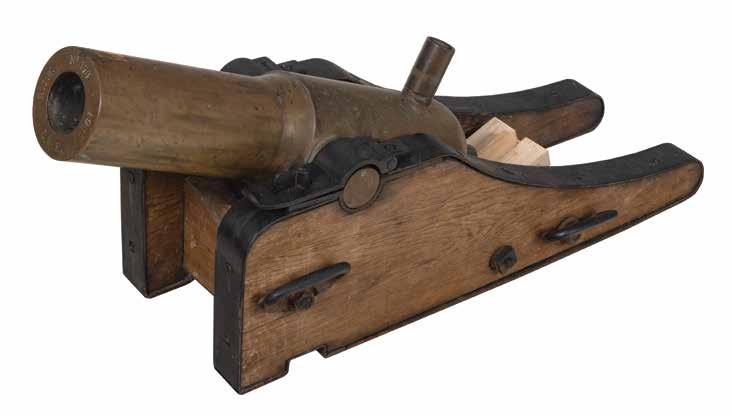
Late 19th/Early 20th
raised lettering on top.
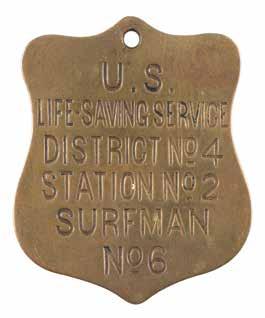
compartmented interior. Complete with instructions for use of gun and rocket apparatus. Also includes a postcard from a lifesaving station. Height 7.5”. Width 14.25”. Depth 10”. 3,000/4,000

Waltham

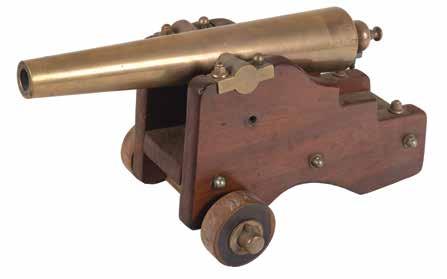
Provenance: John Rinaldi Nautical Antiques, Kennebunkport, Maine.

4595. SHIP’S STICK BAROMETER BY WILLIAM DESILVA Liverpool, England, 19th Century Rosewood veneer case. Complete with gimbal. Plaque on front marked “Z. Allen 1883”. Height 38”. 3,000/4,000
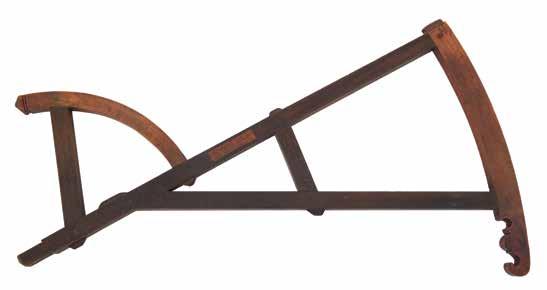

Purportedly from the Bird family of Rockland, Maine and hung in the vessel “Hattie Simpson” built in Waldoboro, Maine.
4596. THREE NAVIGATIONAL ITEMS
19th Century
Two rules and a small pair of parallels. Lengths of each approx. 6.25”. 250/350
4597. RARE BACKSTAFF QUADRANT BY THOMAS GREENOUGH
Second Half of the 18th Century
Marked on namplate “Thos Greenough […] Fecit For Mr. Edmond Gross 1765”. Hardwood frame with boxwood scales. Length 24.25”. Width 13.5”. 7,000/10,000
4598. BOXED MASSEY SOUNDER BY EDWARD MASSEY
Early 20th Century
Original pine box with labels. Box height 6”. Width 9.75”. Depth 6”. 1,000/1,500
4599. QUADRANT BY E. & G.W. BLUNT IN A DECORATED CASE
19th Century
Wedge-shaped case with a portrait of George Washington, roses, an American flag, eagle and “C.C. Blanchard” banner. Retains label for retailer E. Medinger. Case 13.5” x 16.25”. 1,500/2,500
4600. QUADRANT BY BENNETT OF LIVERPOOL WITH DECORATED CASE
19th Century
Stepped wedge-shaped case with an eagle and flag on upper tier and a three-masted ship on lower tier. Bears paper label for William DeSilva. Case 14.25” x 12.5”. 1,500/2,500
4601. CASED DOUBLE FRAME SEXTANT BY JOHN CAIL
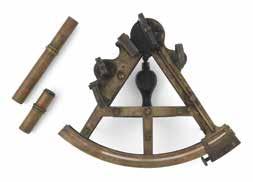
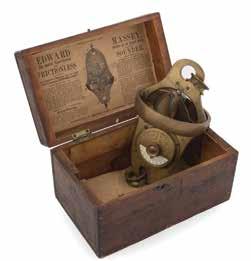
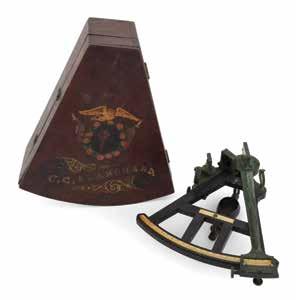

19th Century
Marked “John Cail No 8 Newcastle on Tyne”. Label on case interior for retailer James Taylor & Co. Brass-bound walnut case. Case 11” x 13”. 1,800/2,500
4602. EARLY SANDGLASS TIMER
First Half of the 19th Century
Wooden frame. Two-piece glass bulb. Old tin container. Total height 6.25”. Diameter 3.5”. 400/600
3,500/5,000
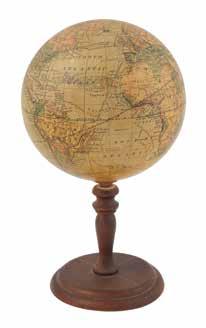

2,000/3,000

7.25”. 3,500/5,000
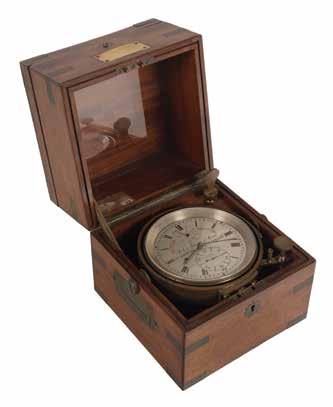
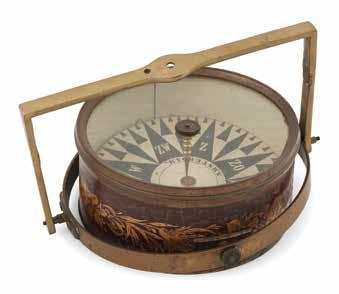
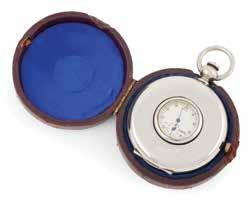
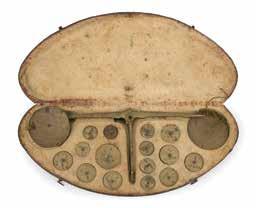
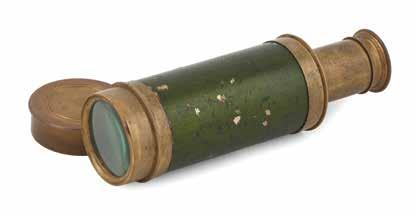


19th Century
Interior with right-side till. Nicely carved beckets with sailor’s ropework handles. Front of chest with 20th Century painted decoration of a three-masted vessel at sea. Height 17.5”. Width 37.75”. Depth 17.25”. 500/1,000
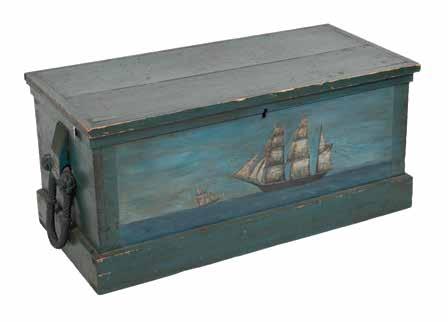
First Half of the 20th Century Gold eagle with beautifully carved feather details. Clutches red, white and blue American flags and a Liberty shield in its talons. Height 28”. Length 55.5”. 2,000/3,000
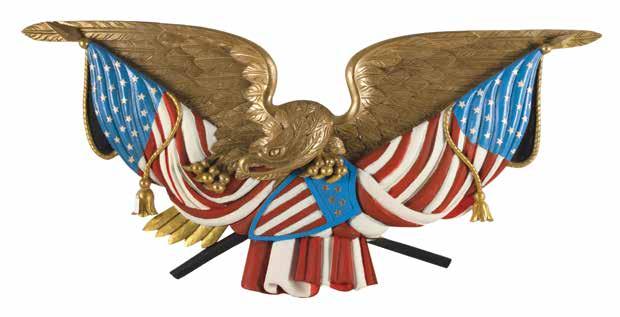
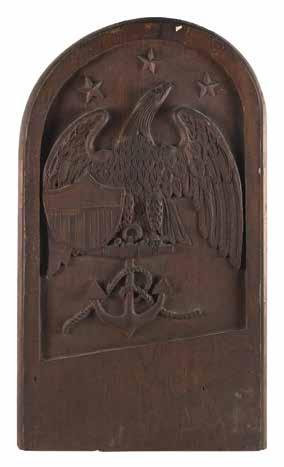
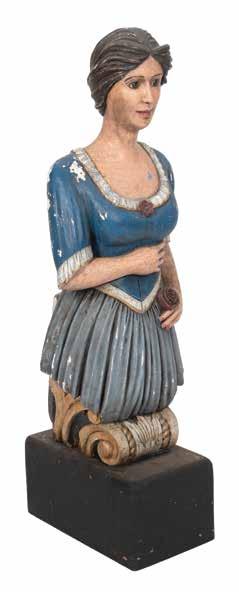
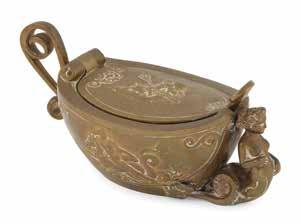

Late 19th Century Depicts two mermaids surrounding an anchor, an oval

a
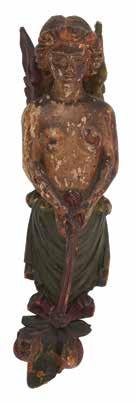
19th Century
View of the three-masted ship built in Searsport, Maine under full sail and flying an American flag. “S.F. Hersey Captn. Waterhouse 1879” below. Signed illegibly lower right. Watercolor and gouache, 18.5” x 23.5”. Framed 23.5” x 28.5”. 1,500/2,500

Signed lower right, possibly “Hanumann”. Mixed media, 10” x 13.75”. Framed 17.25” x 21.25”. 200/300
Late 19th/Early 20th Century
Portrait of a gaff rigged fishing sloop. Signed illegibly lower right. Oil on canvas, 20” x 30”. Framed 26.5” x 36.5”. 300/500
Early 20th Century
Depicts the Yancey and numerous vignettes of Arctic life. Inscribed along the lower margin “Good Luck RE Byrd”. Framed 20.5” x 15”. 100/150
20th
19th
500/700
19th Century
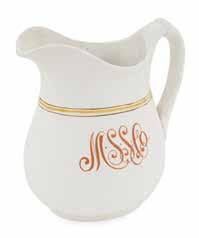

Top depicts an American flag. Front with large applied plaque marked “Lieut. Lord”. Nicely shaped beckets with rare sailor-made double ropework handles. Height 15.5”. Width 38”. Depth 17.75”. 2,000/3,000
Lieutenant Lord was in charge of the 1930s restoration of the U.S.S. Constitution

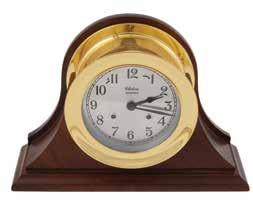
4634. CASED TELESCOPE
London, 19th Century
Barrel engraved “Keyzor & Bendon 50 High Holborn London”. Mahogany case. Includes wooden tripod. Case height 8”. Length 41”. Depth 11”. 1,500/2,000
4635. SINGLE-DRAW TELESCOPE
London, 19th Century
Twine-wrapped barrel. Inner tube marked “Made J.J. Messer London” and “Capt. J.E. Hubbard”. Closed length 31.5”. 700/900
4636. CASED BRASS TELESCOPE
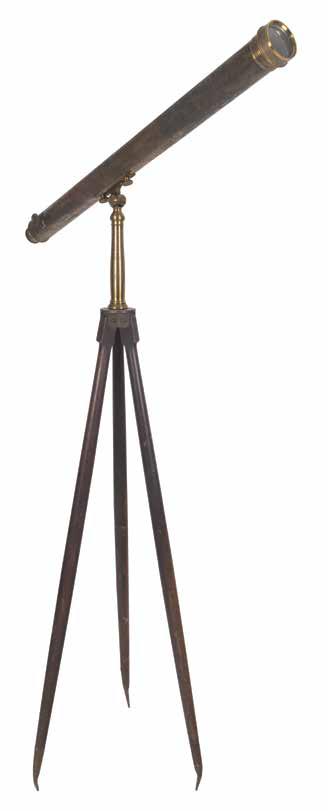

Philadelphia, 19th Century
Signed “Harrittman & Son
Philadelphia”. Fitted tripod. Original mahogany case. Case height 6”. Width 47”. Depth 9”. 1,500/2,500
London,
Marked
19th Century
Engraved
TELESCOPE
19th Century
Inner barrel engraved “Lewis Wolf 36


Presentation LC
19th Century
Engraved
19th
Captain
In 1824 William Driver’s mother and other women of Salem sewed a 24-star flag to commemorate his appointment as a master mariner and captain of his ship the Charles Doggett. He coined the flag “Old Glory”, and it accompanied him on his 20-year career sailing to China, India and throughout the South Pacific. He also had it with him when he rescued 65 descendants of the survivors from the H.M.S. Bounty from Tahiti to Pitcairn Island. He later settled in Nashville, Tennessee, and when the state seceded from the Union, Driver had “Old Glory” sewn into a quilt for safekeeping.
“Old Glory” is now exhibited at the Smithsonian Museum of American History in Washington, D.C.

19th
19th Century
19th Century
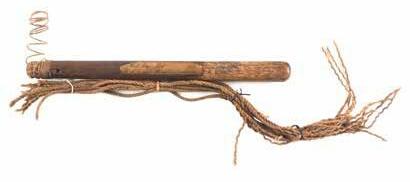
Top with brass plaque “BF Jones”, for whaling captain Benjamin Franklin Jones of New Bedford, captain of the barks Sea Breeze and Camilla. Fitted with a secret compartment. Contains a 1849 Colt revolver, serial #137867, the cylinder engraved with a coach robbery scene, as well as a metal powder flask with raised eagle and Liberty shield decoration, a bullet mold, etc. Height 7.25”. Width 19.25”. Depth 11.25”. 3,000/4,000
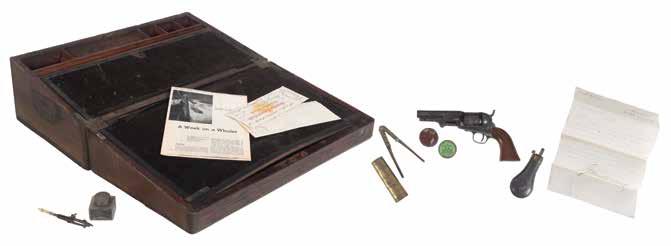
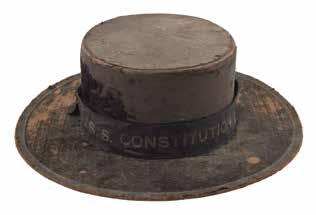
4646. WALNUT BOX, BELIEVED TO BELONG TO CAPTAIN SHERMAN

19th Century
Top with inlaid “JLS”. Three drawers with recessed drawer pulls. Receipt in interior made out to Captain Sherman and dated 1868. Height 10”. Width 17”. Depth 10.5”. 600/800
4647. RARE GUNPOWDER FLASK
19th Century
Brass flask with sailor’s ropework on exterior. Length 10.5”. 300/500
4648. BRASS-BOUND TRAVEL LAP DESK

First Half of the 19th Century
In strong burled walnut veneer. Top with double fleur-de-lis carving and escutcheon. Height 7”. Width 19.75”. Depth 10.25”. 300/500
4649. SAILMAKER’S ODD LOT
Late 19th Century
Includes a sailmaker’s palm, wax and needle. 80/125
4650. SAILMAKER’S STEER HORN
19th Century
With iron belt loop and needle. Length 8”. 100/200
4651. THREE SAILOR’S ROPEWORK NEEDLE CASES
19th Century
Lengths from 5” to 7.5”. 400/600
4652. MOUNTED HALF HULL MODEL OF A SAILING VESSEL
19th Century
Built up in seven lifts. Applied prow, skeg and rudder. Backboard 6.5” x 33”. 1,000/1,500
4653. MOUNTED HALF HULL MODEL OF THE KATE DARLINGTON
19th Century
Marked in gold lettering on the side. Backboard 9” x 58.75”. 2,000/3,000
19th Century
In mahogany. Complete with bottles and other period medical supplies. Height 9.75”. Width 10.5”. Depth 6.75”. 1,000/1,500
Late 19th/Early 20th Century
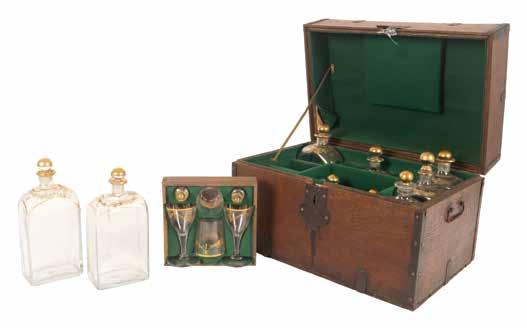
From Lubin’s Pharmacy, Boston. Leather case. Glass engraved with measurements. Total height 2.75”. 100/200
19th Century
“H.F. Folsom Ship Druggist” paper label on interior. Includes a group of adhesive labels with attractive graphics pertaining to various medicines and remedies including cod liver oil, cough syrup, etc. Height 6.5”. Width 17.75”. Depth 8.5”. 200/300
18th Century
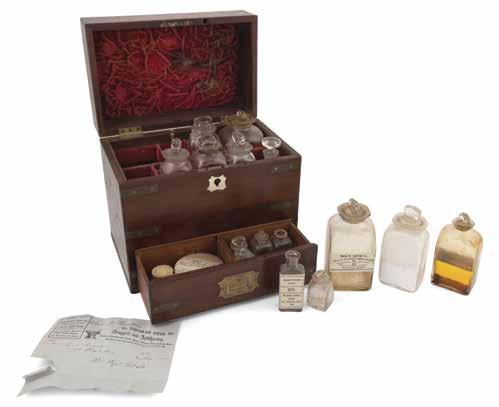
Iron-bound
11
11.25”. Width 17”. Depth 11.5”. 2,000/2,500
Composed of multicolored shells, the left side with a heart, rose and intricate geometric design, and the right side with a star, an anchor, five flower blossoms and geometric designs. Hinged octagonal case, the top beautifully decorated with scene of a distant ship and Lady Liberty seated on a rock and holding an American flag. Each side 13.75” x 14”. 5,000/10,000

4661. CAST IRON FEDERAL-STYLE EAGLE
Late 19th Century

Under old gold paint. On a mahogany base. Height 21.75”. Width 14.25”. 200/300
4662. BRASS MARITIME SPEAKING TRUMPET
19th Century Length 10.25”. 300/400
4663. SHIP CAPTAIN’S SPEAKING TRUMPET
19th Century
Probably nickel. Engraved “George Forrest Ship Lord Ashburton”. Length 8”. 300/500
4664. RARE CAULKING STOOL
Late 19th/Early 20th Century
With steel caulking chisel. Pine stool under old green paint. Height 10”. Width 17.75”. Depth 12.25”. 150/250
4665. TWO CAST IRON CLIPPER SHIP DOORSTOPS
Early 20th Century Heights 8.75” and 9.5”. 200/250
4666. BAY HAVEN YACHT CLUB SIGN
First Half of the 20th Century
Painted decoration of two vessels and the yacht club burgee. 12” x 60.75”. 500/1,000
4667. YACHTING TROPHY PIN
For the 1921 Santa Barbara Regatta from the Southern California Yachting Association. Marked on reverse “Won by ‘Lady Betty’ Los Angeles Yacht Club John Barneson Solid Gold”. Length 2”. 150/250
4668. CAST IRON JACK TAR UMBRELLA STAND
Late 19th/Early 20th Century
Embellished with other nautical motifs. Retains drip pan. Width approx. 17”. 500/700
4666
4671.
YACHT HINGES
20th Century
Stamped “McKinney”. Hinge heights 3.5”. Lengths open 3.5”. 100/200
19th Century
Highly detailed model with fine rigging and deckworks. Black hull with green bottom. Mermaid figurehead under bowspirt. Displayed on a beautiful foliate-carved cradle formed as reclining mermaids. Height 28.5”. Length approx. 43.5”. 3,000/4,000
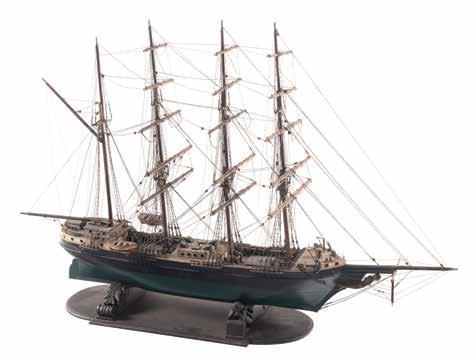
19th Century
Built up in eight applied lifts. Black hull with gold highlighting. Detailed with prow and skeg. Displayed on a cradle. Total height 6.25”. Length 24.25”. 1,000/1,500

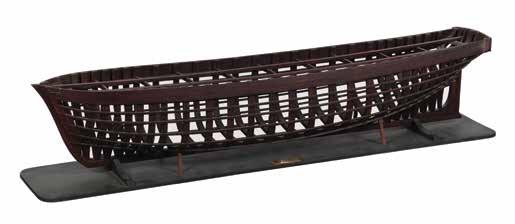
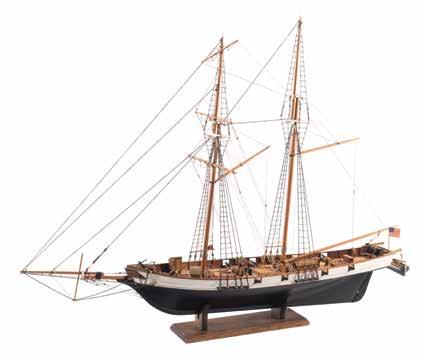
4674. RAFFAELE CORSINI
Italy, Active 1830-1880
“Brig Wilson of Boston Entering Smyrna
Bay November 7th 1853”. Signed lower right
“Raffaele Corsini”. Titled lower margin. Gouache on paper, 17” x 24” sight. Framed 26” x 33.75”. 3,000/5,000
Provenance: A distinguished Beacon Hill, Boston collection.
4675. ATTRIBUTED TO RAFFAELE CORSINI
Italy, Active 1830-1880
“Florence of Boston Wm. G Blackler Commander, Smyrna 1833”. Unsigned. Titled lower center. Gouache on paper, 17” x 21.25”. Framed 26” x 31”. 2,500/3,500
Provenance: Skinner, Inc., February 24, 2002, Lot #38. A distinguished Beacon Hill, Boston collection.
4676. DOMENICO GAVARRONE
Italy, 1821-1874
“Barque Massachusetts owned by Messrs Henry Johnson and Son”. Signed and dated lower right
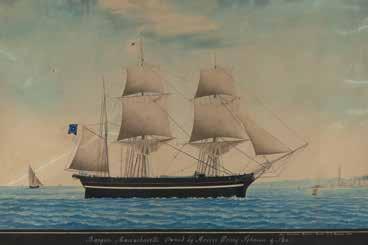
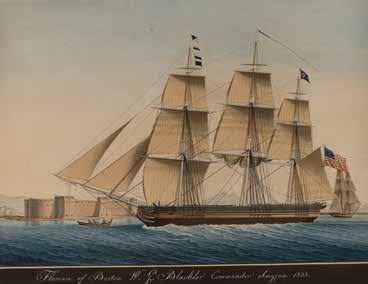

“Domenico Gavarrone Genoa 4 November
1850”. Gouache on paper, 18” x 26.25” sight.
Framed 27” x 36”. 2,000/3,000
Provenance: Diana H. Bittel Arts & Antiques, Bryn Mawr, Pennsylvania. A distinguished Beacon Hill, Boston collection.

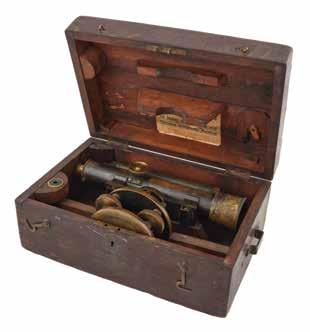
4679. MOUNTED BUILDER’S HALF HULL MODEL OF A SAILING SHIP Hardwood hull built up in 12 lifts. Applied skeg and rudder. Pine backboard 11.5” x 47.5”. 500/1,000
4680. CASED STATION POINTER

London, 19th Century
Engraved “Troughton & Simms London 382”. Includes instructional booklet. Case height 2.25”. Width 19.5”. Depth 8”. 300/500
4681. CASED DRAFTING SET
19th Century
Brass plaque on top of case engraved “Presented to Mr. Samuel Jameson by the Carding & Picking Room Workers Friendly Association for his Gratuitous Services as Treasurer Glasgow April 1855”. Case height 1.5”. Width 7.75”. Depth 5.25”. 100/150
London, 19th Century
Mahogany tube marked “Berge London Late Ramsden”. Length closed 9.5”. 300/400
4683. BRASS THREE-DRAW TELESCOPE 19th Century
Unmarked. Mahogany tube. Felt cover. Length closed 11.5”. 400/600
4684. CASED BRASS SURVEYOR’S SCOPE
London, 19th Century
Marked “Troughton London”. Case height 3”. Width 17”. Depth 6”. 200/300
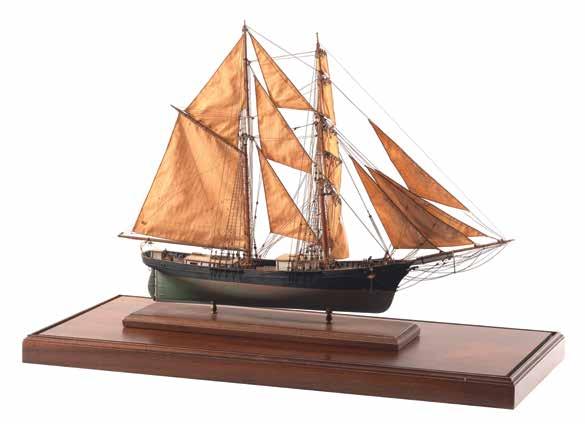



Circa 1990
In 1:384 scale. Solid hull with applied copper foil on the bottom and black topsides with a white sheer band. Veneer deck detailed with coils of line, bit posts, anchor davits, anchor windlass, hatches, pin and fife rails, deck houses, ship’s boat, bilge pump, binnacle, ship’s wheel, etc. Rigged with a bowsprit and two masts, cross spars, and standing and running rigging. Displayed on a pair of brass pedestals within a simple glass and pine display case with brass name plaque. Case height 6.25”. Length 7.75”. Width 3.75”. 800/1,200
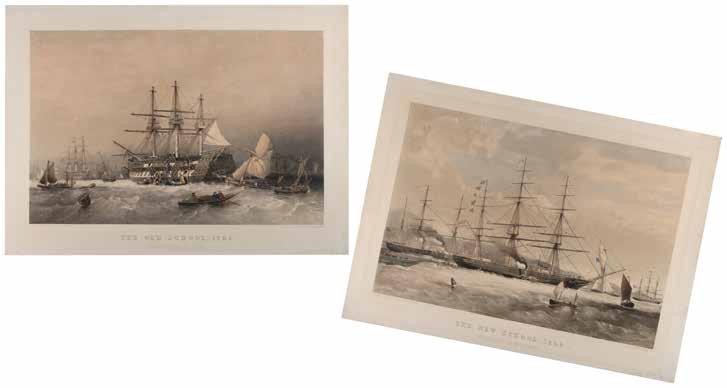
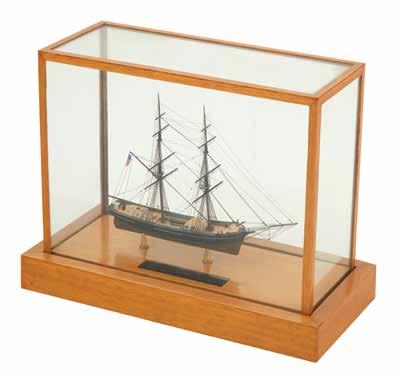
19th Century

Complete
20th
19th Century
Fishing boats in rough seas, 1865. Signed illegibly lower left “H. V… Junior 1865”. Oil on canvas, 31” x 50”. Framed 34.5” x 53”. 1,000/2,000
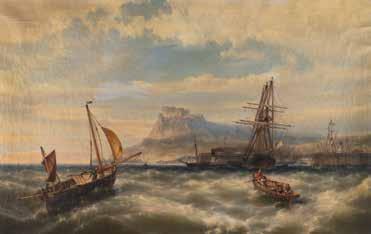
Denmark, 1815-1898
“French Fisherman Among Icebergs off Newfoundland”. Signed and dated lower right “Carl Bille 1864”. Oil on canvas, 16.5” x 24.75”. Framed 22.25” x 30.5”. 1,000/1,500
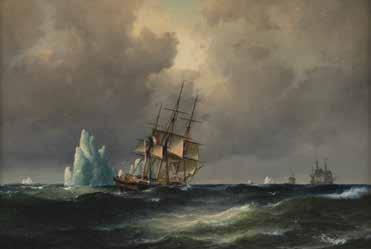
19th Century
A ship under sunset skies. Unsigned. Oil on canvas, 30” x 45”. Unframed. 1,000/1,500
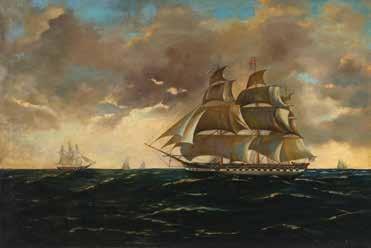
and dated lower right
JOHN FREDERICK LOOS

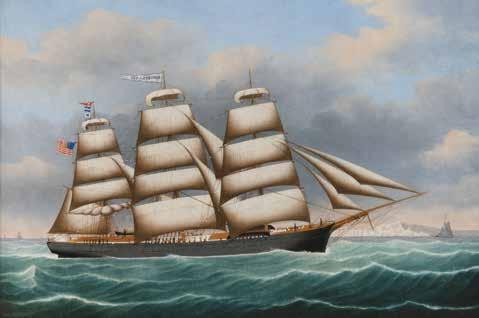
Belgium, c. 1861-1895
faintly lower
4699. FINE SMALL SCALE MODEL OF THE STEEL BARQUE BERWICK LAW OF 1881 BY ROBERT A. WILSON, F.R.S.A. Britain, Circa 1987
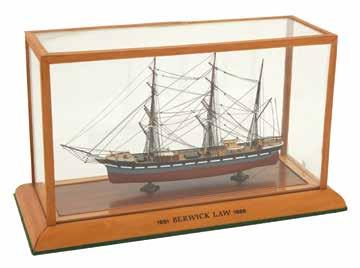
Solid hull with painted red bottom, gray topsides and white hull band. Veneer deck with finely scored deck planking and detailed with capstan, deck rails, companionways, hatches, sail and deck winches, deck house with two lifeboats over, helm, binnacle, deck lights, two ship’s boats with thwarts and oars in davits, etc. Rigged as a ship with a bowsprit and three masts with cross spars, and standing and running rigging. Displayed on a pair of turned brass pedestals on a display base within a glass case. Case height 7.5”. Length 13.5”. Width 5.75”. 800/1,200
4698. MARITIME LITHOGRAPH
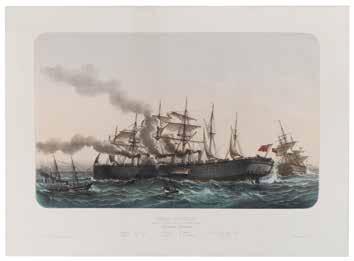
19th Century
“Great Eastern Construit a Londres par feu Mr. Brunel”. Printed by Lemercier & Cie. Published by Eugene Jouy Editeur, Paris. Titled lower margin. Lithograph with hand coloring, 14.375” x 24”. Unframed. 400/600
4700. CASED FRODSHAM & KEEN SEXTANT
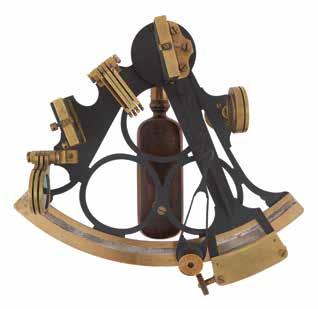
Liverpool, England, Late 19th Century
Marked on scale “Frodsham & Keen Liverpool”. Skeletonized ebonized metal frame. Walnut case with certificate of examination label on interior. Case height 5.25”. Width 10.75”. Depth 10.5”. 300/500
4701. ROSS H. SHARDLOW
Australia, 1950-
The full-rigged ship Joseph Conrad. Signed lower right “R.H. Shardlow”. Pen, ink and watercolor on paper, 23” x 31” sight. Framed 32” x 39.5”. 1,200/1,800
Provenance: Maritime Art Gallery, Mystic, Connecticut. The collection of Dr. John McDonough. Thence by descent to the current owner.
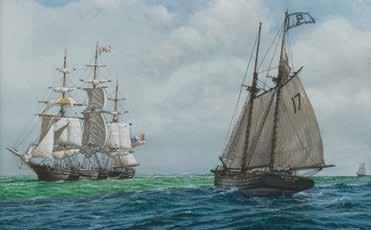
4702. WILLIAM MINSHALL BIRCHALL
England, 1884-1941
“Land in Sight”. Titled, signed and dated lower left “Land in Sight Wm. Birchall 1924”. Watercolor on paper, 7” x 10” sight. Framed 13.25” x 15.75”. 600/800
Provenance: Kennedy Galleries, New York. An important private marine collection, New York.
The ship Tusitala was the last full-rigged merchant ship to fly the American flag. She was an iron-hulled ship of 1,684 tons built in 1883 at Greenock, Scotland as the Inveruglas. In 1923, after being laid up for several years, she was acquired by the “Three Hours for Lunch Club” and renamed Tusitala, in honor of Robert Lewis Stephenson, meaning “Teller of Tales”. She was then acquired by the Farrell Lines and was the last full-rigged ship under the American flag. She was finally scrapped in Mobile in 1947.

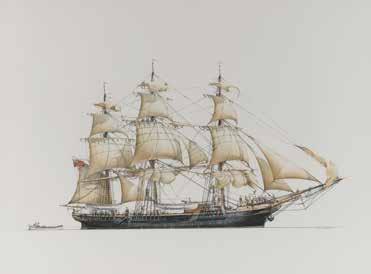
“Breezy Day off Sandy Hook”. Depicts a three-masted American-flagged ship meeting pilot boat #17. Signed lower right “James Griffiths”. Watercolor and gouache, 6.75” x 11”. Framed 15” x 18.5”. 1,000/1,500
Provenance: Mystic Maritime Gallery.
Illinois/France, 1847-1917
Northern Coastline, 1883. Signed and dated lower right “W. Baird 1883”. Oil on canvas, 11.5” x 15.5”. Framed 15” x 18.5”. 300/500
19th
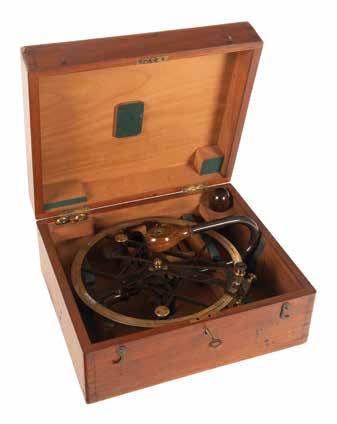
“...

Portrait of an American two-masted schooner. Illegibly identified as “… Hunter”. Unsigned. Oil on canvas, 22” x 32.25”. Framed 26.5” x 36.75”. 1,200/1,800
Connecticut/New York, 1855-1931
A two-masted schooner. Signed lower right “James G. Tyler”. Oil on canvas, 12” x 16”.
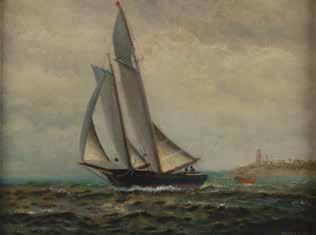
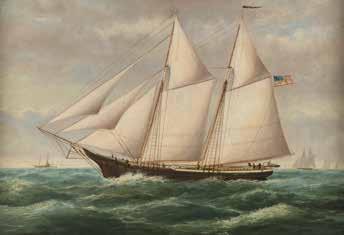

15.75”

Ships
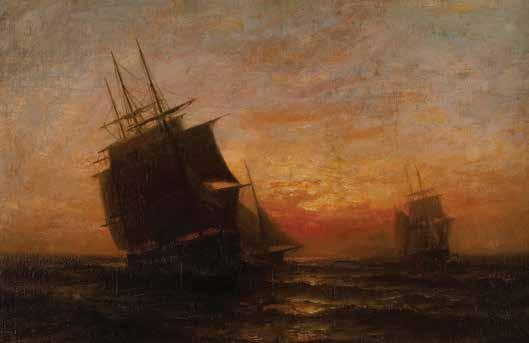
Signed and dated lower right
Three-masted schooner. Signed and dated lower left “S.F.M. Badger 1894”. Oil on canvas, 22” x 36”. Framed
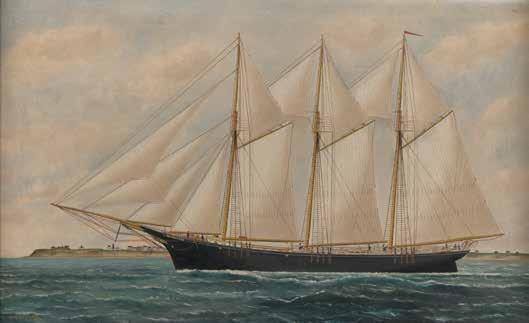
A small skiff hailing a clipper ship. Signed lower left “Montague Dawson”. Watercolor on paper, 11.25” x 17.25” sight.

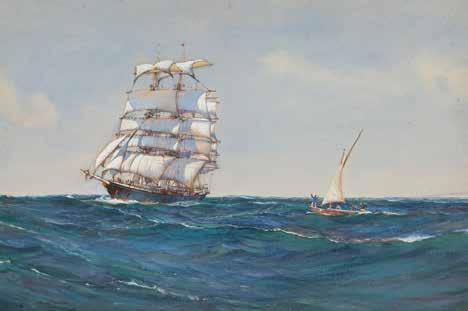
4716. GOBLET PRESENTED TO CAPTAIN W.G. HACKSTAFF OF THE SHIP SHEFFIELD England, Circa 1830
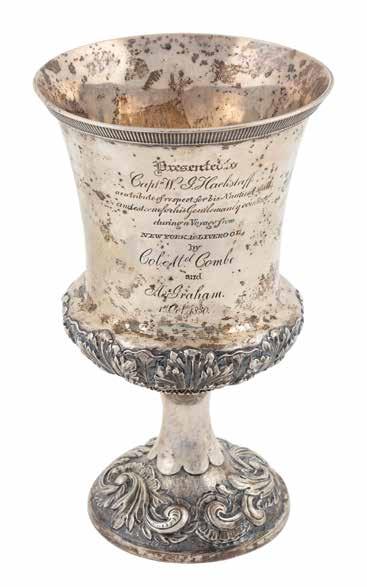
Unsigned silver plate. Flared goblet with banded lip and weighted stemmed base with foliate decoration. Engraved “Presented to Captn. W.G. Hackstaff as a tribute of respect for his Nautical skill and esteem for his Gentlemanly conduct during a Voyage from New York to Liverpool by Colonel Combe and A. Graham. 1st Oct. 1830”. Height 8.25”. Diameter at top 5”. 800/1,200
Provenance:
Captain W.G. Hackstaff, 1830. Thence by descent to W. Scott Keith, Jr., Deerfield, Massachusetts. Skinner, Inc., Boston, 1997. Hyland Granby Antiques, Hyannis Port, Massachusetts.
4717. AFTER GEORGE CANNING WALES Massachusetts/Kansas, 1868-1940
Clipper ship Houqua of New York. Titled lower margin “American Ships XI Clipper Ship Houqua of New York 1844”. Signed and dated on the stone lower left “G.C.W. 1927”. Inscribed lower left outside the plate mark “No. 88 To Alice S. Wales”. Also signed in pencil lower right outside the plate mark “George C. Wales”. Lithograph with hand coloring, 13.75” x 17.5” sight. Framed 16.75” x 21”. 600/800
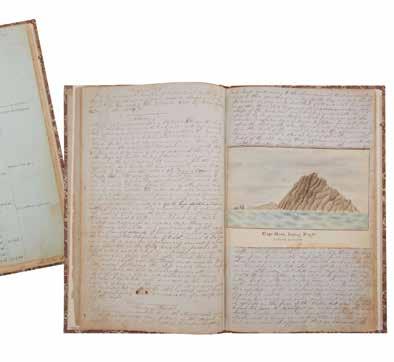
November 1849-May 1850
“Journal of a Voyage from Eastport ME To San Francisco_U_C In The Herm’ Brig Amelia. Captain Joseph Clark Mate Charles Folsom 2d J.D. Norwood”. Twentythousand word journal featuring a watercolor frontispiece and seven well-drawn tipped-in watercolor illustrations.
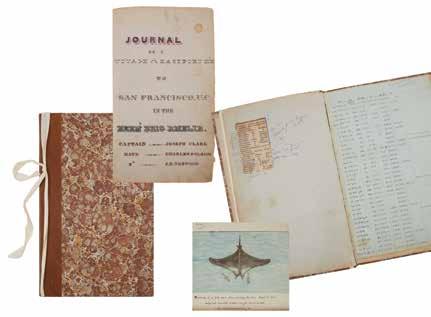
Kept by Capt. Clark, with additional daily entries by D.C. Powers of Eastport, Maine, describing his voyage aboard the hermaphrodite brig Amelia from Eastport to the California gold fields, commencing November 12, 1849 and terminating in the harbor at San Francisco on May 3, 1850. Well-written in a legible hand. Watercolor illustrations depict highlights from the voyage, including a highly detailed hand-drawn and colored map of Amelia’s track around Cape Horn. With title page, printed list of passengers and crew, Abstract Log, map of rounding Cape Horn, and a daily journal of the voyage with additional illustrations of the voyage. Later leather and marbleized covers, the interior front cover marked with a list of the various owners (see provenance below). 13.5” x 8.5”.
4,000/6,000
Illustrations:
Track Around Cape Horn - Frontispiece
Cape Horn Bearing NW by W - Opposite entry for Feb. 10
Brig Amelia in a Gale of Wind - Entry for Feb. 16
Critical Situation for the Brig Amelia - Entry for Feb. 27 Island of Massafuero - Entry for March 7
Cumberland Bay, Juan Fernandez - Entry for March 12
Drawing of a (Devil) Fish - Entry for May 8
Provenance:
D.C. Powers, Eastport, Maine.
Captain Joseph Clark, Eastport, Maine.
Herman M. Lowe, Eastport, Maine.
Florence Lowe Green, Eastport, Maine.
Edna Green (1925).
Alice Marion Green.
Edward ‘Ted’ Thomas.
Hyland Granby Antiques, Hyannis Port, Massachusetts. 4718
This is a rare and important Gold Rush-era document that chronicles one “forty-niners” journey by sea to the California gold fields. It includes descriptions of daily life aboard ship, the harrowing passage around Cape Horn and the author’s impressions of San Francisco at the height of the Gold Rush. Information regarding the hermaphrodite brig Amelia so far is purely speculative -- the illustrations show a relatively small vessel rigged in this fashion, with a clipper bow with a figurehead and a square stern with no galleries, a fairly common design for Maine-built ships. It is likely Amelia was launched from one of the northern yards in the Machias district of Maine. Fairburns records no vessel of any rig named Amelia whose construction date would coincide with the dates of the voyage.
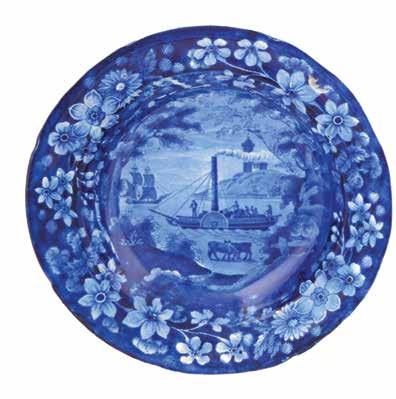

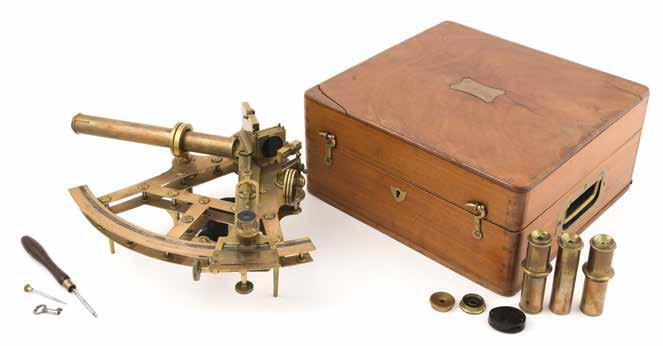
Circa 1850
Signed on the radius “Dancer Manchester” for John Benjamin Dancer (British, 1812-1887). Formed with strips of brass in duplicate and joined with turned brass pillars. Brass arc inset with a silver scale calibrated from 0-150. Fitted with an index arm with clamp and tangent screws, magnifier, vernier scale, lignum vitae handle, two sets of colored filters and telescopic lens with the telescope fitting into the right side and the ebony handle mounted on the left. Fitted mahogany box with additional lenses and accessories. Sextant height 9.5”. Width of arc 10.5”. Box height 5”. Width 11”. Width 10.5”. 3,000/5,000
Provenance:
Christie’s, South Kensington, 2011.
19th Century
1) Dual draw telescope signed on the focus tube near the eye cup “J.P. Cutts London Day or Night”. Mahogany tube with brass end fittings, focus tubes and sliding lens covers. Length extended 37”.

2) Triple draw telescope signed on the focus tube near the eye cup “Dolland London Day or Night”. Maple tube with brass end fittings, focus tubes and sliding lens covers. Length extended 32.75”. 600/800
Provenance:
Christie’s, South Kensington, London, 2002.
John Benjamin Dancer, optician and scientific instrument maker, was the inventor of microphotography. Born in London, Dancer, at different times, held apprenticeships with Ramsden, Dollond and Troughton. In 1841 he established a partnership, Abraham & Dancer, in Manchester. After 1845 he worked alone.
An extremely rare first and only edition pamphlet describing one of the greatest ships ever built, with six lithographed folding plates, two of which fold out to more than three feet in length. Fully titled Description of the Largest Ship in the World, The New Clipper Great Republic, of Boston. Designed, Built and Owned by Donald McKay, And Commanded by Capt. L. McKay. With Illustrated Designs of Her Construction
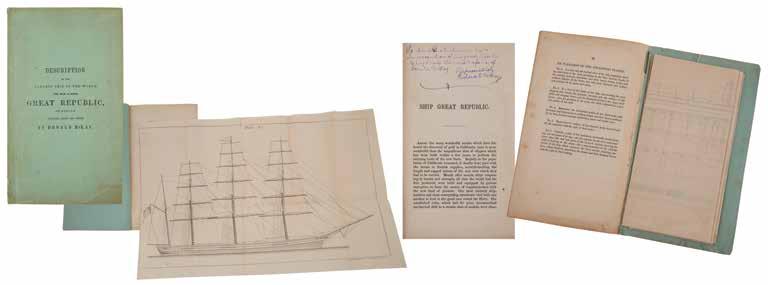
“Written by a Sailor” Duncan McLean. Boston: Eastburn’s Press, 1853. Inscribed on p. 1 “To David D. Nickerson, Esquire In recognition of his good efforts to perpetuate the name and fame of Donald McKay- Appreciatively Richard I. McKay”. Foldouts printed on tissue-like paper. Octavo volume with original printed green wrappers. 24pp. Later clamshell slipcase. Slipcase 10.5” x 6.5”.
1,500/2,500
Provenance: Ten Pound Island Book Co., Gloucester, Massachusetts, 2004.
Great Republic was considered McKay’s masterpiece and was the largest merchant sailing ship ever constructed in the United States. Prior to her maiden voyage, while loading cargo in New York bound for Liverpool, a shore-side fire ignited the ship’s newly tarred rigging and she burned to the waterline. A.A. Low & Brother purchased the hulk and reconfigured her to a more manageable size and cut down her rig. She sailed on the Atlantic run from New York to Liverpool, was chartered by the French to carry troops to the Crimea, and in 1856 was placed on the New York to San Francisco run. Her best time to San Francisco was 92 days. She often posted runs of 400 miles per day and set the record from New York to the equator in 15 days, 19 hours. During the Civil War she served as a troop transport and made two more voyages to San Francisco between 1862 and 1865. She was sold to Nova Scotia interests in 1865 and to Liverpool owners in 1869, who renamed her Denmark. She began leaking and was abandoned off Bermuda on March 2, 1872, where she sank three days later.
California/New
Provenance:
Moran Auctioneers, Altadena, California, 2005.
Watercolors of maritime subjects by Duncan Gleason are relatively rare. The vessel depicted is unidentified, except for the blue swallowtail house flag bearing a white diamond in its center at the mainmast, which identifies her owners as the New England Oyster Company of Boston. Obviously not an oystering vessel, this ship is likely engaged in transporting harvested oysters to markets in various ports.

4724. COLLECTION OF BOOKS, PHOTOGRAPHS AND ARTIFACTS DOCUMENTING THE LIFE OF CAPTAIN MOSES RICH COLMAN

Includes:
1) An 1859-1864 journal kept by Mrs. Polly Colman, wife of Captain Colman.
2) Copy of the New Testament in French, Le Nouveau Testament, edited by David Martin. Société Bibilque Américaine, Fondée: en MDCCCXVL (1850), 1852. 444pp.
3) Copy of Lady Huntington and Her Friends; or…, compiled by Mrs. Helen C. Knight. N.Y.: American Tract Society, 1853. 292pp.
4) Copy of Captain Moses Rich Colman Master Mariner by Addie Cushing Colman. Portland, Me.: The Anthoensen Press, 1949. 119pp.
5) Daguerreotype of Captain Moses Rich Colman by an unknown photographer, circa 1857. 3.5” x 2.75” oval sight. Framed 6” x 5.25”.
6) Sepia tone silver sulfide print of Captain Moses Rich Colman’s home by an unknown photographer. Housed in an Arts and Crafts-style frame with an archival mat. 4” x 7.25”. Framed 13” x 15”.
7-8) Pair of daguerreotypes of Captain Moses Rich Colman and his wife, Mrs. Polly Cole Colman, by an unknown photographer. Housed in a hinged carved Chinese frame with gold decorative liners. Each photograph approx. 2.5” x 2”. Frame open 4” x 6.5”.
9) Daguerreotype of Mrs. Polly Cole Colman by an unknown photographer. Housed in a hinged frame with gold decorative liner.
2.75” x 2.25” sight. Frame open 3.74” x 6.5”.
10) Bromide print of Captain Moses Rich Colman by an unknown photographer, circa 1872. 6.75” x 4.25” sight. Framed 13” x 11.25” oval.
11-16) Six silk and cotton Chinese handkerchiefs.
17) Pair of handwoven Chinese slippers with leather soles.
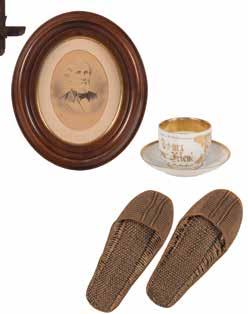
18) The “$50” cup and saucer.
Provenance: Eldred’s, 1995.
800/1,200
Captain Moses Rich Colman was born in Scituate, Massachusetts in 1807. He went to sea at the age of nine, held his first command circa 1842, and retired in 1864. He commanded the schooner Manson, the brig Sarah, the bark Sarah, and the medium clipper Asa Eldridge from 1857 to 1864. During the Civil War he remained out of the country with his ship for 43 months, partly to avoid capture by the Confederate raider Alabama. He never lost or suffered severe damage to any ship he commanded.
Mid-19th Century brass-bound burled mahogany lap desk hinged to open to a green feltcovered slanted writing surface, a pen tray, inkwell holders and a latch pin to release the hidden drawer below. Detailed with recessed handles, escutcheon and corner bands. Lot includes a blue binder containing an archive of approx. 65 letters, written mostly by Capt. Moses Colman in his hand and most addressed to his wife, Polly Cole Colman, along with some transcriptions of letters quoted in the book Captain Moses Rich Colman Master Mariner written by Addie Cushing Colman and published by The Anthoensen Press (Portland, Me.: 1949). A copy of the book is also included, as is some later correspondence pertaining to the publication of the book, references to the artifacts contained in another lot in this sale, copies of charts, a scrapbook with numerous additional letters and documents pertaining to research for the book and to Captain Colman, and a group of related loose copies of charts and other historic documents. Desk height 7”. Width 19”. Depth 10.5”. 1,000/1,500

Late 18th Century ebony T-frame octant, unsigned, with an inset ivory scale calibrated from -5 - 95 and a 17” brass index arm with ivory vernier reading from right to left “0 5 10 15 20”, providing a reading with an accuracy of 1 arc minute. The index arm has a tangent screw fine adjustment feature introduced in the Late 18th Century. Fitted with dual peephole sight, three colored filters, mirrors, brass feet and other details, but it is missing the ivory name plate. The painted black box is heavily worn commensurate with use and age. Lot also includes Colman’s brass navigational dividers, length 7”, and his binoculars with shagreencovered grips, length 7.25” and width 5”, signed on each eyepiece “LeMaire Fab - Paris”.
1,500/2,500

1872
Ten-page letter written by A.G. Smith of Connecticut, signed with the initials “AGS”, to his sister Mernie, of Groton, Connecticut, on December 5, 1872, postmarked January 4, 1873. Narrates his voyage from New York to California and describes first-hand his experiences during the wreck of the sidewheel steamer Sacramento off the Baja Coast in December 1872. Each sheet 8” x 5”.
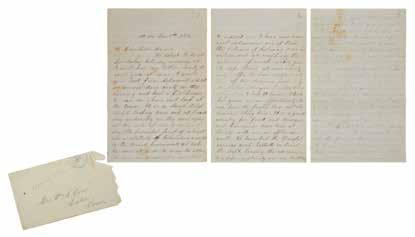
400/600
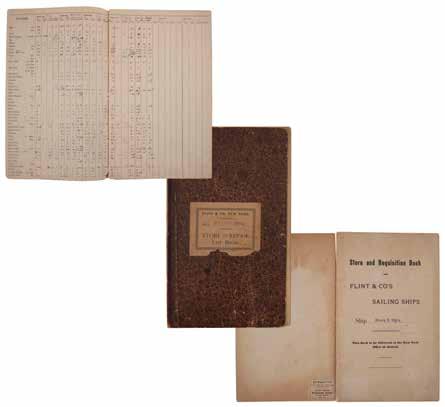
Circa 1897
Store and Requisition Book of Flint & Co’s Sailing Ships
Provenance:
Douglas Stein, Past on Paper, Ledyard Connecticut, 2002.
A.G. Smith departed New York aboard the steamer Henry Chauncy crossed the Panama isthmus and joined Sacramento at Panama City for the voyage to San Francisco. Smith began writing his letter at sea December 5, 1872, describing to his sister his experiences thus far, including crossing the Panama isthmus. That night, Sacramento struck a previously uncharted reef approximately 3 miles from San Geronimo Island off the Baja Peninsula and about 200 miles south of San Diego. The survivors spent six days on San Geronimo Island before being rescued by the steamer Montana and taken to Los Angeles, where they arrived safely December 15. Smith finished his letter, including the shipwreck narration, on board Montana and mailed it after arriving in Los Angeles. The “unknown” reef off Geronimo Island has since been named Sacramento Reef after the first vessel known to have wrecked there. The Sacramento’s 268 tons of general cargo and $1,500,000 in gold coin were salvaged.
Printed by Henry Dawson, Stationer, New York. Frontispiece stamped with the name of the Flint & Co. ship, Henry B. Hyde, and inscribed with the name of the master, D.A. Scribner. Book kept by Captain Scribner and lists, in ledger style with pre-printed categories, for “Stores”, “Canned Goods”, “Cordage”, “Oils, Paints &c.”, “Canvas &c.”, “Carpenter’s Stores”, “Chandlery”, “Sundries”, “Sails &c.”, etc. Each category lists individual supply items needed to maintain the vessel and her crew. The figures and notes have been meticulously kept in a legible hand. Of particular interest is the record of the ship’s sail inventory, kept in a separate hand, obviously by the ship’s sailmaker. Octavo volume, 32pp including half pages, with pre-printed frontispiece and pages. 13.5” x 8.5”. 400/600
Provenance:
The West Sea Company, Old Towne, San Diego, 2001.
These logs were standard onboard the Flint & Co.’s sailing ships and were required to be turned in to the company’s New York office upon completion of the voyage. The ledger documents use and replenishment of stores for four voyages: two from New York to San Francisco (no dates), one from Honolulu to New York (dated 1898), and one from Norfolk to Honolulu (no date).
Research shows the likely date of the painting is based on an illustration by Julian O. Davidson (American, 18531894) for the extremely popular 1887 publication “The Battles and Leaders of the Civil War”, a four-volume set. Widely distributed and containing numerous original illustrations by Davidson and others, it would have been a source of naval subject matter to inspire Yorke. In the painting, as in the Davidson illustration, it would appear the image is not intended to be the record of an actual event but rather a fictional “chase” genre scene. To that point, it is possible to speculate Yorke may have arbitrarily selected the name of one of New York’s most famous clipper ships to give a more regional appeal to his painting.
Alabama was the most successful commerce raider of all time in terms of numbers of vessels seized -- 65. She accounted for nearly $5 million in losses to the U.S. merchant fleet and was responsible, along with her sister raiders, particularly Shenandoah and Florida for a 900 percent rise in insurance rates for American flag vessels. Alabama was finally sunk by the Union screw sloop Kearsage off Cherbourg, France on June 19, 1864.
4729. WILLIAM GAY YORKE
New York/Canada/England, 1817-1892
The clipper ship Challenge fired upon by C.S.S. Alabama Signed lower left “W.G. Yorke”. Circa 1888. Oil on canvas, 24” x 30”. Framed 30” x 36”. 6,000/8,000
Provenance: Vallejo Gallery, Newport Beach, California, 2000.
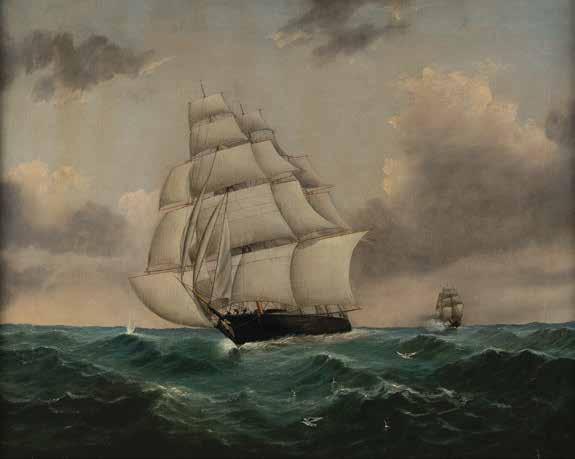
New York/Canada/England, 1817-1892
British brig Queen of the Fleet outward bound off the Skerries. Indistinctly signed and dated lower right “Wm. Yorke L’Pool 1868”. Oil on canvas, 21” x 31”. Framed 26.5” x 36.5”. 3,000/5,000
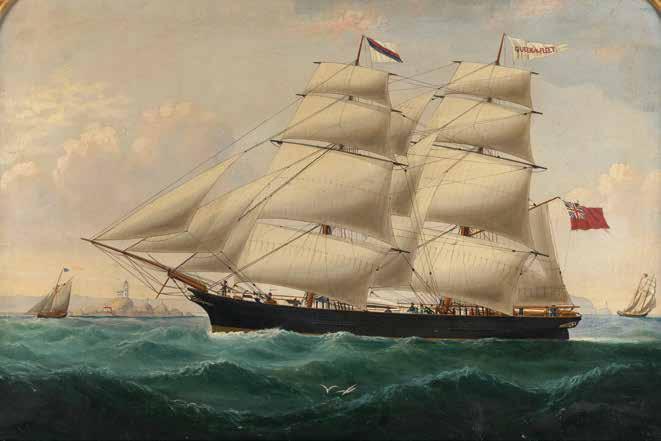
Provenance:
Northeast Auctions, Portsmouth, New Hampshire, 2003.
The brig is identified as Queen of the Fleet by her name pennant at the main masthead. Her owner’s flag, unidentified but likely that of her builder and first owner, E. Cox, is depicted on the foremast and the British ensign is flying from the main gaff peak. South Stack, Anglesey, is visible off the vessel’s starboard quarter and the Skerries Lighthouse is well-depicted under the bowsprit.
Provenance:
Quester gallery, Stonington, Connecticut, 1997.
Herald of The Morning was a medium clipper designed by Samuel H. Pook. From 1855 to 1875 she made 18 west-bound passages around Cape Horn to west coast and Pacific island ports. During that time her record as a fast sailing ship was very well established. The U.S. bark in the background of the painting has flags showing the First Distinguishing Pennant and number 289, identification for the Amazon

4732. WILLIAM HOWARD YORKE
Canada/United Kingdom, 1847-1921
The barque Shenandoah at sea. Signed and dated lower left “W.H. Yorke 1894”. Oil on canvas, 20.25” x 30”. Framed 25” x 35”. 5,000/7,000
Provenance: Christie’s Maritime Sale, New York, 2001.
When launched in November 1890, Shenandoah was the largest sailing ship in terms of cargo carrying capacity built in the United States up to that time. Carrying 33,000 square feet of sail, she was also extremely fast. For most of her career she was employed in the Cape Horn Trade to San Francisco, carrying general cargo and later bulk cargoes of wheat and coal. She also made several passages to Australia, France and England. She was laid up in San Francisco from July 1907 to February 1910, then she made her last passage around Cape Horn with a cargo of asphalt, lumber and scrap iron salvaged from the San Francisco earthquake and fire of 1906. Shenandoah’s long and successful career was ended off the beaches of Fire Island when she was rammed by the steamship Powhattan and sank. Her wreck was blown up by the U.S. Coast Guard in March 1916.
4733. WILLIAM HOWARD YORKE
Canada/United Kingdom, 1847-1921
American ship Grandee off Holyhead, Wales. Signed and dated lower left “W.H. Yorke L’Pool 1874”. Oil on canvas, 24” x 36”. Framed 32.75” x 44.5”. 6,000/8,000
Provenance:
Northeast Auctions, Portsmouth, New Hampshire, 1991.
Literature:
See American Merchant Ships 1850-1900 by Frederick C. Mathews (Salem: Marine Research Society, 1930-31), p.135 for a similar work by Yorke with historical text on the vessel.
This is a relatively early work for the artist, painted when he was age 27, after his father had permanently left for America. It depicts Grandee, built at Portsmouth, New Hampshire in 1874, off Anglesey in North Wales, with South Stack and Holyhead Mountain seen beneath her bowsprit. Yorke has added details such as Captain Jacobs, who commanded Grandee throughout her career, holding the hand of a young boy, likely his son, on the after-cabin top, as well as the intent posture of the helmsman and bow lookout and the decoration on the aft-cabin entrance.
Grandee’s maiden voyage was from New York to Callao (84 days), Callao to San Francisco (37 days), and San Francisco to Liverpool (118 days). For most of her later career her operations were in Australia and the Far East, in the case oil trade. In 1893 Grandee was sold to the Dominion Coal Company of Sydney, Cape Breton and she finished her days in the Canadian Maritimes as coal barge. She disappeared from the Canadian registers in 1912.
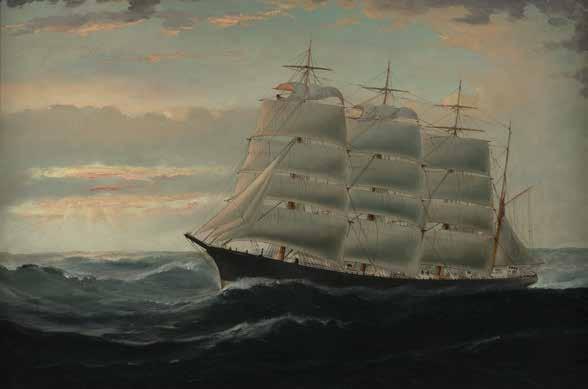

4734. BUILDER’S HALF HULL MODEL OF A SAILING VESSEL

Late 19th Century
In hardwood. Built up in eight lifts. Height 6.75”. Length 48.25”. 500/700
4735. FOUR BUILDER’S HALF HULL MODELS
Late 19th to Mid-20th Century
Varied vessels. One with drafting lines on reverse. The others built up in lifts. Lengths from 17.25” to 29.25”. 300/500
4736. MOUNTED BUILDER’S HALF HULL MODEL OF A SAILING VESSEL
Late 19th Century
Built up in ten lifts. Painted “Utility 1888” at stern quarter. Ebonized backboard 7” x 40”. 300/500
4737. SIX SMALL BRASS TELESCOPES
19th/Early 20th Century
Three with mahogany tubes. Lengths closed from 3.5” to 6”. 500/800
4738. CASED TROUGHTON & SIMMS TRANSIT SCOPE ON STAND
Late 19th/Early 20th Century
Walnut case. Scope height approx. 9.75”. Length 8.5”. 250/350
4739. BRASS SURVEYOR’S TRANSIT London, Second Half of the 19th Century Marked “Troughton London”. Total height 6.5”. Length 21”. 250/350
4740. BRASS STICK BAROMETER
Late 19th Century/Early 20th Century
Metal plate marked “R.N. Desterro Lisbon”. With gimbal. Height 38”. 500/700
4741. SEAHORSE COPPER PORT RUNNING LIGHT
Britain, Early 20th Century
Tagged “Port”. Triangular lantern with rounded front, sliding access panel, mounting bracket, flue and bail handle. Fresnel lens with red liner. Original oil lantern/burner. Height 22”. Depth 10” square. 600/800
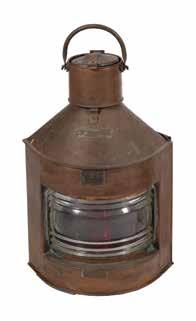
4742. BRASS PORT RUNNING LIGHT
Britain, Early 20th Century
Tagged “Port”. Triangular lantern with a rounded front, mounting bracket, flue and bail handle. Red glass Fresnel lens. Height 18”. Depth 10” square. 400/600
4743. SEAHORSE COPPER STARBOARD RUNNING LIGHT
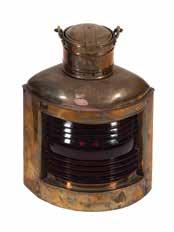
Britain, Early 20th Century Applied maker’s and “Starboard” plates at the top. Lantern with bowed front and square back, hinged top, recessed lens, and a latch and chain holding the pin. Height 13.25”. Depth 14” square. 400/600

4744. BRASS SHIP’S TELEGRPAPH
First Half of the 20th Century By Durkee Marine Products Corporation. Height 52”. 700/900
4745. ORIGINAL SAIL PLAN OF THE U.S.S. KEARSARGE
Drawn at the Portsmouth Navy Yard during her last refit. Inscription in pencil indicates the plan was drawn for equipment May 9, 1888. The Kearsarge was recommissioned at Portsmouth Navy Yard in 1888. 20” x 39” sight. Framed. 400/600
4746. ANTONIO DE SIMONE
Italy, 1851-1907
U.S.S. Raleigh in the Bay of Naples. Titled lower left. Illegibly signed and dated “‘94” lower right. Watercolor and gouache on paper, 15.75” x 23.75” sight. Framed 24” x 32.5”. 700/900
4747. MOUNTED HALF HULL MODEL OF THE STERN-WHEELER W.H. BANCROFT
20th Century
Built up in four lifts, the two bottom lifts to the waterline in maple, the upper lifts in spruce. Detailed with deckhouse, stump masts and sternwheel. Plaque marked “W.H. Bancroft 1912 Copper River Alaska”. Mahogany backboard 11.25” x 38.25”. 600/800

4748. COMMEMORATIVE AMERICAN NAVAL SILKWORK
The Philippines, Circa 1907
“In rememberence of my Cruise in China Japan and Philippine Islands. From 1903-1907”. Portrait photograph at the center on an embroidered Liberty shield surmounted by a spread-wing eagle and flanked by multi-nation draped flags. Oval medallion depicting the “U.S.S. Cincinnati” and an “E Pluribus Unum.” banner below. Framed 29.5” x 25”. 500/800
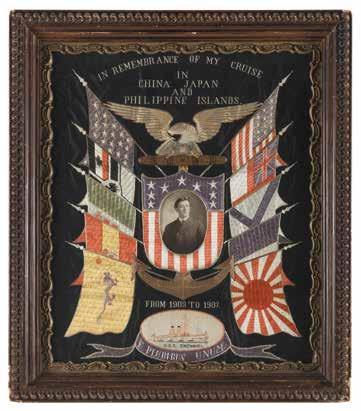
“The

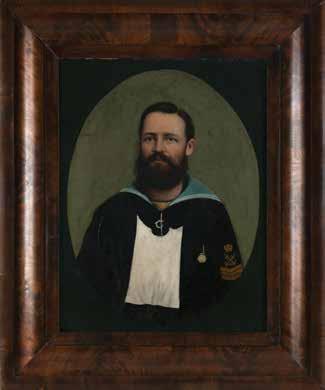
New York/New Jersey/Denmark, 1850-1921
Provenance:
Private Collection, New York, New York. Roberto Freitas Gallery, Stonington, Connecticut. Private Collection, Newport, Rhode Island.
Literature:
Antonio Jacobsen - The Checklist by Harold S. Sniffen (New York: Smith Galleries, Ltd. in association with the Mariners’ Museum, Newport News, Virginia, 1984), p. 280-81, notes two portraits, one in oil and the other a sketch.
The S.S. Corocoro was part of a large fleet of vessels owned by W. R. Grace & Co. (the Grace Line) of New York between 1882-1969. The company was founded in Peru in 1854 by Irish-born William Russel Grace, who later established a merchant steamship line to serve the Americas. The business prospered in the export of guano from the Chincha Islands to the United States, where the fertilizer was in demand.
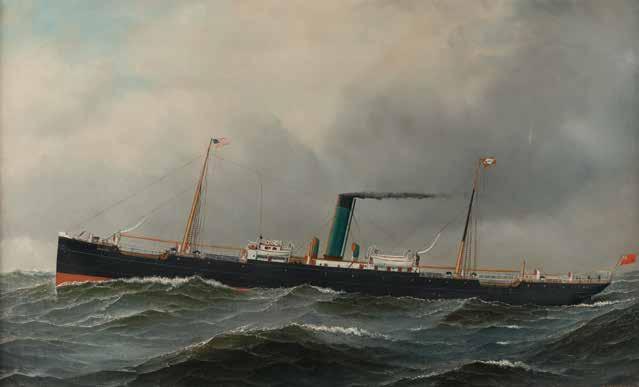
In 1865, W.R. Grace relocated to New York City, where he established the firm of W.R. Grace & Co. By 1880 W.R. Grace had become a leading citizen and was elected mayor of New York for two terms. In 1890, the company entered the steamship business with a line of freighters running from New York to the South American west coast via the Strait of Magellan, flying the British flag. The early British-registered freighters all had names beginning with “C”. As is depicted in this painting, Grace Line’s original British red ensign ships had black hulls, white-painted masts and booms, and a green stack with a black top. The Corocoro is flying the private merchant flag for the Grace Line - red with “Grace” in blue on a white lozenge – on its aft mast and the U.S. flag on its forward mast (for its destination).
The Corocoro was built in 1896. Its service was brief, as it wrecked in 1897 in the Strait of Magellan.
Signed and dated lower right “A. Jacobsen 1894”.
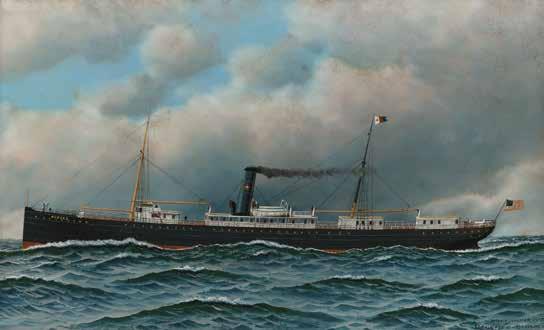

on canvas, 22” x 36”. Framed 26” x 40”. 8,000/12,000
Signed and dated lower right “A. Jacobsen 1915”. Oil on board, 20” x 33.25”. Framed 23.75” x 37.5”. 6,000/8,000
New York/New Jersey/Denmark, 1850-1921
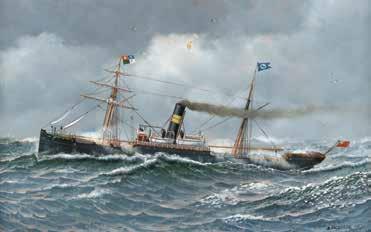

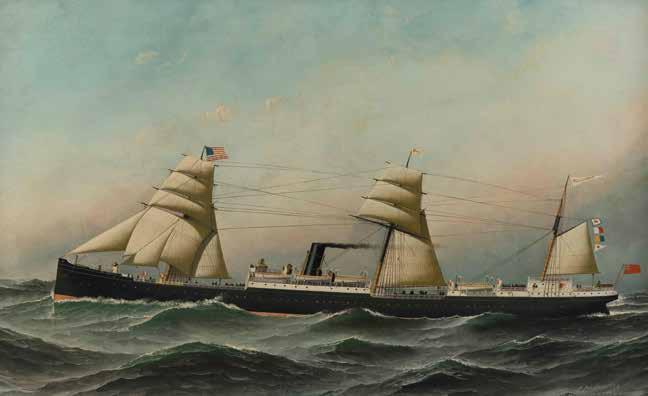
New York/New Jersey/Denmark, 1850-1921
Provenance: Roger King Fine Art, Newport, Rhode Island.
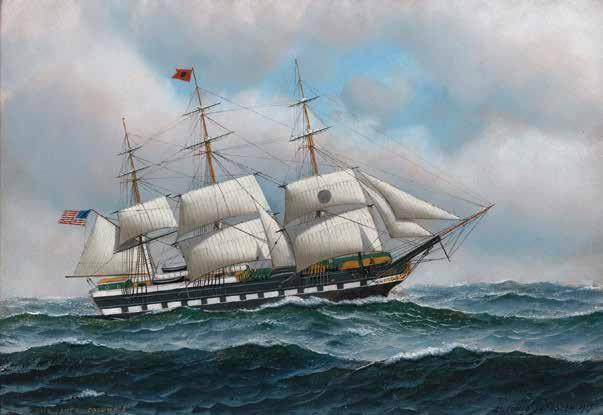
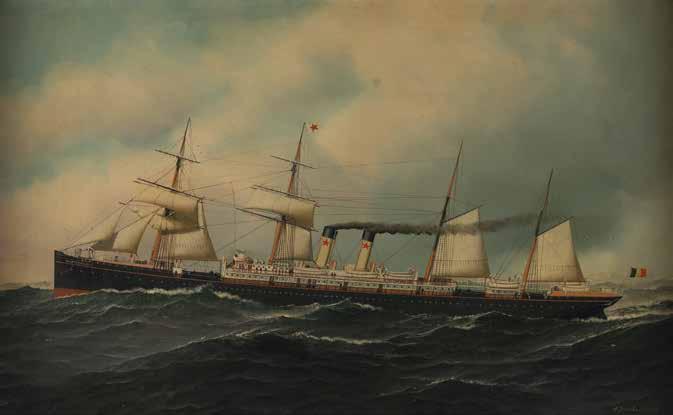
19th Century

Face marked “Hamilton Lancaster, PA. U.S.A. 2E10607
U.S. Maritime Commission”. Crystal diameter 4.75”. Case height 9.75”. Width 12.25”. Depth 10”. 300/500
Rocky
Mid-20th
In
19th Century
The royal yacht Victoria and Albert. Signed and dated lower left “F. Ruschtschilz 1891”. Oil on panel, 9” x 13”. Framed 12.5” x 16”. 600/800
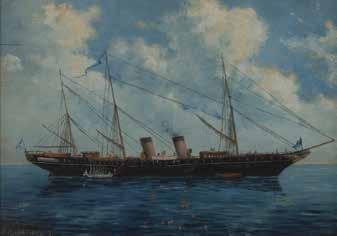
19th Century
Marked “Edward I. Dent 82 Strand London No. 1703”. Housed in a Hamilton Watch Co. box. Chronometer case height 6.25”. Width 6.25”. Depth 6.25”. Box height 9.5”. Width 12.75”. Depth 10.25”. 1,200/1,600
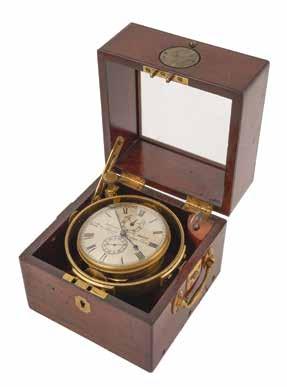
Early 20th Century
Includes six goblets and a tray with presentation inscription “To Captain William A Hall From The Officers and Crew S.S. Admiral Dewey September 21, 1929”. Shaker height 13.75”. Goblet heights 5.25”. Tray length 16.5”. 2,500/3,000

With red and white waterline and black and white topsides. Painted decks well-detailed with winches, bollards, hatches, railings, masts with cargo booms and winches, bridge and bridge wings, life boats, funnels in U.S. Lines livery, and many other features. Displayed on a painted sea with bow and stern waves. Mahogany base with glass cover. Also includes a period photo of the ship by Stewart Bale, 9” x 11” sight, framed 14” x 16.5”. Cased height 12.5”. Length 35”. Width 7.5”. 1,500/2,500
Provenance: The Stephen D. Weinroth Collection.
The second of Albert Ballin’s trio of superliners, the Vaterland, later known as Leviathan, was built at Blohm & Voss and went into service in 1914. Her career as a German passenger liner was brief; while she was docked in Hoboken, New Jersey, the United States entered World War I and seized Vaterland. She was commissioned to the U.S Navy and served as the U.S.S. Leviathan. During her service she carried 119,000 American Expeditionary Force troops to Europe. She was decommissioned from the U.S Navy in 1919 and later resumed transatlantic passenger service in 1923 as the S.S. Leviathan. She continued in passenger service until 1937 when she was sold to the ship breakers Rosyth & T.W. Ward of Sheffield, United Kingdom.

Early 20th Century
Housed in a common
Includes ribbons from the ships: Pennsylvania, President Lincoln, Allen, Kaiser Wilhelm, Kaiserin Maria Theresia, Friedrich der Grosse, Prinzess Irene, Kronprinz Wilhelm, Zieten, Konig Albert, Kronprinzessin Cecilie, Berlin, George Washington, Stuttgart, Bayern, Bremen, Kroonland, Lapland, Lucania, Baltic, Adriatic, President Roosevelt, Leviathan, Republic, Stavangerfjord,
Provenance: Wayne Lepoe Collection.

Provenance:
Maritime Art Gallery, Mystic, Connecticut. The collection of Dr. John McDonough. By descent to the current owner.

Provenance: Vallejo Gallery, Newport Beach, California, 1998.
S.S. President Taft originally launched as one of the “state” ships, completed by the United States Shipping Board as cargo/passenger ships after being laid down as troop transports. Originally assigned to the Matson Navigation Company as the Shipping Board’s agent, the ship was later renamed President Taft and assigned to Pacific Mail Steamship Company for operation. In 1925 the Shipping Board sold the ship to Dollar Steamship Company. President Taft was operated by Dollar and then its successor, American President Lines, until requisitioned by the War Department on June 17, 1941, and renamed U.S.A.T. Willard A. Holbrook
She was at sea when the attack on Pearl Harbor happened, and the convoy improvised defenses, including painting the ships gray while underway. With reports of Japanese activity in the Ellice Islands only some 300 miles away, the Navy ordered a stop at Suva, Fiji Islands, while the convoy’s destination was reconsidered.
She was active in the Pacific Theater during World War II as a troop transport ship, and at the end of the war she was laid up in the Hudson River then moved to the James River Reserve Fleet. In December 1949 the ship was declared surplus and in October 1957 she was sold for scrap.
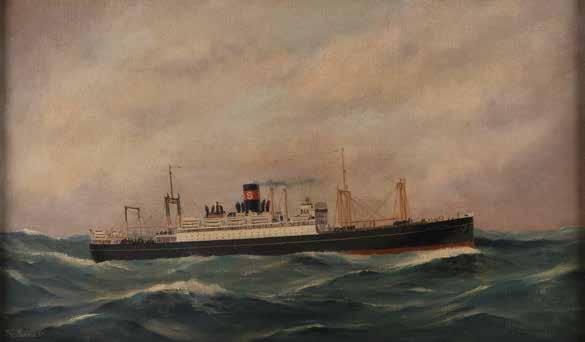
S.S. President Hoover was an ocean liner built for the Dollar Steamship Lines. She was completed in 1930 and provided trans-Pacific service between the U.S. and the Far East. In 1937 she ran aground during a typhoon on an island off Taiwan and was declared a total loss.
Ship built by the Newport News Shipbuilding & Dry Dock Co. Plate engraved with a cross section of the ship, showing the various decks with their heights, and other information relative to docking the vessel. Also includes a second smaller brass plate detailing the removal of the docking plate and the immediate provenance. Docking plate 14” x 12”. Provenance plate 4” x 6”. 700/1,000
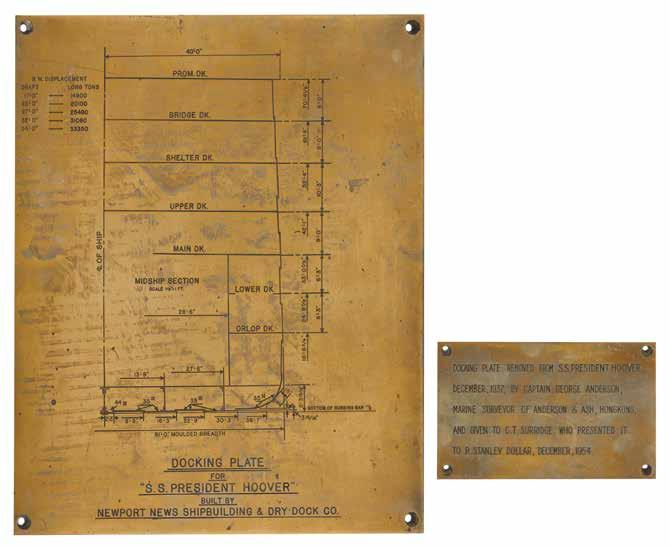
Provenance:
Removed from S.S. President Hoover, December 1937. Captain George Anderson, marine surveyor of Anderson and Ash, Hong Kong. C.T. Surridge. R. Stanley Dollar, December 1954. An unknown private collection.
Circa 1900
Signed in the case “Nederlandsche Instrumentenfabriek Utrecht”. Lacquered brass dial sets up on a collapsible three-footed stand and is suspended by a gimbaled mount and three support strings in a wide semi-cylindrical cradle set with central gnomon and a plumb bob reading against a silvered quadrant scale divided every degree from 0° to 70° latitude. Interior card printed on both sides with time and date lines plus offsets for standard time (as a function of longitude east or west of the standard meridian). An ingenious capstan arrangement enables latitude adjustment by taking up one of the suspension cords, thus tilting the entire cradle assembly. Excellent condition throughout and complete with its fitted mahogany case. Height 11.25”. Width 6.25”. Box height 5”. Width 7.25”. Depth 4.5”. 1,500/2,500
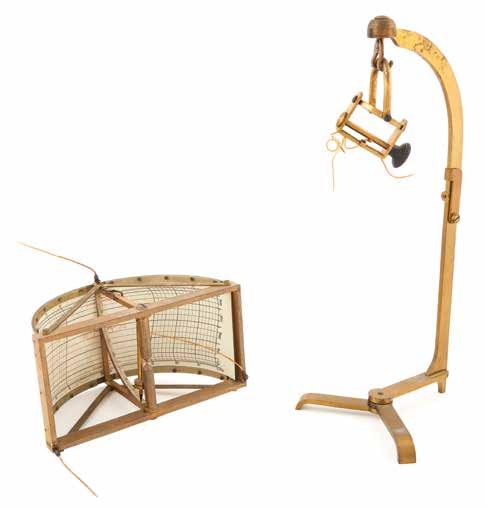
Provenance:
Tesseract, Hastings-on-Hudson, New York, 2013.
Per Tesseract, this innovative, sculptural sundial is the only one known to exist. This example is illustrated in the Dutch sundial book “De Zon als Klok” and was included in a 1983 exhibition of sundials. It was also listed for sale in an early “Antiquarian Scientist” catalogue. The Utrecht firm is recorded, under this name, primarily in the first few years of the 20th Century. Under director Van Huffel they manufactured various scientific instruments, including this most interesting dial, which, according to a descendant of the firm, was designed for an expedition to Dutch Africa.
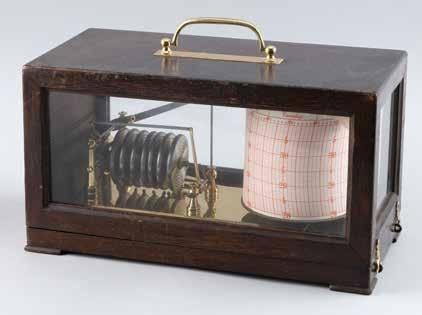
Hamburg, Germany, Circa
Signed on a silvered brass maker’s label “C. Plath Hamburg” and marked with serial no. 2113 on the interior brass plate. Seven compound bellows are attached to a pivoting arm by means of a brass linkage system. The bellows are unique in that they are mounted horizontally, as opposed to the usual vertical placement. The pivot arm scribes on graduated recording paper laid over a revolving brass drum, turned by a jeweled 8-day clock movement, rotating once every seven days. The mechanism is adjustable, and the pen trace may be interrupted when recording is not desired by use of a knurled lever. Built-in key for winding the clock inside the removable brass cover of the drum. A small brass receptacle housing a glass ink bottle is also provided for inking the scribe. Housed in heavy glazed wood case with brass hardware and hinged cover. 600/800
Provenance: The West Sea Company, Old Town San Diego, 2001.
19th and 20th Century
1) Circa 1880 small and simple ebony parallel ruler with brass hinges. Unsigned. Length 12”.

2) Circa 1900 pearwood parallel ruler with brass hinges. Marked with a 14” ruler on one side and a protractor on the other. Signed on the top edge “W.H. Harling 47 Finsbury Pavement, London” and marked “G.E. Holder”, possibly the name of the owner. Length 15.25”.
3) Circa 1950 brass rolling ruler marked with a 42cm ruler on one side and a protractor on the other, with brass rollers and height adjusters. Within a pine box marked on the exterior “Mr. Jack Howard” and on the interior “Jack J. Howard Second Officer S.S. President Monroe American President Lines Around-The-World Fleet”. Unsigned. Length 17.75”. 400/600
The firm of C. Plath was founded by Carl Plath, who purchased the nautical instrument making business of D. Filby in Hamburg, Germany in 1862. Plath quickly gained a reputation for manufacturing the finest quality nautical instruments in the world. His precision sextants are legendary. Carl’s son Theodor joined the firm in 1892 and became a partner in 1899. The elder Plath retired in 1905 and Theodor became sole owner in 1908. The firm continues in existence to this day.4773 4774, three
Signed on the spoke of the frame “H. Hughes & Son. Ltd.” and “Made in Gt. Britain” and further marked with catalogue and patent numbers. 9” circle with two moveable arms, both fitted with tangent screws with micrometer drums moveable through the 360 degree circle. Includes an additional set of arms. Original box. Pointer length 25.5”. Box height 3”. Length 27.75”. Width 10”.
300/500
Provenance:
Eldred’s, Summer Auction of Marine Art, July 1994.
A station pointer can be used to plot the angular bearings of three landmarks taken with a hydrographic circle, or sextant used horizontally.
Signed and inscribed with the maker’s name and the serial number “E.R. Watts & Son, London No. 1596”. Brass frame supports a bar with interchangeable scales and a pair of lenses, the larger fixed but the smaller slides can be adjusted to varying distances marked in feet and yards. Holding the instrument horizontally, a split image is merged by aligning the lenses and the correct distance is then shown on the scale. Fitted with a wood handle. In original box with maker’s label. Length 10.25”. Box height 2”. Width 11”. Depth 3.25”.
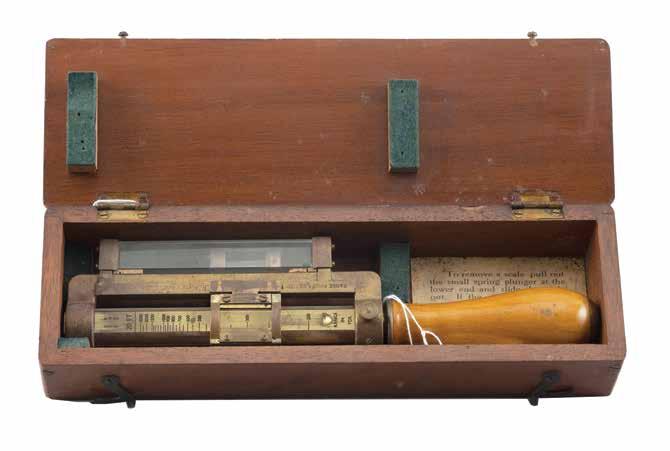
300/500
Provenance: West Sea Company, Old Town San Diego, California, 2001.
By Fairchild Camera and Instrument. Signed and identified with a maker’s plate on the drum with serial number and other details. Sextant incorporates an eyepiece sighting an artificial bubble horizon with two built-in sun filters and is electrically lit for use at night. A micrometer drum provides readout to one minute of arc. The A-10A has an integral electric averager with a continuous one-second pulse and recording disk. The sextant has a calibration report mechanism to record the position of the micrometer drum during each of the observation periods and compensates for the motion of the navigator’s platform. Within the original mahogany case with battery pack and connecting wire. Box height 5.5”. Width 9.25”. Depth 9”. 300/500
The A-10A sextant is a handheld precision instrument, ideally suited to light airplane use. They are compact, lightweight, simple and rugged yet accurate instruments, made mainly of brass and aluminum.
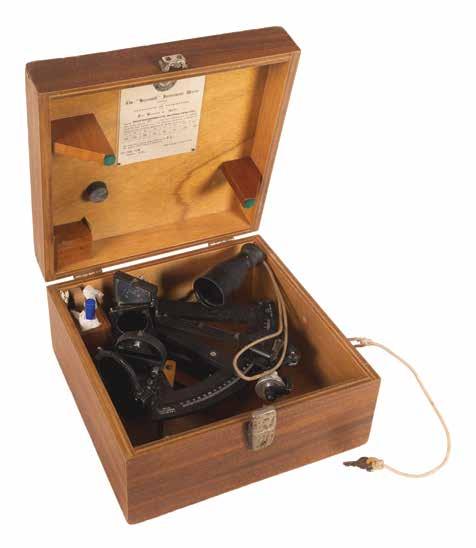
Signed on the radius “Heath Navigational London S.E. 9.”. Black anodized steel frame with the 10-inch radius divided from 0 -125 degrees and the 10-inch radius arm with clamp, fine adjuster and reading light. Fitted with large mirror, two sets of filters, scope and automatic clamp. Within the original box along with a calibration certificate from the Hezzanith Observatory. Box height 6.5”. Width 12”. Depth 12”. 400/600
Signed “Sestrel” on the 4” fluid-damped gimbaled compass card, also marked with primary compass points. Hood with glazed viewing port and fitted with an oil lamp with original oil burner, carrying ring and a base mounting plate. Height 9.25”.
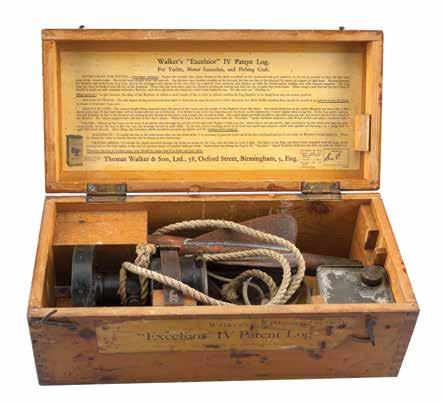
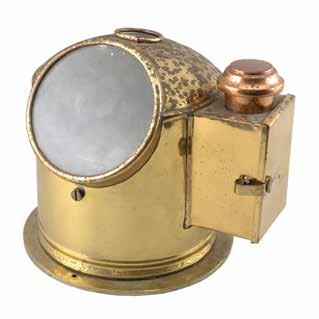
Diameter 8.5”. 300/500
4780.
Marked on the blade of the impeller with an anchor and the initials “TW”. White enamel dial of the log recorder signed above the center “Walker’s Excelsior IV Log”. Sling mount with safety lanyard reads from 0-100m, with sub dial for 1/10th mile. Includes braided log line, original oil can and other parts. Original wooden carrying case with instructions on the inside cover. Box height 5.5”. Width 15”. Depth 7.25”.
300/500
Unsigned. Die-cast aluminum frame with corrosion-resistant gray finish. With inset steel radius scale, magnifier on arm to read fractions, and several accessories including an additional 4 x 40 sighting scope, two wrenches to adjust mirrors and arm, a vial of lubricating oil and a cleaning brush. Length 8.5”. Width 9”. Box height 7”. Width 10.5”. Depth 10.5”.
300/500
Provenance: Sovietski Collection, San Diego, April 1999.
This model is clearly marked as “Bingo I” and is dated February 27, 1959 on the hull interior. Information received from Bob Walstrom, a previous owner of the model and biographer for Luders Marine, states he believes this model to be of Bingo II (hull #1060), a subsequent hull built by Luders in 1966 and jointly owned by Benjamin Gilbert and Luders Marine. This conflicts with the model’s hull markings. Some confusion arises from the list of Luders 5.5-meter yachts named "Bingo” provided by Walstrom, which lists the first Bingo (hull #1032) as being built by Bjarne Aas in Norway in 1963. Both Brewer and Wallstrom agree that Bingo II, sailed by Don McNamara, won the bronze medal in the 1964 Olympics. This seemingly would identify the 1963 hull as Bingo II, with the 1966 hull (#1060) logically being Bingo III. Brewer, who did the drawings for Bingo II, further states Bingo II had the first of Luders’ distinctive “ducktail” sterns. The model has a square stern, conspicuously lacking the graceful downward sweep of Luders’ “ducktail” designs. The evidence points to this being the tank test model for the earlier Bingo I, built in 1959, for which we have as yet been unable to find substantive documentation. Bingo II (Luders hull #1032) was owned by Benjamin Gilbert of Stamford, Connecticut, who may have also owned Bingo I. Her principal helmsman was Bill Luders. She competed under Luders in both the 1963 5.5-meter championships and the Gold Cup. In 1964, sailed by Don McNamara, she won a bronze medal in the Tokyo Olympics.
4782. LOU BANKS TANK TEST MODEL FOR THE 5.5-METER YACHT BINGO II
America, Circa 1959
Built up in wood, the interior hollowed, and the exterior of the hull shaped, faired and finished to a race finish. On the leading edge of the bow, down to the bottom edge of the keel, sand has been glued in place; this sand was used to create a disturbance to the laminar flow, so the flow below the waterline and around the keel could be more easily documented. Exterior of the hull marked #2164, which is the identification number for the Davidson Lab at the Stephens Institute where the model was tested. In addition, the exterior of the hull is marked on the starboard side with station frames and a dotted line that represents an alternative, longer waterline. The interior of the hull is marked “Bingo I - Feb. 27 1959 - LLB Jr”. Also marked with two dates in the hull: February 27, 1959 and December 28, 1964. Inscribed “New type keel, Dec. 28, 1964”; keel modification is visible on model. Height 14.5”. Length 61.25”. Beam 12.25”. 1,500/2,500

Provenance:
Bill Luders, Luders Yachts.
Benjamin D. Gilbert, Darien, Connecticut.
Maine Maritime Academy, Castine, Maine.
Don Mallow & Bob Wallstrom, Blue Hill, Maine.
Christie’s East, Maritime Art Auction #8347, August 2000.
“The America and the Defenders of the America’s Cup 1851-1937”, a limited edition set of colored lithographs, numbered 21/260, published by At The Sign of the Golden Head, New York, housed within a blue portfolio. Includes:
1) Cover plate with a graphic representation of the prints and the America’s Cup.
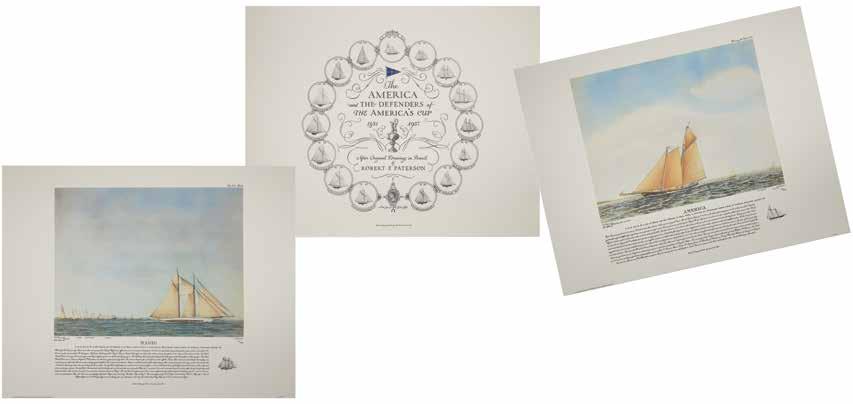
2) 1851, America.
3) 1870, Magic.
4) 1871, Columbia
5) 1871, Sappho
6) 1876, Madeleine
7) 1881, Mischief
8) 1885, Puritan
9) 1886, Mayflower
10) 1887, Volunteer.
11) 1920, Resolute.
12) 1934, Rainbow
13) 1937, Ranger
Each print with a full description of the challenge and an image of the challenger. Sheet sizes 18” x 23”. Images 11.25” x 14.25”. 600/800
Circa 1914
By
PURITAN AND RELIANCE

Circa 1885 and 1903
Period silver bromide print of the Puritan by Nathaniel L. Stebbins and a period silver gelatin print of the Reliance by F.A. Walter. 7.5” x 9.5” and 7.5” x 9.25”. Each framed 11.75” x 15.75”. 800/1,200
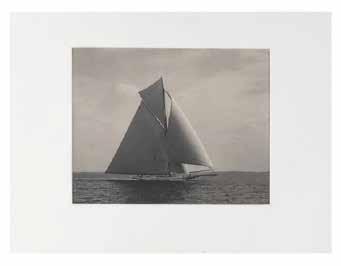
Puritan was the successful defender in the 1885 America’s Cup, easily defeating the challenger Genesta Reliance was the defender in the 1903 America’s Cup and was the largest yacht to ever race for the Cup. She easily defeated Sir Thomas Lipton’s Shamrock III
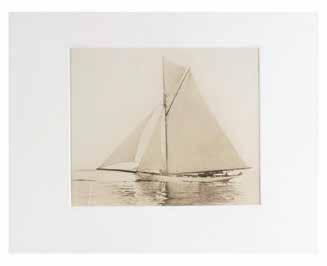
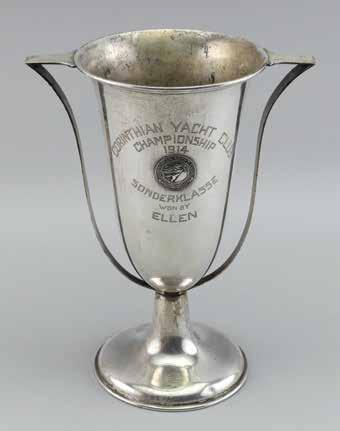
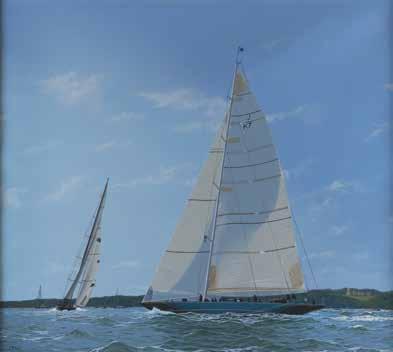
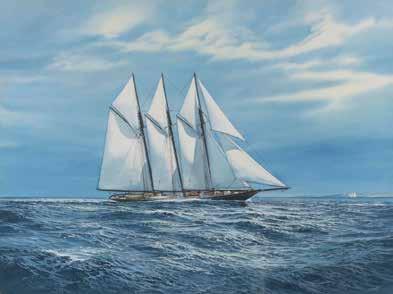
Dated 1969

Marked on underside “W. Hawks Marblehead MCMLXIX”. On carriage. Height 8”. Length of barrel 17”. 1,800/2,200
America, 20th Century
Brass case with a screw-off glass face and a brass eightspoke “ship’s wheel” band, displayed on a mahogany stand. 4” silvered face with blackened Arabic numerals, minutes band and inner Arabic numeral 24-hour band. Signed below the center “Seth Thomas” and marked below the 6 “German Movt.”. Dual drum key winds for movement and strike. With original key. Total height on stand 9”. Width 10.5”. Depth 4.5”. 400/600

London, Early 20th Century Brass case. Red and white enameled face. With key. Diameter 8”. Depth 4”. 200/400
Circa 1915-1919
Marked “Chelsea George E. Butler San Francisco”. Brass case. Arabic numeral dial with second sweep. Crystal diameter 9.25”. Total diameter 12.25”. 3,500/5,000
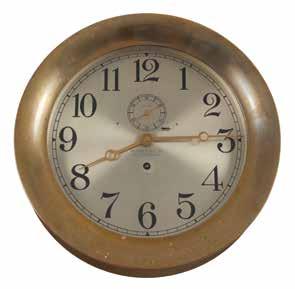
Dated July 9-16, 1910
Seven captioned photos by HB Green Photo, South Boston, housed in a common frame mounted with plaque “Presented to Capt. Ben Nickerson by his friend and admirer John A. Brackett”.
Images include:
1) “Broken Topmast”.
2) “Reaching”.
3) “On the Wind”.
4) “Crew”.
5) “Goldenrod”.
6) “Special Race, Portland”.
7) “Skiyessa IV”. Photos approx. 7” x 9” sight. Framed 33.25” x 28.25”. 400/600
Partial
Photographs
Images include:
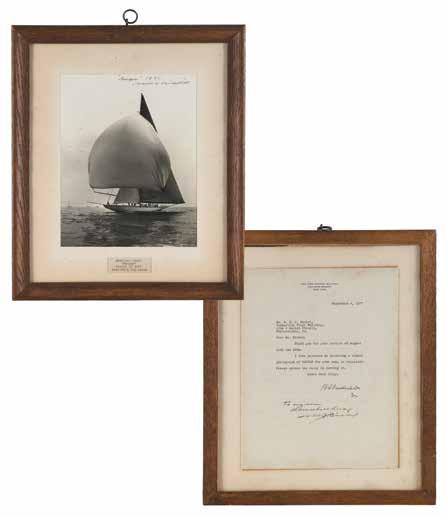
1) “At the Start, 1937” (Endeavour, Rainbow, Ranger, Endeavour II and Yankee).

2) Gretel and Weatherly, 1962.
3) “At the Weather Mark, 1967” (Dame Pattie and Intrepid).
4) Enterprise and Courageous, 1977.
5) “Beat to the Windward Mark, 1974” (Courageous and Intrepid).
400/600
4795.
Photograph “Nina, Last Voyage”. Stamped lower right
“M. Rosenfeld N.Y.”. 19.5” x 15.5”. Framed 26” x 22”. 800/1,000
4796.
Two photographs:
1) Portrait of sailboat number 6-21. Stamped lower right
“Morris Rosenfeld N.Y.”. 9.5” x 8”. Framed 16” x 13”.
2) Portrait of a small sailboat. Stamped lower right “Morris Rosenfeld N.Y.”. 9.25” x 7.25”. Framed 10.25” x 8.5”. 300/400
4797.
Two photographs:
1) Sailboats and a battleship. Unsigned. 7.25” x 9.25”. Framed 13” x 15”.
2) Portrait of yawl number 17. Stamped lower right
“Morris Rosenfeld N.Y.”. 7” x 8.5”. Framed 11” x 13”. 400/600
4798. MORRIS ROSENFELD
Photograph “Roamer, ‘41”. Signed in white lower right
“Morris Rosenfeld N.Y.”. Inscription on back indicates the vessel was mahogany on oak, had a Sterling engine, was built in Thomaston, Maine as a one-off, 1937, the owner was Lester Abberley, and she had a speed of 12 knots.


13.5” x 16.5”. Framed 21” x 24”. 400/600
4799. MORRIS ROSENFELD
Photograph of the Geredna. Signed in black lower right
“M. Rosenfeld N.Y”. The vessel was owned by Joseph E. Higher of New York, was 72 feet in length and had twin Sterling Dolphin 8 engines. 11” x 17”. Framed 18” x 23”. 300/400
4800. STANLEY ROSENFELD
1913-2002
Photograph Full Spinnaker. Stamped lower right.
13.5” x 10.75”. Framed 20” x 17”. 300/400
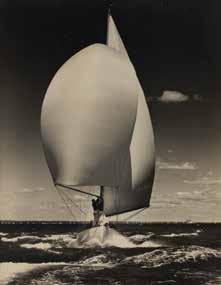
By Castello Ship Models. Built in 3/8” scale. Shaped and faired in wood, and with a painted white hull, blue top edge and red cove stripe, the deck left natural. Mounted on a mahogany backboard, signed on the back by the maker. Backboard 8.5” x 29.25”.

400/600
Enterprise is a 1977 S&S-designed 12-Meter, originally built to defend the America’s Cup. Designed by Olin Stephens and David Pedrick at Sparkman & Stephens, and built of aluminum at the Minneford Yacht Yard, Enterprise boasted a number of firsts. She was the first design to be tank tested on a large scale, with a handful of models measuring roughly 7 meters, in tanks designed for the aerospace and military industries. Enterprise was also the first yacht to pioneer laminate sails, using plastic film to stabilize the more conventional Dacron. By all rights she should have been the defender of the 1977 America’s Cup but lost out to Courageous, who consistently improved over the elimination trials.
By Castello Ship Models. Built in 3/8” scale. Shaped and faired in wood, and painted with a dark blue hull, three white lines at the sheer and the name aft of center. Deck left natural. Mounted on a mahogany backboard, signed on the back by the maker. Backboard 8.5” x 29.25”.

500/700
The 12-meter yacht Freedom was the winner of the 1980 America’s Cup, defeating Australia Freedom was designed with an alloy hull by Olin Stephens and Bill Langan and constructed at Minneford Yacht Yard. She was skippered in the Cup by Dennis Conner.

Circa 1983
By Castello Ship Models. Built in 3/8” scale. Shaped and faired in wood, and painted with a dark red hull, with the name aft of center and the deck left natural. Mounted on a mahogany backboard. Backboard with a brass syndicate plaque lower right and the maker’s label affixed to the back. Backboard 8.5” x 29.25”.
600/800
The 12-meter yacht Liberty (US-40) was the defender of the 1983 America’s Cup, losing to Australia II 3–4 in a close series that would change the future of the Cup.
Circa 1983
Circa 1992
Built in 3/8” scale. Molded hull, rudder and painted winged keel. Hull in white paint with green and yellow sheer stripes and the name aft of center. Mounted on a mahogany backboard. Backboard 8.5” x 29.25”.
300/500
The 12-meter yacht Australia II (KA 6) is an Australian racing yacht that won the 1983 America’s Cup for the Royal Perth Yacht Club. Skippered by John Bertrand, she was the first successful Cup challenger, ending a 132-year streak of victories, including 26 successful defenses, by the New York Yacht Club.
Circa 1988
By Ken Gardiner (American, 1948-2013). Molded hull painted gunsmoke blue/gray with white topsides, struts, rudder and daggerboard, and with the name applied aft of center on the hull. “Stars & Stripes ‘88” was a catamaran, and thus this model depicts her starboard hull. Mounted on a teak backboard. Brass name plate on backboard. Backboard 7.75” x 26”.


300/500
By Scott Chambers. Hull built up from the solid and painted white with the America3 logo and graphics. Mounted on a mahogany backboard. Brass identification plaque on backboard. Backboard 7” x 27.75”.

Provenance:
Maritime Art Gallery, Mystic, Connecticut. The collection of Dr. John McDonough. Thence by descent to the current owner.
400/600
4808.
4807
Massachusetts, 1945Portrait of a Friendship Sloop. Signed lower left “D. Athas”. Oil on artist panel, 18” x 24”. Framed 24” x 30”. 2,000/3,000
1998
In ½” to 1-foot scale. Hull built up in wood, with applied keel, skeg and rudder, and the bottom and topsides painted white, with a bright finished rub rail. Simple deck painted pale blue and detailed with stem fitting, splash rail, jib tracks and cars, jib winch and cleats, cockpit coaming, etc. Interior of the cockpit painted a bright blue and detailed with hull frames, floor boards, mainsheet post, coils of line, and on the aft deck the tiller and mainsheet traveler. Rigged as a Marconi sloop with standing and running rigging, main with the Star Class logo and jib. Displayed on a keel block within a glazed case with brass trim, black base and brass builder’s plaque. Case height 21.25”. Length 14.25”. Width 6.75”. 700/1,000
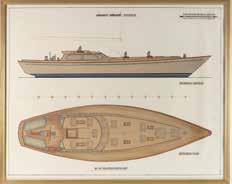
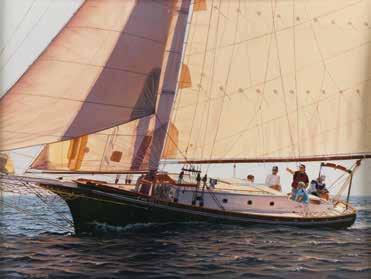
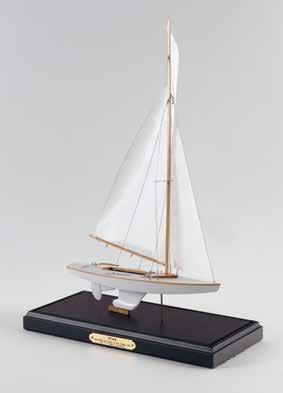
One of the earliest and largest one-design classes in the world, the Star was designed by William Gardner in 1906 for his friend and fellow sailor, George Corry, “Father of the Stars”.
Pair of yacht plans. Marked “Ted Hood Design Group”. Mixed medias, 31.25” x 39.5”. Framed 33” x 43”. 2,000/3,000
4808

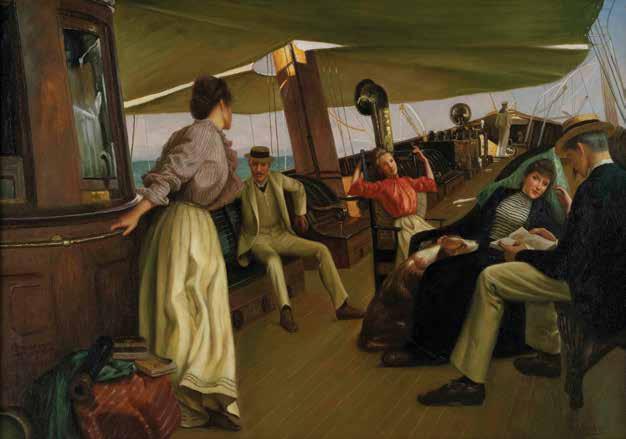
Hull painted light and dark blue with a white bootstripe. Mounted on teak backboard with an identification plaque lower right. Illegibly signed verso. Backboard 16.75”


Painted white above and green below the waterline. Thomas D. Bowes (1883-1965) founded his naval architecture firm in 1905, located in Philadelphia’s Delaware River district. He designed more than 80 tugboats and several Philadelphia fire boats as well as commuter and houseboat yachts. He also notably designed the Lenore II, which was refurbished and renamed Barbara Ann by Dwight Eisenhower and used as the presidential yacht. It was later renamed Honey Fitz by President John F. Kennedy during his administration. Height 11”. Length 52”. Width 10”. 3,000/5,000
Provenance: Removed many years ago from Thomas D. Bowes’ office on Chestnut Street, Philadelphia. Hyland Granby Antiques, Hyannis Port, Massachusetts, 2002.

Sailboats, Breton, France. Signed lower right “Hayley Lever”. Watercolor and graphite on paper, 8.75” x 18.75”
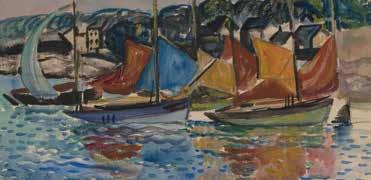
1,000/2,000
Summer sail, 1915. Signed and dated lower right “Hayley Lever ... 1915”. Watercolor on paper, 9.25” x 13” sight. Framed 20.25” x 23”. 800/1,200
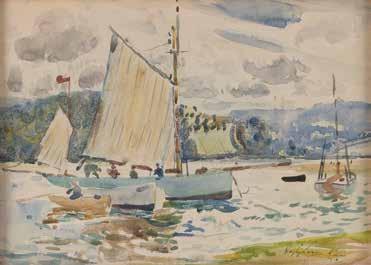
Fishing boat moored at a dock. Signed lower right ”John Hare”. Watercolor on paper, 9.5” x 11.75”. Framed 17” x 19”. 300/500
Hull built up from the solid with painted red bottom, white waterline, black topsides and gold sheer stripe. Deck scored and detailed with anchors and chain, windlass, deck houses, pin and fife rails, raft canisters, boom crutch, traveler, etc. Rigged as a gaff schooner, with a bowsprit, two masts, booms, gaffs, standing and running rigging, and cotton sails with seam
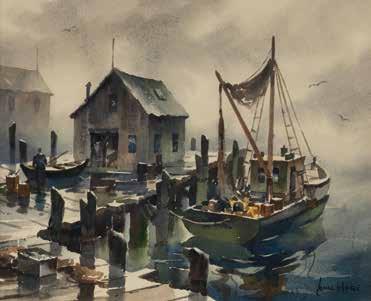
Late 20th Century
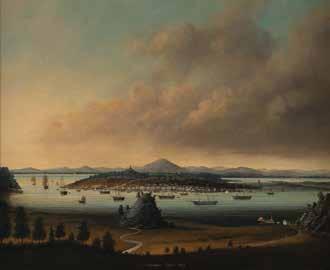
Composed of multicolored shells in geometric and floriform patterns. Bulbous rectangular mahogany case. Case height 3”. Length 18”. Width 11”. 1,800/2,200
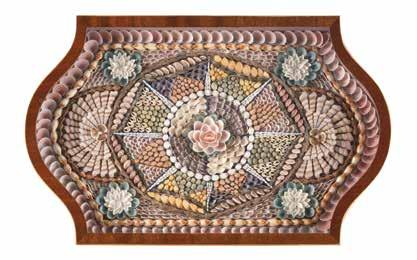
America/England, 1939“Wampoa, China 1851”. Signed lower right. Oil on panel. 800/1,200
America/England, 1939Portrait of a three-masted ship. Signed lower right “Brian Coole”. Oil on board, 26” x 49.5”. Framed 32.25” x 56”. 1,500/2,500
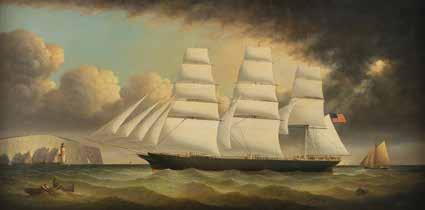
4823.
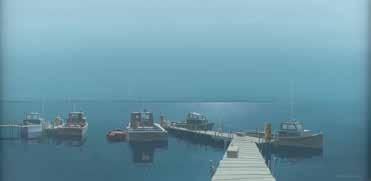
Modeled in cast metal and painted with a black bottom, a wide red waterline, white topsides and gray decks. Detailed with cargo hatches, masts and hoisting booms, main deck structure, bridge wings and life boats on davits, etc. Displayed on a pair of turned brass pedestals on a simple pine base with a glass cover. 400/600

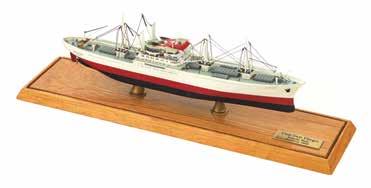
Circa 2000
By Rex Stewart for the New England Steamship Foundation. Molded hull painted with a red bottom and white topsides. Decks painted gray and detailed with anchors, flag staffs, companionways, deck house with bridge and bridge wings, name boards, ventilators, funnel skylights, benches, life boats rigged on davits, life rings, etc. Displayed on a pair of brass pedestals within a mahogany and glass case. Case height 7”. Length 16.25”. Width 4.75”. 600/800
4824. KEITH REYNOLDS, A.S.M.A. America, 1929Crisfield Moorings. Signed and dated lower right “Reynolds 1990”. Acrylic on canvas, 13.5” x 27.5”. Framed 17.5” x 31.5”. 2,500/3,500
Provenance:
Annapolis Marine Art Gallery, Annapolis, Maryland. The collection of Dr. John McDonough. By descent to the current owner.
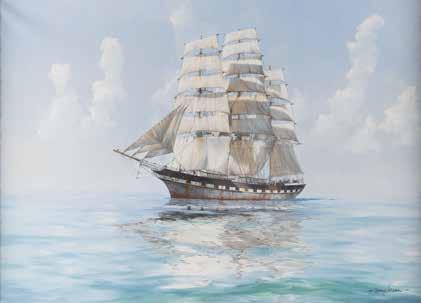
England, 1947-
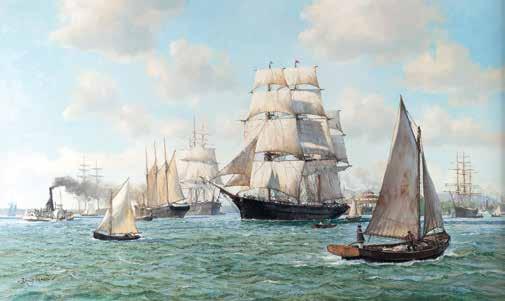

4829.
Circa 1975
Built in ¼” scale. Pre-formed hull with a cream-colored bottom, white waterline and black topsides. Detailed with rudder, propellers, anchors, the name fixed to the bow, etc. Foredeck modeled as a steel plate with the other decking planked in basswood and fitted with various details including hawse pipes, bollards, anchor windlass, ventilators, fire hose tower, masts, deckhouse built up and fitted with a wood cabin top, running lights, search lights, railing, binnacle, radar ring, portholes, ladders, boats rigged on davits, funnel, tow hook on a rotating arc, reels with line, towing guards, etc. Displayed on a pair of brass pedestals on a green silk moiré-covered base within a mahogany-trimmed glass cover and a mahogany base. Case height 20.75”. Length 39”. Width 10.5”.
1,500/2,500
4830. DETAILED MINIATURE SCALE DIORAMA OF A ROYAL NAVY ‘FLOWER’ CLASS CORVETTE

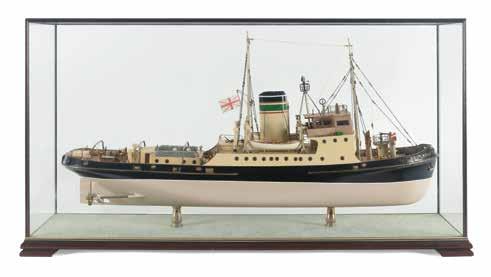
AS OF 1944
Circa 2002
By John Evans. In 1:600 scale. Hull finished gray with “rust” streaks along the side. Detailed with portholes, communication mast, anchors, deck rails, bollards, anchor winch, main and secondary armament, superstructure with open bridge, ventilators, funnel, covered boats in davits, inflatable rafts, companionways, depth-charge rack with depth-charges, etc. Set within a molded North Atlantic sea within a glazed wood-bound display case. Case height 4”. Length 7.25”. Width 5.25”. 700/1,000
4831. EXHIBITION STANDARD MODEL OF THE AMERICAN LIBERTY SHIP ANGELINA
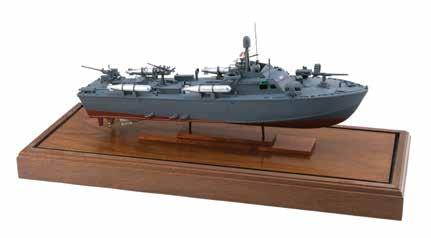
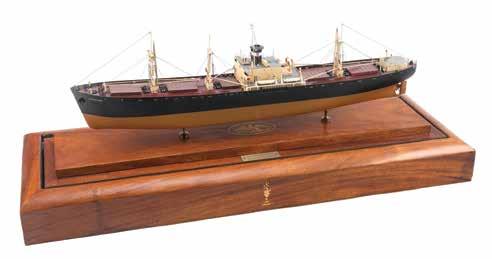
Circa 1987
By Alan Raven (English/American, 20th Century). Hull built up from the solid, with a painted rust red bottom, white water line and black topsides. Bow and stern with draft markings, rudder and propeller. Deck in rust red and detailed with anchor windlass, bollards, ventilators, cargo hatches, booms and windlasses. Main deck structure painted white and detailed with funnel, helm station, canopy frames, life boats on davits, docking bridge, raft, etc. Displayed on a pair of brass pedestals in a brass-trimmed glass and mahogany case that has an inlaid American eagle under the hull and an inlaid flourish just below the plaque. Case height 17”. Length 35.5”. Width 11.75”. 2,500/3,500
4832. CASED U.S. NAVY BEARING CIRCLE
20th Century
By the Lionel Corporation. Case height 4.25”. Width 11.75”. Depth 11.75”. 125/175
4833. EXHIBITION STANDARD MODEL OF THE HIGGINS PT BOAT, PENNANT #834
America, 20th Century
Hull built up from the solid and painted with a red bottom and gray topsides, deck and most of the fittings. Well-detailed and to scale including anchors, deck boxes, bow gun, deck house radar, anti-aircraft turrets, raft, torpedoes, stern guns, etc. Displayed in a glass case with a mahogany base. Case height 11”. Length 29.25”. Width 10”. 1,000/1,500
Circa 1940
Hull built up in five lifts, shaped, sanded and faired, with the bow notched for the anchor hawse pipe, four propeller shaft housings at the stern, the deck stepped at the bow and after-deck, and the bottom painted dark red. Mounted on a pair of brass pedestals on a stepped board. Height 7”. Length 38.75”. Width 6”. 600/800

20th Century
Die cast models. One World War II-era case with 15 German ships. Other case with a “collector’s choice” of 32 rare examples of differing nationalities, many post-War. Most ships with identification labels. Exterior of cases painted gray, one with stenciled lettering. Interior of one case painted blue. Ship lengths to 8”. Case heights 11.5” and 12.25”. Lengths from 15.5” and 16”. 1,500/2,500
Die cast models of U.S. Navy and Merchant Marine ships. One case includes 14 ships, one with 16 and one with 48, most with identification labels. Exterior of cases painted gray and with stenciled lettering. One marked “Restricted Property of A.A.F. Miniature Metal Models of Merchant Ships ... Made b So. Salem Studios So. Salem, N.Y.” and one with label “Special Devices Division USN Bureau of Aeronautics ... Japanese Miniature Ship Models ... Mfrd. By Comet Metal Products Co., Inc. ...”. Interiors painted blue. Ship lengths to approx. 10”. Case heights from 10” to 14”. Lengths from 11” to 27”. 2,000/4,000

Wisconsin/Florida,
Coast
Provenance: H.V.
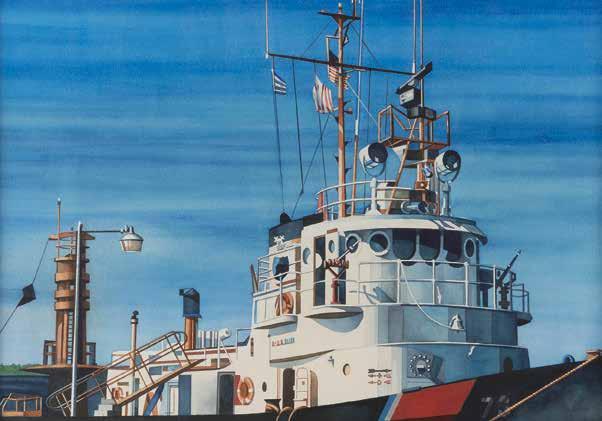
A. LEMUEL D. ELDRED
Massachusetts, 1848-1921
In our opinion, this is a work by the artist.
B. ATTRIBUTED TO LEMUEL D. ELDRED
Massachusetts, 1848-1921
In our opinion, probably a work by the artist based on the style of the piece, however, the work lacks a signature, marking or adequate provenance to fully ascribe it.
C. MANNER OF LEMUEL D. ELDRED
Massachusetts, 1848-1921
In our opinion, a work made in the style of the artist listed, most likely by a follower or student.
D. SCHOOL OF LEMUEL D. ELDRED
Late 19th Century
In our opinion, a work executed at the time and in the style of the artist listed.
E. AFTER LEMUEL D. ELDRED
20th Century
In our opinion, a work made in the style of the artist listed, but not by the artist. Often used to describe a direct reproduction of an original work of art.
If a date and location are included in a heading, it is our opinion the piece is essentially of the period and was made in the area indicated. The inclusion of the world “style” in the heading indicates the piece was made at a later date as an intentional reproduction of the earlier style.
Dimensions
Unless otherwise specified, dimensions are formatted
Height x Width. Dimensions are approximate as they are often rounded to the nearest quarter inch. Furniture and other objects are measured to the tallest and widest points. Paintings are measured by the dimensions of the stretcher or supports. A “sight” measurement is the visible size of an artwork if the piece is obscured by its frame or matting.
Condition reports can be viewed at www.eldreds.com. The absence of a condition report does not imply an object is free of defects or restoration. If provided, a Condition Report may only detail flaws or restorations, and may not take into account wear, fading or other issues consistent with an object’s age. Please contact Eldred’s before bidding with any questions as to condition.
The property listed in this catalog will be offered and sold subject to the terms and conditions listed in this catalog.
1. Carefully read the Conditions of Sale.
2. Pre-sale estimates are provided by the auctioneers for the convenience of our customers. They are not meant to be taken as a guide to the value of an item, but as a guide to its expected selling price. Estimates are prepared well in advance of a sale and are subject to revision.
3. Carefully examine any item that you might consider bidding on for any variation from the catalog description. If you are unfamiliar with auction procedure or terminology, or if you would like clarification of a catalog description, please ask for assistance from our staff.
4. If you wish to leave an Absentee Bid or request a Telephone Bid, please review the Absentee/Telephone Bid Procedure and complete the Bid Form.
5. A buyer’s premium will be added to the hammer price of all property sold, to be paid as part of the purchase price. The buyer’s premium is 25% of the final bid price up to and including $500,000, and 10% of the final bid price over $500,000.
6. Online bidding is available at www.eldreds.com and with a 25% buyer’s premium. Prospective bidders must register and be approved prior to placing bids or bidding live online.
7. Eldred’s reserves the right to refuse to issue, or to revoke, bidding credentials, or to reject any bid, if deemed necessary and proper in its sole discretion, for the conduct of the auction process, and to insure fairness to consignors and other bidders.
We require prompt payment and removal of your purchases as stated in Paragraph 12 of the Conditions of Sale.
If you plan to pick up your purchases, please call ahead and we’ll make every effort to have your items ready.
We provide limited shipping services directly from our gallery; our staff can assist determining if your items qualify for in-house shipping. Shipments from our gallery may take 4-6 weeks from receipt of payment. You will be charged for carrier fees, packing and handling, and required insurance. There is a minimum handling charge for all shipments. If we are unable to ship your items we will provide you a list of alternative shipping agents. Upon your approval we will transfer your items to your chosen shipping agent once your payment has cleared. Shipping estimates can be provided only AFTER we receive payment for your invoice.
$0-$99: $10 I $100-$499: $25 I $500-$999: $50
$1,000-$2,999: $100 I $3,000-$4,999: $250
$5,000-$9,999: $500 I $10,000-$29,999: $1,000
$30,000-$49,999: $2,500 I $50,000-$99,999: $5,000
$100,000 and above: $10,000
Above $300,000 at the auctioneer’s discretion
1. CORRECTNESS OF DESCRIPTION: Robert C. Eldred Co., Inc. (hereinafter referred to as Eldred’s) has exercised reasonable care to catalog and describe correctly the property to be sold, but neither Eldred’s nor its consignors warrant the correctness of description, attribution, authenticity, or condition of said property. No statements shall be deemed such a warranty or representation or an assumption of liability with respect thereto, but are to be construed as opinions only. Bidders are encouraged to personally examine all property to be sold prior to the beginning of the auction.
2. Unless otherwise announced by the auctioneer at the time of sale, all bids are per lot as numbered.
3. Eldred’s reserves the right to withdraw any property before the sale.
4. DETERMINATION OF HIGHEST BIDDER: The highest bidder accepted by the auctioneer shall be the buyer. In the event of any dispute between bidders, the auctioneer may determine who is the successful bidder or the auctioneer may re-offer the article in dispute and his decision shall be final.
5. REJECTION OF BIDS: The auctioneer reserves the right to reject any nominal raise or any bid or raise which, in his opinion, is not commensurate with the value of the article being offered. At his discretion, he may also reject any nominal raise or any bid that he may determine as having a detrimental effect on the item in question or the sale as a whole. Eldred’s may refuse to issue bidding privileges to any person not in good credit standing with Eldred’s, or to any person who is deemed by Eldred’s in its sole discretion, to be disruptive of or harmful to established auction practices, either before or after the acceptance of bids or the fall of the hammer.
6. TITLE: Except as herein otherwise provided, title will pass to the highest bidder as determined by the auctioneer, and the property is thereafter at the purchaser’s sole risk and responsibility.
7. PAYMENT: On title passing to the highest bidder acknowledged by the auctioneer, and subject to all the conditions set forth herein, such bidder will thereupon pay the full purchase price. Payment in full is due at the time of sale. Any bills not paid in full within 25 days of the date of the sale will accrue interest at a rate of 1.5% per month. In addition, the purchaser may be subject to one or more of the following actions: a) Any and all legal remedies available to Eldred’s and its consignors by law including without limitation the right to hold the purchaser liable for the total purchase price;
b) Immediate cancellation of the sale, with Eldred’s retaining as liquidated damages all payments made by the purchaser; c) Resale of the property at public auction, wherein the original purchaser shall be liable for any deficiency, costs, and Eldred’s commission on both sales. At Eldred’s option, payment will not be deemed to have been made in full until Eldred’s has collected funds represented by checks, or in the case of bank or cashier’s checks, their authenticity has been confirmed.
A buyer’s premium will be added to the hammer price to be paid by the buyer as part of the purchase price.
8. ORDER BIDS: Subject to these Conditions of Sale and to such terms and conditions as it may prescribe, but at no charge to the customer, Eldred’s will undertake to execute all order bids submitted to it by a customer who has established credit with said company. Requests for such bidding must be given in writing with such clearness as to leave no room for misunderstanding as to the amount to be bid and must state the catalog number and the name or title of the article to be bid on. Telephone bids must be confirmed in writing or by cable. All bids are kept in strict confidence. In the event of identical bids, the earliest received by Eldred’s will take precedence. Eldred’s shall not be held responsible for errors or failure to execute bids. A deposit of 10% of the total amount bid is required.
TELEPHONE BIDS: While the sale is in progress, bidding by telephone may be allowed by the auctioneer at his discretion. A deposit of 10% of the
anticipated top bid is required. Eldred’s shall not be held responsible for any failure to properly execute such a bid whether it be due to equipment failure, loss of connection, or failure to hear or understand the bidder’s directions. Any advice or opinions provided by Eldred’s or its employees are given strictly as a courtesy and are not a warrant of condition, attribution, authenticity, or description of said property. All bidding by telephone is solely at the risk of the bidder. ONLINE BIDS: Eldred’s shall not be held responsible for any failure to properly execute bids placed online. All online bidding is solely at the risk of the bidder.
9. CONDITION: If for any cause whatsoever any article sold cannot be delivered, or cannot be delivered in as good condition as the same may have been at the time of sale, due to a failure or damage on the company’s part, the sale will be cancelled, and any amount that may have been paid on account of the sale will be returned to the purchaser. EXCEPTION: Eldred’s will not be held responsible for damage to picture frames or lampshades.
10. SALES TAX: All purchases are subject to the Massachusetts sales tax (currently 6.25%) unless the purchaser: A) possesses a Massachusetts sales tax exemption or resale number and registers that number with the company, B) is an out-of-state vendor who meets all the requirements of Massachusetts Department of Revenue GLC 64H 1(5) and Directive 89-10 and registers with the company prior to each purchase, or C) has purchases shipped out of state (with the exception of Connecticut and New York) directly from Eldred’s by a bona fide shipping agent. Connecticut residents picking items up in our Mystic branch or having purchases shipped to their Connecticut address are responsible for CT state sales tax (currently 6.35%). New York residents having purchases shipped to their New York address are responsible for NY state sales tax (currently 4.0%). Due to the 2018 U.S. Supreme Court ruling in South Dakota v. Wayfair, residents of other states may be required to pay their state sales tax on purchases as we meet each state’s nexus requirements. Dealers, museums, etc. can apply for a Massachusetts number prior to the auction by contacting the Massachusetts Department of Corporations and Taxation, 100 Cambridge Street, Boston, MA 02204.
11. RESERVES: Unless advertised as an “Unreserved Auction”, all sales may have items subject to reserve (an agreed upon price between the auctioneer and the consignor, below which the article will not be sold).
12. COLLECTION OF PURCHASES: Delivery or shipping arrangements must be made within seven (7) days from the close of the auction for all purchases. All items must be removed from Eldred’s facilities within fourteen (14) days of the end of the auction. All items remaining after fourteen days may be subject to a $5/per item/perday storage fee. No items will be released unless storage fees are paid in full. Items remaining over thirty (30) days from the close of the auction may be sold for the buyer’s account minus auction and storage fees.
13. PACKING: Purchasers are advised that packing and/or handling by Eldred’s employees is undertaken solely as a courtesy for the convenience of customers. In the case of fragile articles, it will be undertaken at the sole discretion of the company. Handling and packing by Eldred’s is at the risk of the purchaser. SHIPPING: When requested, Eldred’s may arrange shipment of paid purchases. Eldred’s will not be responsible for damage or loss once the item has been received by the shipper. In the case of fragile articles, shipping will be undertaken at the sole discretion of the shipper. Please refer to our Advice to Bidders for details.
14. These Conditions of Sale cannot be altered except in writing by Eldred’s or by public announcement by the auctioneer at the time of the sale.
15. Bidding on any article(s) indicates acceptance of the terms set forth above.
16. These Conditions of Sale and any suits arising thereunder shall be construed and governed by the laws of Massachusetts.
Thank you for your interest in bidding in our auction. If you have not been a successful bidder with Eldred’s in the past, please help us establish your bidding credentials by completing this form and selecting one of the options that follow.
CLIENT INFORMATION
Name: Address:
Phone: Email:
Company: Alternate Phone: City: State: ZIP:
FINANCIAL REFERENCES
Please select one of the following options:
1. DEPOSIT
MA Resale #:
All bidders holding a valid Massachusetts or out-of-state resale number must provide their certificate or a copy thereof when registering. Failure to do so will subject the bidder to paying 6.25% Massachusetts sales tax on purchases.
Submit a deposit representing 10% of the total order, either by mailing a check to the address below or providing a credit card number. We accept Visa, MasterCard, American Express and Discover with domestic billing addresses in amounts up to $5,000.00.
2. LETTER OF CREDIT FROM YOUR BANK
Please have your bank fax us at 508-385-7201. Letter must be on bank letterhead.
3. AUCTION HOUSE REFERENCE
Complete the information requested below.
Advance notice is required for this option as it is often difficult to reach the appropriate contact. You may have to authorize release of information. Please be aware Christie’s and Sotheby’s will not divulge any credit information.
Auction House: Contact: Auction House Phone: Account #:
Auction House: Contact: Auction House Phone: Account #:
Auction House: Contact: Auction House Phone: Account #:
SIGNATURE (required): Date:
Bids will not be accepted without your signature on this form. By signing you agree to place the above bids in the auction listed, subject to the Terms and Conditions of Sale put forth by The Robert C. Eldred Co., Inc.
1. Clearly print the lot number, the item description and the highest amount you are willing to pay. Please follow our standard bidding increments.
2. Carefully review your bid form for accuracy of lot numbers, phone numbers, shipping information, etc. Although we attempt to confirm descriptions against lot number, bids are posted by lot number.
3. Please submit your bids in a timely manner, to avoid the chance of posting error. We request all bids be received by 3 p.m. the day before the auction. In the event of identical Absentee bids, the earliest received takes precedence.
4. A 10% deposit is required. If you are successful, the amount of your deposit will be applied toward your invoice. If you are not successful, the full amount will be returned promptly to you.
5. A buyer’s premium will be added to the hammer price of each lot, to be paid as part of the purchase price. The buyer’s premium is 25% of the final bid price up to and including $500,000, and 10% of the final bid price over $500,000.
6. At the conclusion of the sale you will be notified if you were the successful bidder. All invoices must be paid in full within ten (10) days of the close of the auction. We accept checks, cash, money orders, wire transfers and major credit cards for payment. Credit cards can only be used for up to $5,000 of the invoice total and the card must have a U.S. billing address. We reserve the right to hold goods until payment has cleared.
7. All purchases are subject to state and local sales tax unless you possess a Massachusetts or out-of-state sales tax exemption or resale number and register that number with us.
The Robert C. Eldred Co., Inc. offers this service as a convenience to its clients and will not be held responsible for errors or failure to execute bids.

Are you a new bidder with Eldred’s? No:
Yes:
If so, please also complete our Buyer Pre-Registration form.
NAME:
ADDRESS:
PHONE:
ALTERNATE PHONE:
EMAIL:
Signature (required):
By signing you agree to place the above bids in the auction listed, subject to the Terms and Conditions of Sale put forth by The Robert C. Eldred Co., Inc. All bids are kept in strict confidence.
Date:
SHIPPING
Do you have a tax resale #?
No: Yes:
Will pick up: Ship to address above:
Or ship to:
25% buyer’s premium will be added to the hammer price. See Item 5 above.
Total 10% Deposit
Have you examined the items listed above?
No: Yes:
All property must be removed from our facility within 28 days of the close of the auction or be subject to a $5 per item/per day storage fee.
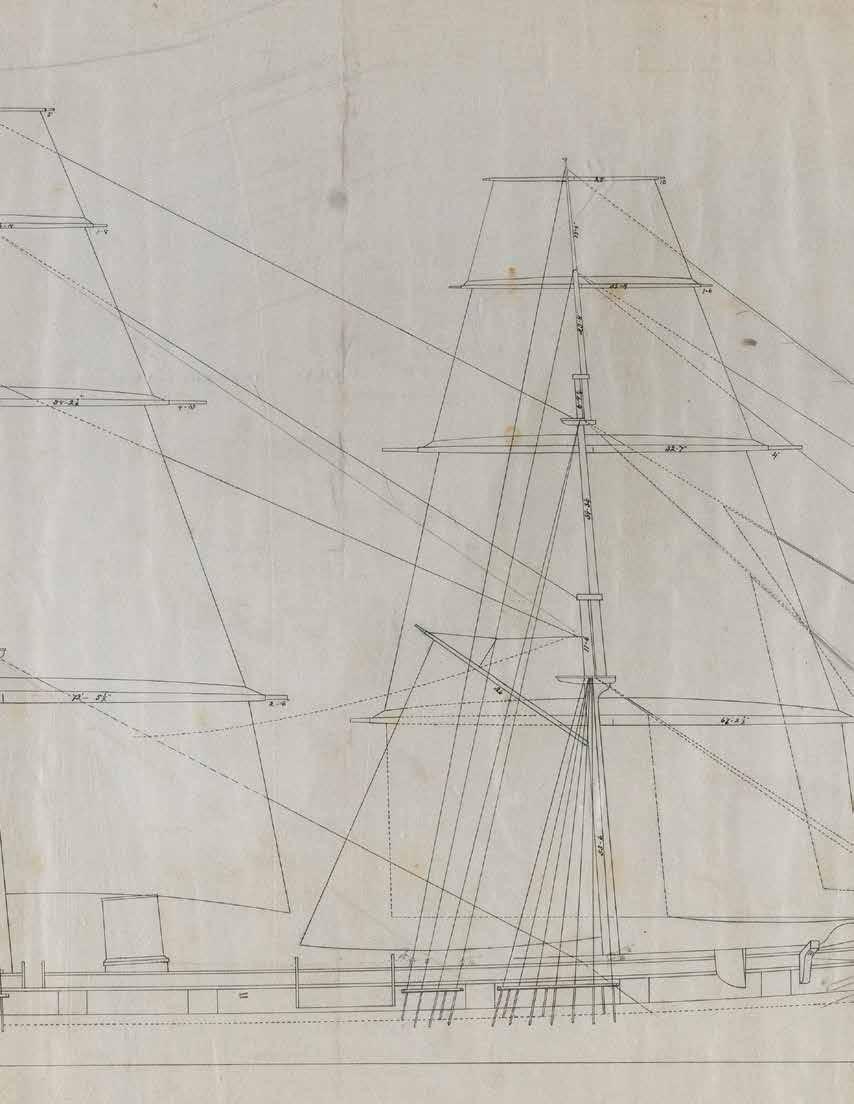
Front Cover: 4693
Rear Cover: 4820, 4190, 4603, 4119
Page 3: 4549
Page 5: 4095
Pages 6-7: 4558
Page 8: 4286
Page 114: 4540
This Page: 4745